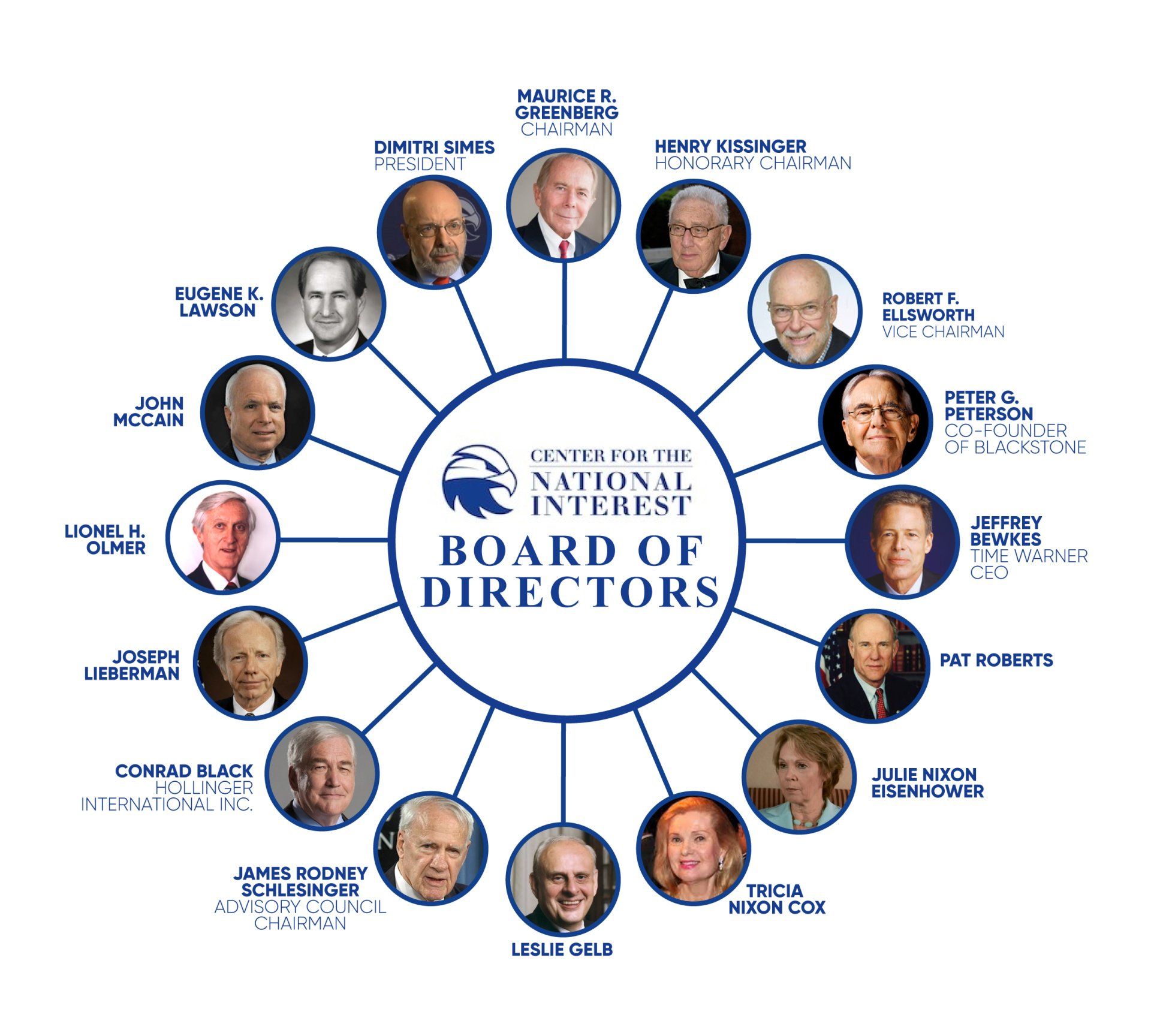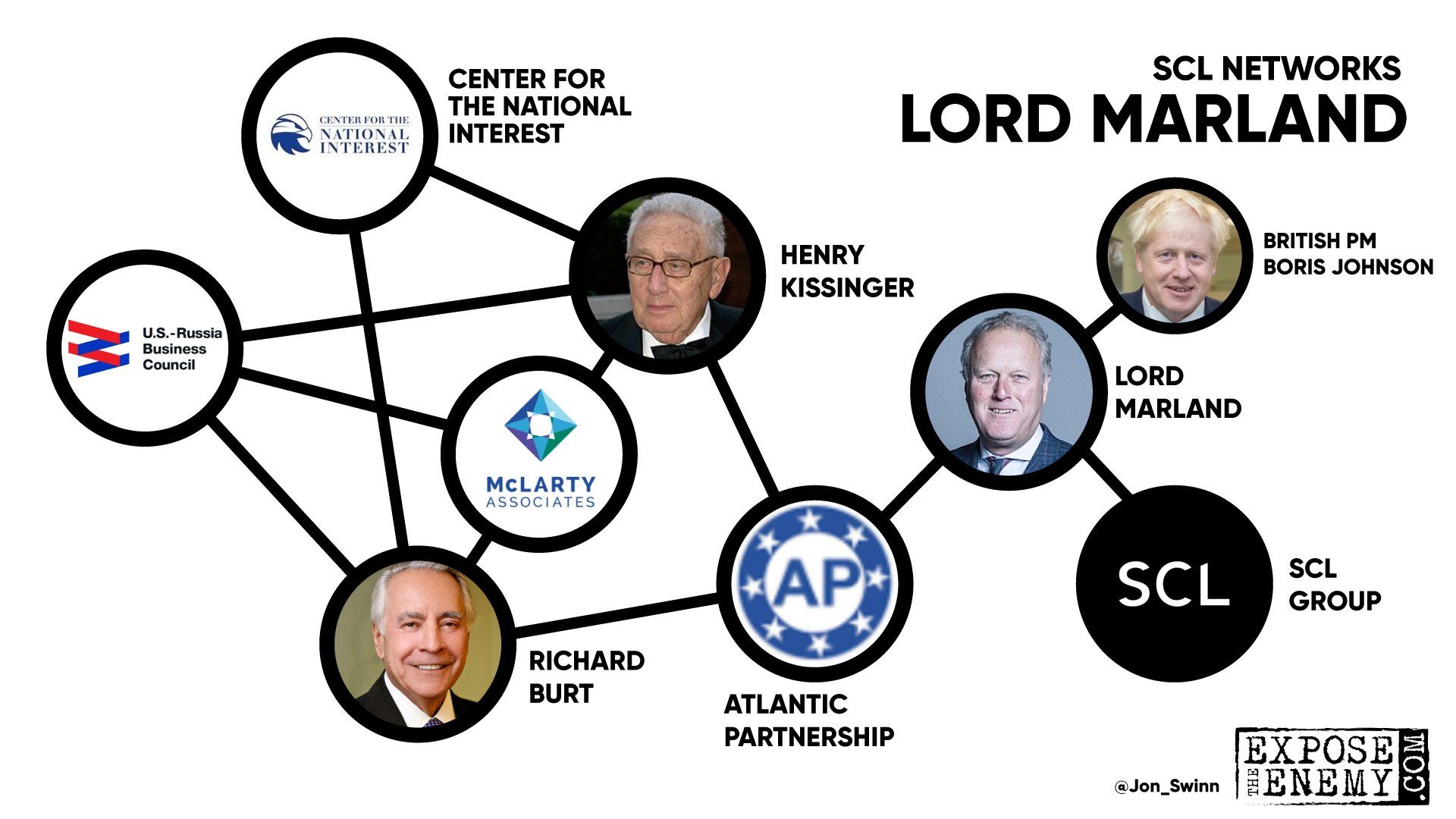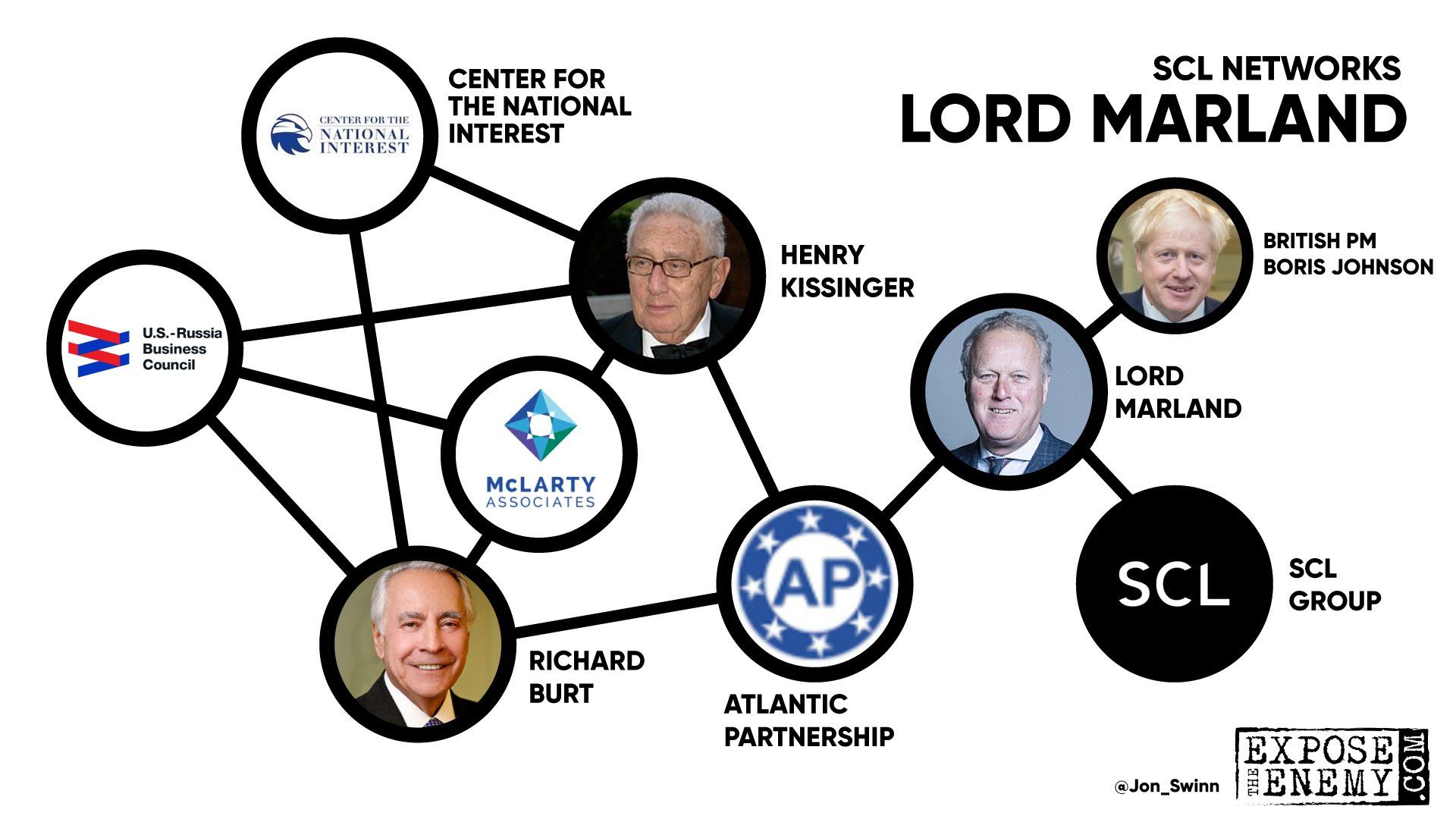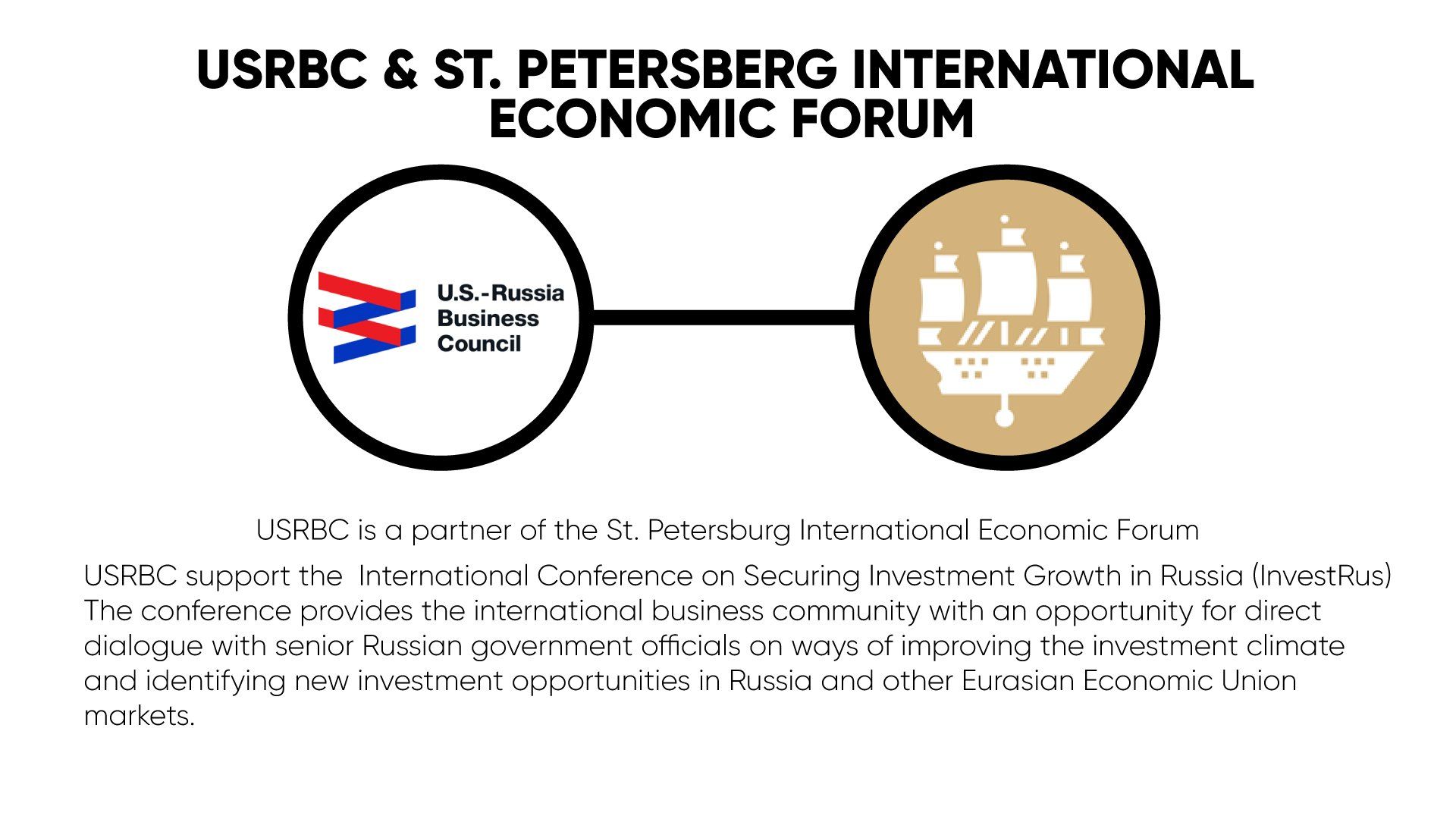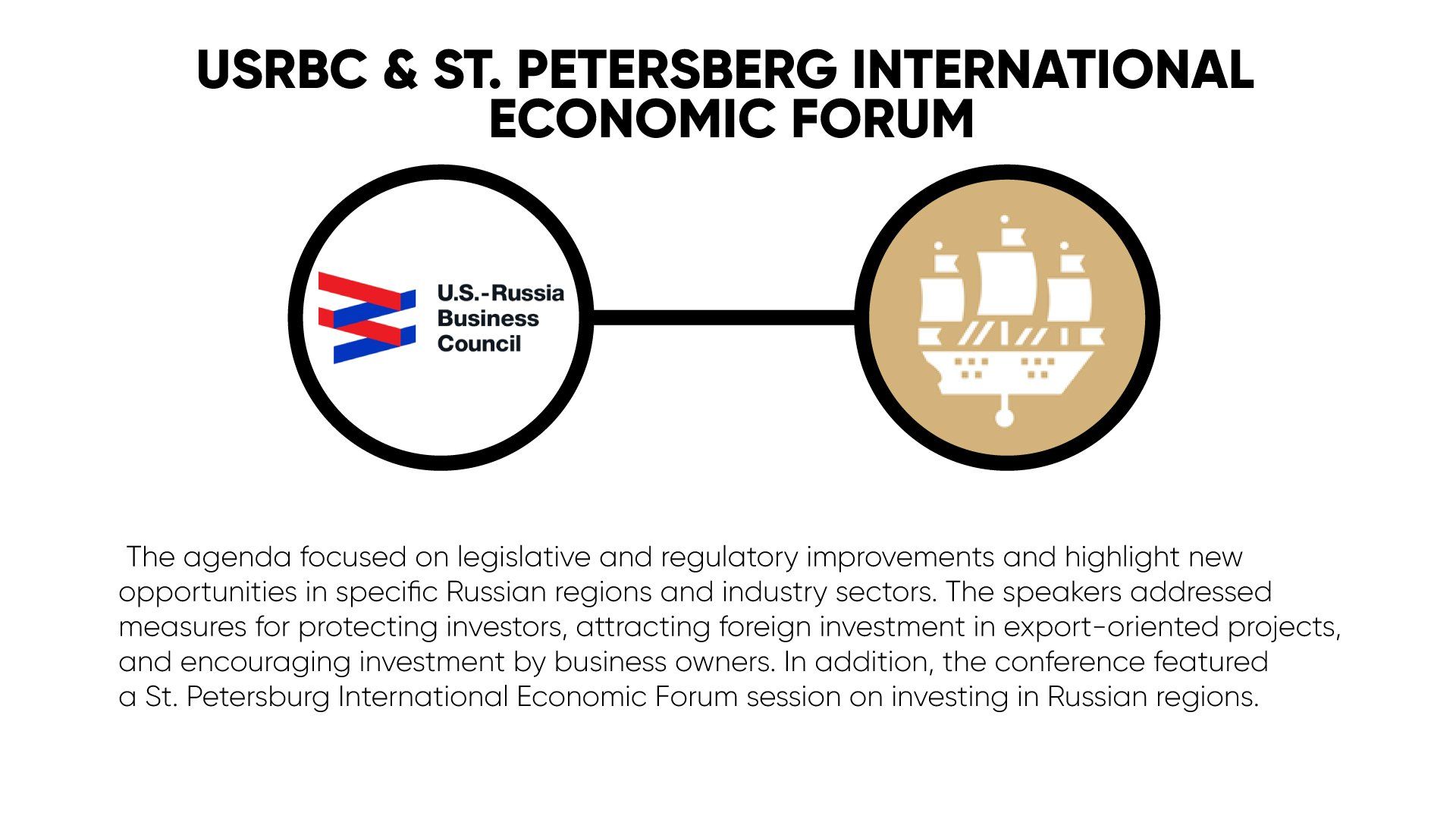THE CENTER FOR THE NATIONAL INTEREST
T'he Center for the National Interest was originally named The Nixon Center. It was created and announced by President Richard M. Nixon "on January 20, 1994, the 25th anniversary of his first inauguration and just three months before his death in April of that year. While genuinely non-partisan, as reflected in the composition of its Board of Directors and Advisory Council, the Center has a philosophy of an enlightened pursuit of national interest. The specific goal of the Center is to explore ways of enhancing American security and prosperity while taking into account the legitimate perspectives of other nations. With the end of the Cold War, the U.S. found itself without a clear-cut foreign policy direction. It is the Center's objective to work on developing new guiding principles for United States global engagement in a dramatically new international environment, the principles which would combine hard-headed pragmatism and fundamental American values."
"Located in Washington, DC, The Nixon Center is a non-partisan institution and operates as a substantively and programmatically independent division of The Richard Nixon Library & Birthplace Foundation. The Center is funded through a combination of corporate and individual donations in addition to foundation grants."
"The Nixon Center has four main programs: National Security Studies, Chinese Studies, U.S.-Russia Relations, and Regional Strategy (Middle East, Caspian Basin, and South Asia). In addition to conducting research into contemporary foreign policy issues, Center program directors also organize an array of conferences, briefings, seminars, lectures, and other events designed to advance U.S. foreign policy debates on crucial political, economic, and security issues. These events are frequently broadcast on C-SPAN and articles by Center analysts appear regularly in major publications."
Our Take
The Center for the National Interest / Nixon Center was created as an extension of the major establishment think tanks and lobbyists. CNI's board is occupied by some of the most powerful and well connected people in the world. CNI exists as a tool to maintain the representatives geopolitical and narrative control by placing special focus on the next phase of oligarchical societal control worldwide. The Cold War period was used to create a gigantic military industrial complex via huge defense budgets. This produced technology the oligarchy needed to continue their end goal of global domination.
Another key to creating the first Cold War was the exaggerated threat and capabilities of the USSR. This was done though the major industrialist backed think tanks that CNI is a product of (CFR, RAND Corporation Rockefeller Foundation etc.) All the while, Henry Kissinger had a back-channel to the Russian leadership throughout the Cold War.
. Today, Kissinger Associates is a lobbyist for the multinational corporations connected to the CNI, where he is the Honorary Chairman. At the same time, Kissinger Associates belong to the U.S.–Russia Business Council (USRBC). This essentially places Russian US lobbying contracts in the hands of Kissinger Associates. Richard Burt works for Kissinger Associates, is a board member of CNI and a director of the US-Russia Business Council.
U.S.–Russia Business Council (USRBC) is a trade association that represents the interests of 300 member companies with operations in the Russian market. The Council’s mission is to expand the U.S.-Russian commercial relationship and control it through the 300 members who include Alfa-Bank, Boeing, Cargill, Citigroup, Coca-Cola, Ford, Gazprombank, LUKOIL, Procter & Gamble, and other leading businesses, banks, law firms, accounting firms and organizations.
U.S.–Russia Business Council (USRBC) is listed second on the list of regional partners of the St. Petersburg International Economic Forum. The Forum is the Russian version of Davos (World Economic Forum) which is also heavily tied to Kissinger Associates, as Henry Kissinger himself is their Co-Chairman. St. Petersburg International Economic Forum plays a huge part in the networking, planning and development of Eurasia.
Eurasia and the Belt and Road Initiative
The next part of the plan is to develop infrastructure to control the Eurasian landmass. The key infrastructure plan for this is known as the Belt and Road Initiative. It is being carried out by the oligarchs model for the world, The People's Republic of China. The Center for the National Interest / Nixon Center and other linked think tanks such as East-West Institute and Eurasian Center have played a key role in these agendas as well as the major high tech and military industrial complex corporations and nations such as Israel have transferred major high technology to China in order to build this ambitious high technology driven project. Not to mention the Chinese state's own espionage. This along with the EAEU (Eurasian Economic Union) and ASEAN (Association of Southeast Asian Nations) free trade zones a lot of the groundwork is complete.
BOARD OF DIRECTORS
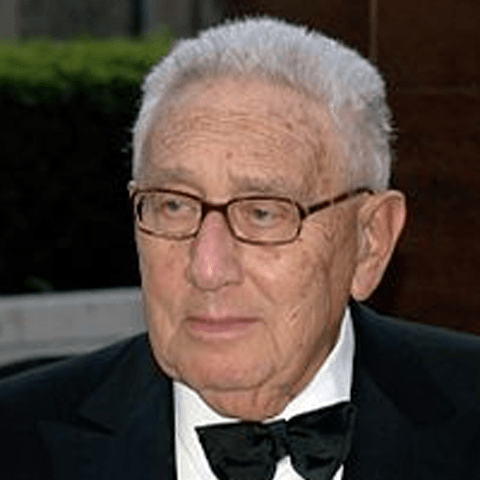
HENRY KISSINGER
HONORARY CHAIRMAN
Political scientist, diplomat, and geopolitical consultant who served as United States Secretary of State and National Security Advisor under the presidential administrations of Richard Nixon and Gerald Ford.
Kissinger has been labeled a conservative "realist" but can be considered a "neo-con" (neo-conservative).
A practitioner of Realpolitik, Kissinger played a prominent role in United States foreign policy between 1969 and 1977. During this period, he pioneered the policy of détente with the Soviet Union, orchestrated the opening of relations with the People's Republic of China, engaged in what became known as shuttle diplomacy in the Middle East to end the Yom Kippur War, and negotiated the Paris Peace Accords, ending American involvement in the Vietnam War. Kissinger has also been associated with such controversial policies as U.S. involvement in the 1973 Chilean military coup, a "green light" to Argentina's military junta for their Dirty War, and U.S. support for Pakistan during the Bangladesh War despite the genocide being perpetrated by his allies. After leaving government, he formed Kissinger Associates, an international geopolitical consulting firm. Kissinger has written over one dozen books on diplomatic history and international relations.
Kissinger remains widely regarded as a controversial figure in American politics, and has been condemned as a war criminal by journalists, political activists, and human rights lawyers. According to a 2014 survey by Foreign Policy magazine 32.21% of "America's top International Relations scholars" considered Henry Kissinger the most effective U.S. Secretary of State since 1965.
Kissinger remained at Harvard as a member of the faculty in the Department of Government and, with Robert R. Bowie, co-founded the Center for International Affairs in 1958 where he served as associate director. In 1955, he was a consultant to the National Security Council's Operations Coordinating Board. During 1955 and 1956, he was also study director in nuclear weapons and foreign policy at the Council on Foreign Relations. He released his book Nuclear Weapons and Foreign Policy the following year. From 1956 to 1958 he worked for the Rockefeller Brothers Fund as director of its Special Studies Project. He was director of the Harvard Defense Studies Program between 1958 and 1971. He was also director of the Harvard International Seminar between 1951 and 1971. Outside of academia, he served as a consultant to several government agencies and think tanks, including the Operations Research Office, the Arms Control and Disarmament Agency, Department of State, and the RAND Corporation.
Keen to have a greater influence on U.S. foreign policy, Kissinger became foreign policy advisor to the presidential campaigns of Nelson Rockefeller, supporting his bids for the Republican nomination in 1960, 1964, and 1968. After Richard Nixon became president in 1968, Kissinger was appointed as National Security Advisor.
Advised Trump
In December 2016, Kissinger advised then President-elect Donald Trump to accept "Crimea as a part of Russia" in an attempt to secure a rapprochement between the United States and Russia, whose relations soured as a result of the Crimean crisis.
When asked if he explicitly considered Russia's sovereignty over Crimea legitimate, Kissinger answered in the affirmative, reversing the position he took in his Washington Post op-ed.
Business Affiliations
Principal, Trireme Partners LP
Chairman, Kissinger Associates, Inc., international consulting firm
Chairman, International Advisory Board, American International Group, Inc.
Director Emeritus, Freeport-McMoRan Copper and Gold Inc. (since 1995)
Director, ContiGroup Companies, Inc.
Director, Continental Grain Company
Director, FirstMark Communications International LLC
Director, Hollinger International Inc.
Director, The Revlon Group
Advisory Board, JP Morgan Chase & Co. International Council
Advisor to Board of Directors, American Express Company
Advisor to Board of Directors, Forstmann Little and Co.
Ties to the Carlyle Group through Lobbyist David M. Marchick, senior adviser to Kissinger McLarty Associates
In May 2002, Kissinger joined the private investment firm Hicks, Muse, Tate & Furst's Europe Strategy Board.
Non-Commercial Affiliations / Organizations
Honorary Governor, Foreign Policy Association
Honorary Chairman, American Academy in Berlin
Honorary Director, Friends of Dresden
Honorary Member, International Olympic Committee and Public Sector Member, United States Olympic Committee
Patron and Chairman of the Advisory Board, The New Atlantic Initiative
Patron, Atlantic Partnership
Chancellor, The College of William and Mary
Chairman, Eisenhower Exchange Fellowships
Director, Center for Democracy/Center for Democracy
Director, Dan David Prize
Director, International Rescue Committee
Advisory Board, Children's Scholarship Fund
Advisory Board, Puppies Behind Bars (with wife, Nancy Kissinger)
Counselor/Trustee, Center for Strategic and International Studies
Trustee, Institute of International Education
Honorary Trustee, Aspen Institute
Trustee, Open Russia Foundation
Trustee, Institute of International Education (IIE)
Trustee and Counselor, Center for Strategic and International Studies
Member, Honorary Council of Advisors at the US-Azerbaijan Chamber of Commerce
Member and Trustee Emeritus, Metropolitan Museum of Art
Reputed Member, Committee of 300
Reputed Member, Trilateral Commission
Reputed Member, Bilderberg Group
Board of Overseers, International Rescue Committee
International Board of Governors, Peres Center for Peace
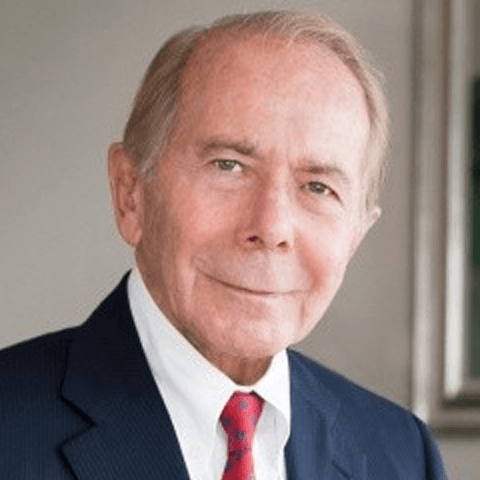
MAURICE 'HANK' GREENBERG
CHAIRMAN
Former chairman and CEO of American International Group (AIG) which was the world's 18th largest public company and the largest insurance and financial services corporation in history.
He was also vice chairman and director of the Council on Foreign Relations and a member of David Rockefeller's Trilateral Commission. He was awarded "CEO of the Year 2003" by Chief Executive Magazine.
Greenberg was born to a Jewish family in New York City. He received his law degree from New York Law School in 1950. He was admitted to the New York Bar in 1953. He holds honorary degrees from several colleges including Brown University, Middlebury College, New York Law School and The Rockefeller University.
He is a trustee emeritus of the Rockefeller University, and is an honorary trustee of the Museum of Modern Art and trustee of the Asia Society, all three institutions founded by the Rockefeller family.
He has served on the board of directors of the New York Stock Exchange, the President's Advisory Committee for Trade Policy and Negotiations, and the Business Roundtable. He was a director of the Federal Reserve Bank of New York from 1988-1995 and served as its Chairman from 1994-5.
Greenberg is a social friend and was a client of Henry Kissinger. In 1987 he appointed Kissinger as chairman of AIG's International Advisory Board.
Kroll Associates
In 1993, Maurice Greenberg's AIG, became co-owner of the "private spy agency", Kroll Associates, as a result of rescuing Kroll from bankruptcy with a cash infusion.
Kroll was notorious during the 1980s as the "CIA of Wall Street" due to the prevalence of former CIA, FBI, Scotland Yard, British secret service and British Special Air Service men Kroll employed for corporate espionage in takeover bids, as well as for destabilization of foreign nations.
9/11
Kroll oversaw the security of the Twin Towers on 9/11. The first plane that struck the World Trade Center homed in on a secure computer room in the northeast section of the North Tower. The plane went directly into the computer room of a company named Marsh & McLennan that was run by Greenberg's son, Jeffrey.
Putin
In 2003, Vladimir Putin pursued an economic agenda for Russia to begin normalized trade relations with the West which included the repeal of the Jackson–Vanik amendment. Putin tried to use his relationship with Hank Greenberg to repeal the Jackson-Vannik provisions in the United States. Putin wanted Greenberg to support through American Insurance Group greater development of the nascent Russian home-mortgage market.
Russia and Maria Butina
In June 2008, Greenberg’s Starr Russia Investments III bought 20 percent of Investtorgbank, a Russian bank. Banki.ru reported that the fund Greenberg headed paid about $100 million for its share of the bank. In August 2009, Starr invested an additional $8 million in the bank, according to court filings in the state of New York.
In December 2014, according to court filings, the Russian Central Bank started auditing the bank’s books. Lawyers for Starr say Gudkov and others in the bank engaged in egregious self-dealing, frittering away tens of millions of dollars. The Russian government auditors concluded that by the end of 2014, the bank was insolvent.
In April 2015, while that audit was still underway, Butina and Alexander Torshin—a Russian Central Bank official later accused of money laundering and sanctioned by the U.S. government—attended a private discussion of Russia’s financial situation at the Center for the National Interest, according to Reuters. Greenberg participated in the meeting.
The 29-year-old Russian national also braced Greenberg, pushing him to increase his investments in his bank in Moscow—a bank that was also facing financial collapse.
Asia
Maurice Greenberg was deeply involved in trade with China in the 80s, where Henry Kissinger was one of his representatives.
Greenberg became very close to Shaul Eisenberg, the leader of the Asian section of the Israeli intelligence service Mossad, and agent for the sales of sophisticated military equipment to the Chinese military.
Greenberg is chairman emeritus of the US-ASEAN Business Council.
In 1990 Greenberg was appointed by Zhu Rongji, then Mayor of Shanghai, to be the first chairman of the International Business Leaders' Advisory Council for the Mayor of Shanghai. In 1994 Greenberg was appointed senior economic advisor to the Beijing municipal government. He was awarded "Honorary Citizen of Shanghai" in 1997. He is a member of the advisory board of the Tsinghua School of Economics and Management, a member of the International Advisory Council of the China Development Research Foundation and China Development Bank.
Greenberg was appointed as a member of the Hong Kong Chief Executive's Council of International Advisers where he served from 1998 to 2005. He is also a former chairman and current member of the US–Korea Business Council and a member of the US–China Business Council. He is vice-chairman of the board of directors of the National Committee on United States – China Relations. He is a former chairman and current trustee of the Asia Society.
In 1990 Greenberg was appointed by Zhu Rongji, then Mayor of Shanghai, to be the first chairman of the International Business Leaders' Advisory Council for the Mayor of Shanghai. In 1994 Greenberg was appointed senior economic advisor to the Beijing municipal government. He was awarded "Honorary Citizen of Shanghai" in 1997. He is a member of the advisory board of the Tsinghua School of Economics and Management, a member of the International Advisory Council of the China Development Research Foundation and China Development Bank.
Greenberg was appointed as a member of the Hong Kong Chief Executive's Council of International Advisers where he served from 1998 to 2005. He is also a former chairman and current member of the US–Korea Business Council and a member of the US–China Business Council. He is vice-chairman of the board of directors of the National Committee on United States – China Relations. He is a former chairman and current trustee of the Asia Society.
Bailout
AIG was a central player in the financial crisis of 2008. It was bailed out by the federal government for $180 billion, and the government stepped up to prop up, take control and absorbed the losses. The Financial Crisis Inquiry Commission (FCIC) of the US government concluded AIG failed primarily because it sold massive amounts of insurance without hedging its investment. Its enormous sales of credit default swaps were "made without putting up initial collateral, setting aside capital reserves, or hedging its exposure—a profound failure in corporate governance, particularly its risk-management practices". AIG took risks with unregulated hedge fund products while using cash from people's insurance policies. This created a 'too big to fail' blueprint.
This was possibly the biggest financial scam in history. The criminal and fraudulent financial/insurance structure was built and operated by Maurice Greenberg.
At the time of AIG's woes, Greenberg wanted little to do with the company when it was short $180 billion. The government bailout wasn't good enough for Greenberg thou, unbelievably he filed suit, arguing that the terms of the bailout were too tough and ungratefully complained that the government should have given AIG unlimited cash on easier terms.
Elliot Spitzer
In October 2004, then New York Attorney General Elliot Spitzer filed a lawsuiit against Marsh & McLennan, accusing the company of having, for years, colluded with big insurance companies to "cheat customers in an elaborate charade of price fixing and bid rigging".
The three insurers he named were the giants American International Group, Zurich America Insurance Company and Ace Ltd. Adding spice to the story was the relationship between them: AIG was headed by the 79-year-old insurance industry legend Maurice "Hank" Greenberg; his son Jeffrey ran Marsh & McLennan, and; another son, Evan, was boss of Ace.
Spitzer claimed that Marsh & McLennan jacked up insurance premiums - thus increasing its commissions, and the profits of the insurers - with "fake bids, collusion, improper steering of business, payments by insurers to avoid solicitation of competing of competing quotes, and threats against those resisting participation in the fraudulent schemes".
The company "acted, in short, less like a broker with a fiduciary obligation to its clients than as the linchpin of a racket", Spitzer said.
Marsh & McLennan's shares tumbled more than 25 per cent, despite pledging it was "committed to getting all the facts, determining any incidence of improper behaviour and dealing appropriately with any wrongdoing".
Jeffrey Greenberg was forced to resign. His replacement was a man the company had inherited a few months earlier when it took over Kroll Inc, Michael Cherkasky, who was uniquely placed to steer the company through the scandal which threatened to destroy it.
For 16 years, Cherkasky was a white-collar crime buster for the New York District Attorney's office; Spitzer, now prosecuting Marsh & McLennan, was his protege. In 1994, Cherkasky joined Kroll - gamekeeper become poacher - working his way up to the chief executive's office.
Within three months, Cherkasky had overseen a clean-out of Marsh & McLennan's board, and the sacking of most of the executives deemed accountable for the corruption. He persuaded Spitzer to drop the civil charges against the company by pledging to pay $US850 million to clients around the world - including Australia - that Marsh & McLennan had defrauded.
Criminal charges are still pending against 10 former executives of Marsh & McLennan and the insurance companies. In February, Kathryn Winter, the 50-year-old managing director of Marsh Inc, pleaded guilty to fraud in the Manhattan State Superior Court. She faces up to four years' jail, depending on how keenly she co-operates with Spitzer's investigators.
Cherkasky personally apologised to 120 of his biggest clients, and showed thousands of staff the door in a bid to restore the ailing giant to profitability.
He is now engaged on an even greater challenge - to convince outraged clients who had been deserting the company in droves, that Marsh & McLennan is serious about its reforms
Bush Connection
"Greenberg is well-known in Washington where he known for raising large amounts of money. Greenberg was one of the President Bush's 'Rangers' which means he personally raked in more than $200,000 for the reelection campaign. At the same time, he is also known for his access to members of the cabinet and Congress. This access has paid-off as the administration has often supported Greenberg on a number of issues ranging from access to China to terrorism insurance," Ron Scherer reported in the April 1, 2005, Christian Science Monitor.
Affiliations
Chairman, Nixon Center
"Greenberg and AIG have further expanded their reach through the use of the $5 billion Starr Foundation, named after the founder of the company Cornelius Vander Starr. It supports influential groups such as the Council on Foreign Relations and the National Chamber Foundation, associated with the US Chamber of Commerce," Sherer wrote.
Patron of the American Australian Association
Director, Business Executives for National Security
Director, Foreign Policy Association (in 2001/02 at least)
Director, Japan Society
Director, US China Business Council
Director, World Trade Center Memorial Foundation
Board of Overseers, International Rescue Committee
Member, National Coalition on Asia and International Education in the Schools
Emeriti Trustee, Rockefeller University
Life Trustee, New York University
International Advisory Board, International Economic Alliance
Honorary Trustee, Museum of Modern Art
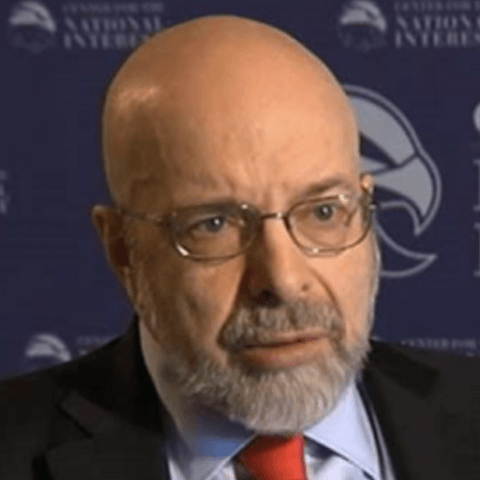
DIMITRI SIMES
PRESIDENT UNTIL 2022
Simes was selected to lead the Center by President Richard M. Nixon, to whom he served as an informal foreign policy advisor and with whom he traveled four times to Russia and other former Soviet states as well as Western and Central Europe. Mr. Simes is also the Publisher and co-Publisher of The National Interest.
Before the establishment of the Center, Mr. Simes served as Chairman of the Center for Russian and Eurasian Programs at the Carnegie Endowment for International Peace, where he was also a Senior Associate. Earlier, he was the Director of the Soviet and East European Research Program and a Research Professor of Soviet Studies at the Paul H. Nitze School of Advanced International Studies (SAIS) at Johns Hopkins University. Prior to his work at SAIS, Mr. Simes was a Senior Research Fellow and subsequently the Director of Soviet Studies at the Center for Strategic and International Studies. In addition to teaching at SAIS, Mr. Simes taught at the University of California at Berkeley and Columbia University.
Simes was born in Moscow and graduated from the School of History of Moscow State University. From 1967 to 1972, he was a research assistant and later a research associate at the Institute of World Economy and International Affairs (also in Moscow), an influential foreign policy think tank in the Soviet Union at that time.
Mr. Simes' most recent book is After the Collapse: Russia Seeks its Place as a Great Power (Simon & Schuster, 1999). He has also authored and co-authored two additional books, Détente and Conflict: Soviet Foreign Policy 1972-1977 and Soviet Succession: Leadership in Transition. He frequently writes for newspapers and journals as well; his articles have appeared in The New York Times, The Washington Post, The Los Angeles Times, Foreign Affairs, Foreign Policy and several other prominent publications. He has served as a consultant to CBS and NBC.
According to Russian-American historian Yuri Felshtinsky, the Center for the National Interest and it’s journal created in the USA by Soviet-born Dmitri Simes serves the interests of the Kremlin and Simes himself. Felshtinsky wrote about Simes’ specific activities, his influence on American politics and his connections with top-level officials in Russia and in the USA.
"A routine investigation revealed that Jeff Sessions, US Attorney General, forgot to mention in his application for security clearance one of the meetings with the Russian Embssador Sergei Kislyak. But it was not an ordinary meeting. […] It so happens that in the same four-dimensional point of place and time, the world trajectories of several other noteworthy individuals had crossed – namely, of Paul Manafort, Carter Paige, Michael Flynn, Jared Kushner, Donald Trump, and – finally – the main person who became a friend and a leader of this jolly group from then on – Dimitri Konstantinovich Simis, a former Deputy Secretary of the Komsomol Organization [All-Union Leninist Young Communist League] at the Institute of World Economy and International Relations and an international lecturer at the Moscow City Committee of the Communist Party of the Soviet Union, who, while still in that role, suddenly applied for US asylum in 1972. During his many wandering years away from the Motherland, Dimitri Konstantinovich had morphed into Dimitri Simes, a President and CEO of The Center for the National Interest.
On April 27 (2016), the conference center at The Mayflower Hotel was leased by CNI for an important event – one of the Presidential candidates, namely, the Republican Party’s nominee Donald Trump, was going to reveal his foreign policy platform. Before the speech, the gracious host introduced two of his guests – Trump and Kislyak. […] Thus, the real chief of the ‘Trump Is Ours’ operation was Simes, and not Kislyak." (As publisher of The National Interest, Simes was involved in arranging Donald Trump's April 27, 2016, speech at the Mayflower Hotel.)
Mass media in the US began paying more and more attention to this event. "Sessions says that he met with Kislyak last summer in his capacity as a member of the Senate Armed Forces Committee, but the record casts doubt on that claim. […] According to The Atlantic, Sessions also met frequently with Dimitri Simes, an expert on Russia, and at least one lobbyist with Russian clients, Richard Burt", – noted one of the publications. "Trump took a hands-off position on the Republican National Committee’s platform fights last summer — except when it came to how to deal with Russian aggression in Ukraine. In that case, Trump campaign leaders ‘orchestrated a set of events’ to nix a platform proposal calling for the U.S. to provide ‘lethal defensive weapons’ to combat Russia-backed rebels, and wrote the softer replacement language ultimately sent to the convention floor, despite it being "at odds with almost all the party’s national security leaders."
Simes’s questionable connections were also noted. In his article titled "Donald Trump’s Russia connections: Realists with Moscow Ties Are Lining Up Behind Republican Frontrunner" published on April 27, 2016, James Kirchick observed that "The Center for the National Interest, former Nixon Center, a hosting institution for Trump’s first foreign policy speech and the adviser who helped writing the speech have multiple long-term ties to the Kremlin."
Butina
In September 2018, historian Yuri Felshtinsky published an article about Simes' past encounters with unregistered Russian agent Maria Butina. Simes' name has appeared 100 times in U.S. Special Counsel Robert Mueller report about Russian interference in the 2016 United States elections.
Fleeing to Russia
Simes stepped down from his position at the Center for the National Interest in 2022 and fled to Russia in October of that year Since then, he serves as a moderator of the Moscow-based political program The Great Game on Channel One Russia together with Vyacheslav Nikonov.
Institute for Democracy and Cooperation
"In 2005 two English-language Russian sources, a Russian-American newspaper Kommersant and Moscow Times reported that “Simes had met with the Kremlin adviser Gleb Pavlovsky and Russian oligarch Oleg Deripaska — Putin’s close ally, a man on FBI organized crime list and Paul Manafort’s former business partner” — to discuss forming a Russian-funded think tank.
Simes said the Nixon Center, a conservative think tank, had paid for Pavlovsky and several other Russian political analysts to visit Washington in November for a research project on American influence in former Soviet republics. But he said he had not discussed plans for a Russian-funded think tank with them or with Deripaska.
"There's clearly a background for this think tank idea," Simes said, citing plans for Russia Today. "A 24-hour, English-language news channel funded by the Kremlin" [and launched in 2005].
Pavlovsky could not confirm when the think tank might be set up, saying discussions were ongoing.
"The think tank that resulted was most likely the Institute for Democracy and Cooperation (IDC)," – was noted later by another US publication. A Kremlin-backed think tank, the Institute for Democracy and Cooperation (IDC), was formed in New York in 2008 under Putin adviser Andranik Migranyan. Migranyan was selected to run the IDC by Russian Foreign Minister Sergey Lavrov, according to a confidential State Department cable released by WikiLeaks.
Valdai International Discussion
"In 2013, – according to Zabrisky
– Simes attended Valdai International Discussion Club alongside Putin, where both took part in a two-hour panel discussion. Other participants were Germany’s former defense minister and prime ministers of France and Italy — so Simes’s presence raised some eyebrows. Putin meets Valdai Club’s participants every year since 2004. Among many other Kremlin officials attending Valdai meetings are Dmitry Medvedev, Prime Minister; Sergei Ivanov, Chief of Staff of the Presidential Executive Office; Sergei Lavrov, Minister of Foreign Affairs; Sergei Shoigu, Defense Minister and more. However, the meetings are also attended by the Russian oligarchs and figures strategically important to the Kremlin."
Politico noted: "A conference formerly attended by respected Western Russia watchers but which has, since the Crimean annexation, fallen into disrepute and is now frequented almost exclusively by Putin apologists. At Valdai, Putin referred to Simes as his ‘American friend and colleague’ and Simes stated ‘I fully support President Putin’s tough stance" [on Syria]’."
One of the publications even described the two structures, putting Valdai Club at the center of one, and the Simes’s structure – at the center of another.
A year earlier, on March 2, 2017, CNI formally responded to the mass media’s query that "Mr. Simes introduced Mr. Kislyak to Mr. Trump in a receiving line last April at a foreign policy speech hosted by his Сenter at the Mayflower Hotel in Washington. Mr. Kislyak was one of four ambassadors who sat in the front row for Mr. Trump’s speech at the invitation of the Сenter. Mr. Simes noted that Mr. Sessions, then a senator from Alabama, was there, but he did not notice whether he and the ambassador spoke at that time."
Nevertheless, Kushner took it upon himself to address the matter on July 26, 2017, and to protect Simes (one could speculate that he would not have done so without receving Trump’s blessing). In his testimony to the Congressional Committee, Kushner confused the investigation by stating that the meeting at The Mayflower Hotel and Trump’s speech were exclusively his (and not Simes’s) idea.
Rand Paul
Sen. Rand Paul (R., Ky.) has named as one of his key foreign policy advisers a controversial Russia policy expert with deep ties to the Kremlin. Dimitri Simes, the president of the Center for the National Interest, and Ambassador Richard Burt, a member of the Center’s board of directors, are recent additions to Paul’s foreign policy advisory team, the senator told National Journal earlier this year. For years, Simes and the center have provided a sympathetic platform for the Russian government in the heart of the D.C. policy establishment. Its ties to Moscow extend throughout the organization.
FBI Raid
In August 2024, FBI agents raided and searched Simes' house in Virginia. Simes, who has been in Russia since October 2022, stated that he was "puzzled and concerned" in a declaration to a local newspaper. According to The New York Times, Simes is under investigation by the US Department of Justice for, "among other crimes, violations of the International Emergency Economic Powers Act, the legal foundation for imposing economic sanctions." The raid is part of a wider effort to combat Russian operations attempting to influence the 2024 US presidential election.
The United States charged Simes for working since June 2022 with Channel One Russia, a business sanctioned in 2022. He and his wife allegedly received over $1 million, plus a car and driver.
Charges
From at least in or around June 2022 through the present, Dimitri Simes, Anastasia Simes and others allegedly participated in a scheme to violate the International Emergency Economic Powers Act (IEEPA), by providing services to Channel One Russia, including by serving as a presenter and producer of programming, and by receiving over $1 million, a personal car and driver, a stipend for an apartment in Moscow, Russia, and a team of 10 employees from Channel One Russia following its designation by OFAC. The indictment alleges that Dimitri and Anastasia Simes also engaged in a scheme to commit money laundering, knowing the transactions were intended to conceal the proceeds of IEEPA violations.
Dimitri and Anastasia Simes maintain a home in Huntly, Virginia. They remain at large and are believed to be in Russia. They are each charged with one count of conspiracy to violate the IEEPA, one count of violating the IEEPA, and one count of conspiracy to commit international money laundering. If convicted, they face a maximum penalty of 20 years in prison for each count.
As alleged in the second indictment, Anastasia Simes further participated in a scheme to violate U.S. sanctions for the benefit of, and to receive funds from, sanctioned oligarch Aleksandr Yevgenyevich Udodov. Udodov was sanctioned by OFAC on Feb. 23, 2023 for operating or having operated in the management consulting sector of the Russian Federation economy. From at least in or around February 2023 through the present, Anastasia Simes and others allegedly participated in a scheme to violate IEEPA by purchasing art and antiques for the benefit of Udovov from galleries and auction houses in the United States and Europe, and having the items shipped to her residence in Huntly, Virginia, where they were stored for onward shipment to Russia. In return, Anastasia Simes was reimbursed and received a service fee. The indictment alleges that Anastasia Simes also engaged in a scheme to commit money laundering, knowing the transactions were intended to conceal the proceeds of IEEPA violations.
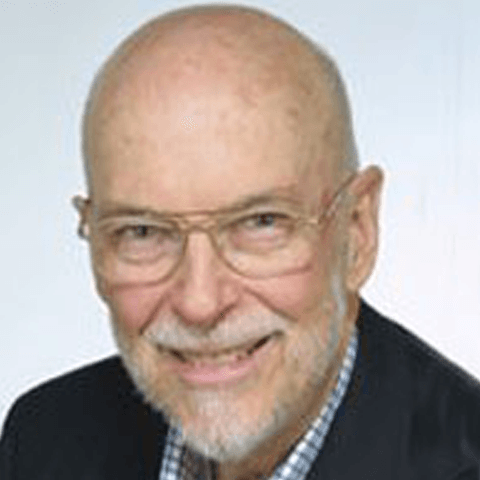
ROBERT F. ELLSWORTH
VICE CHAIRMAN
(June 11, 1926 – May 9, 2011) Chairman & Founding Director Hamilton BioVentures.
Ellsworth was an American legislator and diplomat. He served as the United States Permanent Representative to NATO (an ambassadorial level appointment) between 1969 and 1971. He had previously served three terms as a Republican Member of Congress from Kansas, from 1961 to 1967, and as an Assistant to the President during the presidency of Richard Nixon; under President Gerald Ford, he was Deputy Secretary of Defense.[2] Ellsworth also served as assistant to the chairman of the Federal Maritime Commission.[3]
Ellsworth was born in Lawrence, Kansas, and was educated in the public schools of that city. He served in the United States Navy during World War II and the Korean War. In 1945, he was graduated with a baccalaureate in engineering from the University of Kansas, where he had been a member of the Alpha Nu chapter of the Beta Theta Pi collegiate fraternity. He then studied law at the University of Michigan Law School, from which he was graduated in 1949; he practised law in Lawrence, Kansas, and in Springfield, Massachusetts.
On November 9, 2010, Ellsworth provided commentary to KFMB regarding an unexplained missile launch off the coast of Los Angeles. He cautioned the news crew to wait for definitive answers from the military, then went on to speculate, "It could be a test firing of an intercontinental ballistic missile from a submarine, an underwater submarine, to demonstrate, mainly to Asia, that we could do that.
The retired ambassador was admitted to the Order of Saint John as a knight of honor in 1995.
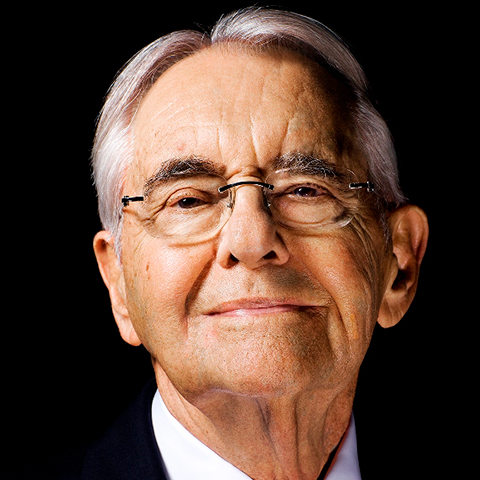
PETER G. PETERSON
CO-FOUNDER & CHAIRMAN BLACKSTONE GROUP
(June 5, 1926 – March 20, 2018) was an American investment banker who served as United States Secretary of Commerce from February 29, 1972, to February 1, 1973, under the Richard Nixon administration. Before serving as Secretary of Commerce, Peterson was chairman and CEO of Bell & Howell from 1963 to 1971. From 1973 to 1984 he was chairman and CEO of Lehman Brothers.
In 1985, he co-founded with Stephen A. Schwarzman the prominent private equity and investment management firm, the Blackstone Group, and was for many years its chairman. At Blackstone, he made a fortune including the $1.9 billion he received when it went public in 2007.
In 1969, he was invited by philanthropist John D. Rockefeller III, CFR Chairman John J. McCloy, and former Treasury Secretary Douglas Dillon to chair a Commission on Foundations and Private Philanthropy, which became known as the Peterson Commission. Among its recommendations adopted by the government were that foundations be required annually to disburse a minimum proportion of their funds.
Peterson was chairman of the Council on Foreign Relations until retiring in 2007, after being named chairman emeritus. In 2008, Peterson was ranked 149th on the "Forbes 400 Richest Americans" with a net worth of $2.8 billion. He was also known as founder and principal funder of the patronising Peter G. Peterson Foundation, which is dedicated to promoting fiscal sustainability (austerity). Peterson believes this is philanthropy. This is a classic example of the deceitful and hypocritical bigotry of a shameless Wall Street investment banker. Peterson used his wealth to underwrite numerous organizations and PR campaigns to generate public support for slashing Social Security, Medicare, and Medicaid, citing concerns over "unsustainable" federal budget deficits. Ironically, Peterson did not mention the bailing out of his 'too big to fail' Wall Street buddies and how they are responsible for the large deficit. Nor did he mention his Federal Reserve friends..
Fix The Debt
Through the Peter G. Peterson Foundation, Peterson has funded practically every think tank and non-profit that works on deficit- and debt-related issues, including his latest 2012 astroturf supergroup, "Fix the Debt.”
The Concord Coalition
The Concord Coalition, which was founded in 1992, lists Peterson as a co-founder on its website. The organization received $6,036,060 (including $1.5 million in matching funds) from the Peterson Foundation from 2009 to 2012. It specializes in taking the fiscal austerity message outside the Beltway with costly tours and town halls. In January of 2013, the Concord Coalition announced that it is partnering with Fix the Debt on a series of public forums. According to the Concord Coalition's website, "This joint project will focus its efforts on ten programs in six states: Colorado, New Hampshire, Iowa, Wisconsin, Florida and Tennessee." All of the states the programs are featured in, with the exception of Tennessee, were swing states in the 2012 presidential election. The first forum on January 29, 2013, featured Timothy Pagliara, founder of Enact the Plan, a group created explicitly to promote support for the Simpson-Bowles Commission.
"The Giving Pledge." Con
On August 4, 2010, it was announced that he had signed "The Giving Pledge." He was one of 40 billionaires, led by Bill Gates and Warren Buffett, who agreed to give at least half their wealth to charity. Most of his giving was to his own fake philanthropy, The Peter G. Peterson Foundation, If he was really so concerned about the deficit then maybe he should have requested his money went to pay off some of the deficit to his Federal Reserve buddies.
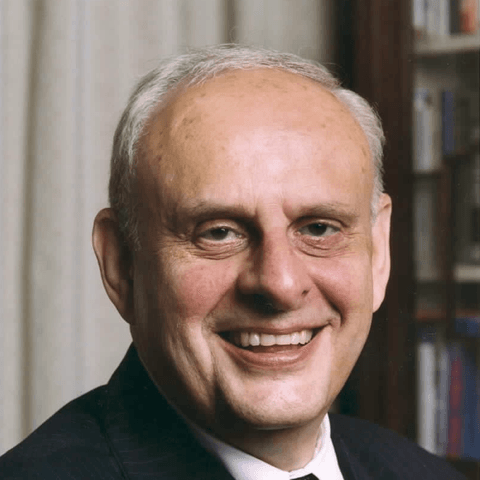
LESLIE H. GELB
PRESIDENT EMERITUS OF THE COUNCIL ON FOREIGN RELATIONS
Leslie H. Gelb is the current president emeritus of the Council on Foreign Relations. Gelb is associated with the Department of Defense and was director of the Pentagon Papers project (creation of the papers that were eventually leaked by Daniel Elsberg).
Gelb is also on the board of the Baker Institute for Public Policy and reportedly has ties to the intelligence community. Gelb's name has been linked with the Carnegie Endowment for International Peace. He is also a Commissioner with the U.S. Commission on National Security/21st Century / Hart-Rudman Commission and its National Security Study Group.
Experience
Gelb entered public life as an executive assistant to U.S. Senator Jacob K. Javits from 1966 to 1967. From there he became the director of policy planning and arms control for internation affairs at the U.S. Department of Defense from 1967 to 1969. From 1969 to 1973 he was both a visiting professor at Georgetown University and a senior fellow at the Brookings Institution. Gelb served as assistant secretary of state for political/military affairs for the U.S. State Department from 1977 to 1979. After working as a senior associate for the Carnegie Endowment for International Peace (1980-81,) he spent the next 12 years at The New York Times as a columnist, deputy editorial page editor, op-ed page editor, national security correspondent, and diplomatic correspondent.
Awards
Gelb has won the Pulitzer Prize in Explanatory Journalism (1985) and, prior to that, the APSA Woodrow Wilson Award for best book on international relations (1981).
Affiliations
Advisory Council, Global Kids
Advisory Board, Truman National Security Project
Advisory Board, Ploughshares Fund
Advisory Board, United Against Nuclear Iran
Advisory Board, Center for Preventive Action
Former Advisory Board Member (2004), Women's Foreign Policy Group
Editorial Advisory Board, Encyclopedia Britannica
Editorial Committee, Democracy: A Journal of Ideas
Honorary Director, VisionSpring
International Board of Governors, Peres Center for Peace
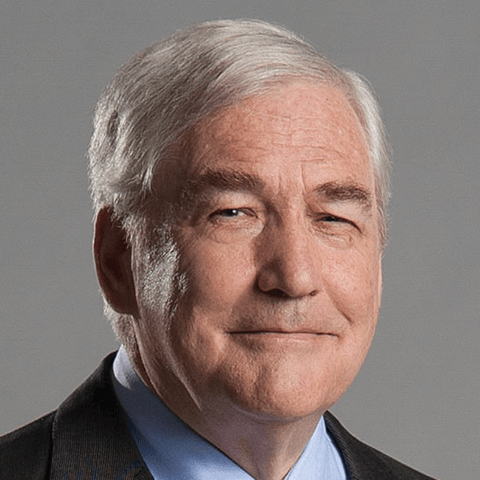
CONRAD BLACK
CHAIRMAN & CEO HOLLINGER INTERNATIONAL INC.
Conrad M. Black was Chairman of the Board of Directors and Chief Operating Officer of Hollinger International Inc..
He is married to far-right columnist and socialite Barbara Amiel.
In July 2007 Black was convicted by a Chicago jury of three counts of mail fraud and one count of obstruction of justice. In December 2007, Black was sentenced to 6 1/2 years in prison.
Connect to Les Wexner, who was a director of Hollinger International Inc. Wexner a hardcore Zionist is rumoured to have used Black as a front to acquire Jerusalem Post.
Following his fall from grace with Hollinger in late 2003, Christopher Grimes and John Lloyd wrote in the London Financial Times that Black was a more effective as a conservative political advocate than a businessman. "Yet Conrad Black's business ambitions probably always ran second to his urge to be an intellectual force of conservatism. He did not want to simply own newspapers. He wanted to use them to help to reshape the political culture of his native Canada, and to influence that of the United States, Britain and Israel", they wrote.
Matthew Fraser, the current editor-in-chief of Canada's National Post - a Hollinger publication - defends Black as having made a significant impact on Canadian policies. "He (Fraser) says its push for lower corporate taxes has made the issue 'legitimate'. Its criticism of the Canadian Broadcasting Corporation forced the public broadcaster to be less "biased and left-wing". And its support for the invasion of Iraq, free trade and general pro-Americanism have added much-needed debate," Grimes and Lloyd wrote. However, Black became known for taking over newspapers and restructuring the different departments, resulting in job losses.
He is known politically for his staunch criticism of the Liberal Party of Canada.
In 1999, the British Labour government decided to give Black a peerage. This resulted in strong opposition in Canada and particularly from Prime Minister Jean Chretien. The Nickle Resolution of 1919, ruled that foreign governments could not grant honours to Canadians that carry a title or privilege. Black challenged the ruling unsuccessfully in court. However Black gave up his Canadian citizenship and was subsequently inducted into the British House of Lords as Lord Black of Crossharbour on October 31, 2001.
Black as a Media Mogul
The National Post, was first published in late October 1998 to compete with The Globe and Mail, the Toronto Star and the Toronto Sun. On July 31, 2000 Hollinger sold a half of the National Post, 13 major Canadian newspapers, 126 community newspapers and internet sites to CanWest for $3.2 billion. Hollinger's reamining share was sold in the latter half of 2001.
Maude Barlow, the chair of the Council of Canadians, is cited by Leiterman stating Black is known to "routinely intervene in editorial policy-making".
Leiterman also cites Radler, Hollinger's president, as telling Maclean's (2/3/92): "If editors disagree with us they should disagree with us when they're no longer in our employ. The buck stops with ownership. I am responsible for meeting the payroll; therefore I will ultimately determine what the papers say and how they're going to be run."
Hollinger also owned the Jerusalem Post. John O'Sullivan, a friend of Black and the editor of the US journal, the National Interest, told the Financial Times in early 2004 that the Jerusalem Post "supports the policies of the right and broadcasts them to the world - something which people weren't used to, because it had always been the Israeli left which commanded the stage". (Later that year Hollinger sold the Jerusalem Post to the Israeli publisher Mirkaei Tikshore.
In September 2003 that newspaper advocated killing Yasser Arafat. This was quickly raised by the Israeli Cabinet, but described by Colin L. Powell, Condoleeza Rice as "unhelpful" and by The Economist as "wrong".
In 2002, Black was among the investors who contributed $20 million to start up The New York Sun.
In May 2004, Hollinger International, now free of Black's control, filed a $1.25 billion racketeering lawsuit against Black and other former corporate insiders, accusing them of pillaging the company of more than $400 million. In October, a judge dismissed the racketeering claims, and Hollinger refiled without them, adding Richard N. Perle as a defendant.
On November 15, 2004, the US Securities and Exchange Commission filed a civil fraud lawsuit against Black and Radler, alleging that they improperly diverted $85 million to their own use[8]. In March 2005, the US revealed that it was also conducting a criminal investigation of Black and Radler.
In November 2005 federal prosecutors charged Black with eight counts of mail and wire fraud and accused of diverting $51.8 million of Hollinger shareholders money to himself and associates. Black rejects the charges.
On March 30, 2006, Black lost his battle to keep important documents away from US prosecutors in his fraud trial. U.S. District Judge Amy St. Eve, denied Black's motion to quash a subpoena to access 13 boxes of documents that Black removed from his Toronto office after he was notified that he was being investigated by the US Securities and Exchange Commission (SEC). Incriminating evidence showed a security video tape showing Black loading the boxes into his limousine on May 20, 2005, which was only hours after he was served a request for documents by the SEC which was investigating allegation that Black and other executives looted Hollinger International Inc. of more than $80 million dollars.
Also on March 30, 2006, a report in the Globe and Mail claimed that the Internal Revenue Service wants banking records for a Barbados company that Black allegedly used to stash cash offshore. In 2004, a report from a special directors committee of Hollinger International alleged that Black used the Barbados company, Argent News Inc., "to avoid taxes on some of the millions he is accused of skimming when he was the company's chairman".
On April 13, 2006, The Guardian published a story in which it claims that Hollinger International Inc. has agreed to pay the majority of Black's legal bills. Black had argued that the company should provide 100% of his legal fees and filed a law suit demanding advances to cover his costs in March 2004. Interestingly under the settlement, Black would be forced to repay the money if it is determined that he is not indemnified by the company's insurance policy.
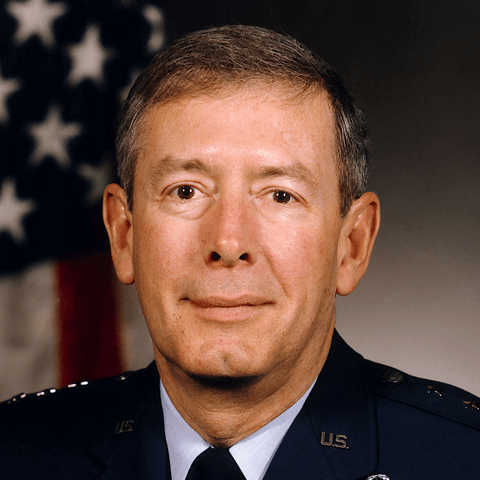
GENERAL CHARLES G. BOYD
NEW CHAIRMAN
Charles Graham Boyd (born April 15, 1938) is a retired four-star general of the United States Air Force. Boyd is a highly decorated combat pilot who served in Vietnam and is the only Vietnam War prisoner of war (1966–1973) to reach the four-star rank (1992). His final Air Force assignment was as deputy commander in chief, U.S. European Command, Stuttgart-Vaihingen, Germany. He retired from the Air Force in 1995 and has remained active in the national security realm, including as a program director of the Council on Foreign Relations and as president of Business Executives for National Security. He is a member of the guiding coalition of the Project on National Security Reform.
Deputy commander in chief, U.S. European Command
The United States European Command (EUCOM) is one of ten Unified Combatant Commands of the United States military, headquartered in Stuttgart, Germany. Its area of focus covers 21,000,000 square miles (54,000,000 km2) and 51 countries and territories, including Europe, Russia, Greenland, and Israel. The Commander of the United States EUCOM simultaneously serves as the Supreme Allied Commander, Europe (SACEUR) within NATO—an intergovernmental military alliance.
Military Retirement
Following his retirement from the Air Force in 1995, Boyd served as strategy consultant to Speaker of the United States House of Representatives, Newt Gingrich. From July 1998 he was executive director of the U.S. Commission on National Security for the 21st Century, whose final report in January 2001 predicted a growing threat to the United States from terrorism. He has also served as senior vice president and Washington program director of the Council on Foreign Relations.
From May 1, 2002 until December 31, 2009, he was the president and CEO of Business Executives for National Security (BENS), a national security public interest group. From December 14–17, 2009, Boyd led a delegation from BENS to Pyongyang, North Korea, to discuss economic issues with officials from the Democratic People's Republic of Korea government.[6] Boyd remains involved with BENS as a member of the Board of Directors.
He is a member of the board of directors at defense electronics firm, DRS Technologies; graphics software firm, Forterra Systems; and venture capitalists In-Q-Tel, who support the work of the Central Intelligence Agency.
Family
His second wife is Jessica Tuchman Mathews, former president of the Carnegie Endowment for International Peace.
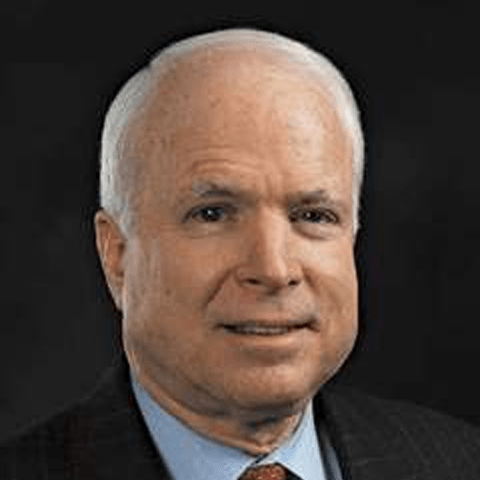
JOHN MCCAIN
US SENATOR
John Sidney McCain III (August 29, 1936 – August 25, 2018) was an American politician and military officer who served as a United States senator from Arizona from January 1987 until his death. He previously served two terms in the United States House of Representatives and was the Republican nominee for president of the United States in the 2008 election, which he lost to Barack Obama.
McCain graduated from the United States Naval Academy in 1958 and received a commission in the United States Navy. He became a naval aviator and flew ground-attack aircraft from aircraft carriers. During the Vietnam War, he almost died in the 1967 USS Forrestal fire. While on a bombing mission during Operation Rolling Thunder over Hanoi in October 1967, he was shot down, seriously injured, and captured by the North Vietnamese. He was a prisoner of war until 1973. He experienced episodes of torture and refused an out-of-sequence early release. During the war, he sustained wounds that left him with lifelong physical disabilities. He retired from the Navy as a captain in 1981 and moved to Arizona, where he entered politics.
In 1982, McCain was elected to the United States House of Representatives, where he served two terms. He entered the U.S. Senate in 1987 and easily won reelection five times. While generally adhering to conservative principles, McCain also had a reputation as a "maverick" for his willingness to break from his party on certain issues. His supportive stances on LGBT rights, gun regulations, and campaign finance reform were significantly more liberal than those of the party's base. McCain was investigated and largely exonerated in a political influence scandal of the 1980s as one of the Keating Five; he then made campaign finance reform one of his signature concerns, which eventually resulted in passage of the McCain–Feingold Act in 2002. He was also known for his work in the 1990s to restore diplomatic relations with Vietnam. McCain chaired the Senate Commerce Committee and opposed pork barrel spending. He belonged to the bipartisan "Gang of 14", which played a key role in alleviating a crisis over judicial nominations.
McCain entered the race for the Republican nomination for president in 2000, but lost a heated primary season contest to Governor George W. Bush of Texas. He secured the Republican presidential nomination in 2008, but lost the general election. McCain subsequently adopted more orthodox conservative stances and attitudes and largely opposed actions of the Obama administration, especially with regard to foreign policy matters. In 2015, he became Chairman of the Senate Armed Services Committee. He refused to support then-Republican presidential nominee Donald Trump in 2016. While McCain opposed the Affordable Care Act, he cast the deciding vote against the ACA-repealing American Health Care Act of 2017.
After being diagnosed with brain cancer in 2017, McCain reduced his role in the Senate in order to focus on treatment. He died on August 25, 2018, four days before his 82nd birthday. Following his death, McCain lay in state in the Arizona State Capitol rotunda and then in the United States Capitol rotunda. His funeral was televised from the Washington National Cathedral, with former U.S. Presidents George W. Bush and Barack Obama giving eulogies.
Upon passing away, McCain received many tributes and condolences, including from Congressional colleagues, all living former Presidents – Jimmy Carter, George H. W. Bush, Bill Clinton, George W. Bush, Barack Obama – and former Vice President Joe Biden, as well as Vice President Mike Pence and President Richard Nixon's daughters Tricia Nixon Cox and Julie Nixon Eisenhower.
Criticism
As a leading advocate in the U.S. Senate for aggressive U.S. foreign policies, including an interventionist “war on terror.” A founding member of the neoconservative-led Committee for the Liberation of Iraq, McCain consistently backed the George W. Bush administration’s efforts to expand the “war on terror” in the Middle East, championing the Iraq War and the invasion of Afghanistan. More recently, he has been a leading congressional advocate for confrontational policies on Iran and intervening militarily in Syria’s civil war. McCain is chairman of the powerful Senate Armed Services Committee, a post he attained after the GOP won a majority in the Senate in the 2014 midterm elections.
McCain’s stature as one of his party’s leading hawks has been buttressed in part by his longtime chairmanship of the International Republican Institute, the GOP-linked arm of the National Endowment for Democracy that has been closely associated with subversive U.S. actions in Latin America and other parts of the world.
McCain is arguably one of the more militaristic senators of his generation, often partnering with Senate colleagues Lindsey Graham (R-SC) and Joe Lieberman (I-CT) to press for U.S. military deployments across the globe. Following Lieberman’s retirement from the Senate after the 2012 elections, theNew York Times ran a piece marking the end of “the three amigos,” observing that the trio’s “hawkish world views often placed them at odds with their respective parties, but together they secured a place at the center of every major foreign policy debate.”
McCain has supported Graham’s bid for the 2016 Republican presidential nomination, appearing on campaign stops with Graham in states like New Hampshire. He told a crowd of Graham supporters in August 2015: “If you’ve been impressed today, as I hope you have been, with this candidate, I would like you to do me one favor if you would: Tell your friends, ‘Go and see Lindsey Graham.’”
On Iran Nuclear Deal
McCain has been a stanch critic of negotiations with Iran over its nuclear program. He frequently uses hyperbolic language in referring to the alleged threat Iran poses to the United States. For example, in a September 2015 town hall meeting organized by Christians United for Israel, McCain proclaimed that Iran is “probably the biggest threat to America and everything we stand for.”
He was a vocal opponent of the P5+1 negotiations that resulted in the historic agreement concluded in July 2015. He blasted the agreement as having “fundamental flaws” and echoed neoconservative concerns that the deal would be bad for Israel and U.S. allies in the Arab world.[5] He said after the agreement was announced: “This is delusional and dangerous, especially as we see Iran on the offensive in Iraq, Syria, Lebanon, Yemen, and elsewhere in the region. Instead, I fear this agreement could undermine the very goals we have maintained for 35 years—weakening the Islamic Republic, constraining its threatening influence, strengthening Israel and our Arab partners, lessening regional tensions, and preventing Iran from acquiring a nuclear weapons capability.”
In March 2015, McCain signed a controversial letter crafted by hawkish Sen. Tom Cotton (R-AR) addressed to Iran’s leaders, which misleadingly claimed that any deal reached with the Obama White House would not last past his administration. McCain later appeared to express regret over signing the letter, stating: “It was kind of a very rapid process. Everybody was looking forward to getting out of town because of the snowstorm. I think we probably should have had more discussion about it, given the blowback that there is.”
Just prior to the April 2015 framework nuclear deal being reached with Iran, McCain wildly proclaimed that Israel may need to “go rogue” to survive the remainder of the Obama administration. He declared: “The Israelis will need to chart their own path of resistance. On the Iranian nuclear deal, they may have to go rogue. Let’s hope their warnings have not been mere bluffs. Israel survived its first 19 years without meaningful U.S. patronage. For now, all it has to do is get through the next 22, admittedly long, months.
One commentator responded saying: “Recall that McCain is head of the Senate Armed Services Committee and a former Republican presidential candidate. His call for a foreign state to openly obstruct U.S. policy and in the process initiate a catastrophic regional war is perhaps unprecedented for someone of his senior position.”
On Syrian Civil War and ISIS
McCain has been a leading advocate of U.S. intervention in Syria’s civil war, characterizing the Obama administration’s reluctance to involve itself in the conflict as “shameful” and “feckless.”[10] An early proponent of funneling arms to opposition forces, McCain—along with Graham and Lieberman—penned an op-ed for the Washington Post in August 2012 claiming that “U.S. reluctance to intervene in Syria” was “allowing this conflict to be longer and bloodier, a radicalizing dynamic.”[11] Earlier that year, McCain and Graham paid a surprise visit to Free Syrian Army forces in Turkey, declaring in a statement that “Diplomacy with Assad has failed,” even as former UN Secretary General Kofi Annan was attempting to negotiate a ceasefire.
McCain amplified his calls for U.S. action in Syria in 2013, particularly after allegations emerged that the Assad regime had deployed small amounts chemical weapons against rebel forces (although UN investigators later said that rebels had likely used the weapons as well). Referring to President Barack Obama’s past remarks that the use of such weapons constituted a “red line” that could spur U.S. action, McCain quipped in May that the line “was apparently written in disappearing ink” and called for the United States to take “game-changing action” in Syria. Washington, he said, should “establish a safe zone” inside Syria and “supply weapons to the right people in Syria who are fighting, obviously, for the things we believe.”
Observers have warned against these steps. Bill Frelick, the refugee policy director for Human Rights Watch, has decried the notion of so-called “safe zones,” warning that “keeping people fleeing for their lives in buffer zones inside Syrian borders risks trapping rather than protecting them.”
Writing for LobeLog, former State Department official Wayne White argued that McCain had distorted Obama’s original comments, noting the president had implied action in response to the widespread use and movement of chemical weapons, not their use in a few isolated cases. Moreover, White added, due to stark sectarian divisions in Syria and the widespread presence of radical Islamist elements in the country’s opposition forces, arming the “right people” would prove nearly impossible—and would likely provoke a host of unintended consequences. “Still,” he concluded, “that has not stopped Sen. McCain (who so fervently backed US intervention in Libya, but now rails on about the deadly events in Benghazi despite the uncertain challenge posed by post-Qadhafi chaos), from advocating U.S. military involvement in the even messier situation in Syria.”
In September 2013, after new reports emerged alleging the Syrian government had used chemical weapons, McCain led calls in the Senate for the United States to launch military strikes against Syria. He strongly denounced the Obama administration for ultimately deciding not to attack and instead agreeing to a Russian-brokered deal on Syria giving up its chemical weapons stockpiles. “What concerns us most is that our friends and enemies will take the same lessons from this agreement: They see it as an act of provocative weakness on America’s part,” McCain said in a joint statement with Graham at the time.
McCain has also criticized the Obama administration for its approach toward combatting ISIS. He wrote in an August 2014 New York Times op-ed co-authored with Graham: “Still, we must face facts: A comprehensive strategy to defeat ISIS would require more troops, assets, resources and time.”
In October 2014, McCain told CNN that ISIS was prevailing in the fight in Iraq. “They’re winning, and we’re not. The Iraqis are not winning. The Peshmerga, the Kurds are not winning,” he opined. He also argued that the United States should “take the fight to Syria’s president” as part of war against ISIS, and called for establishing a no-fly zone in Syria.
In early 2015, McCain declared that “American boots on the ground are necessary to defeat [the group] in Iraq and Syria.”[19] He told MSNBC in February 2015: “I’m talking about 10,000 in Iraq. Then we need to say that our objective is to eliminate Bashar Assad as well as ISIS in Syria, and we recruit other Arab nations with Americans, but not too many, to fight against ISIS and Bashar Assad in Syria and coordinate those movements with air power guided by air controls.”
Ukraine/Russia Conflict
McCain has advocated an aggressive U.S. posture towards Russia in response to the on-going Ukraine crisis. He has called for adopting “crushing” sanctions against Russia and has said that “it is long past time” to arm Ukraine.
In March 2014, McCain lamented that there was not a military solution the United States could pursue in Ukraine. “I’d love to tell you that there is Andrea, but frankly I do not see it. I wish that there were. … I do not see a military option and it’s tragic,” he told MSNBC’s Andrea Mitchell.
In May 2015, Ukrainian President Petro Poroshenko appointed McCain as an advisor.
Iraq War Advocacy and Neoconservative Drift
A veteran of the Vietnam War who was tortured as a POW, McCain has always given top billing to his views on national security, which have steadfastly remained on the hawkish right (although, unlike many of his Republican colleagues, he has been an unwavering opponent of torture and “enhanced interrogation”). Despite frayed personal relations with President George W. Bush stemming from a bitter primary race for the 2000 GOP presidential nomination, McCain was an important ally of the president’s policies in Iraq, supporting the war effort long after it fell from public favor. The senator was once quoted as saying it would be “fine” if U.S. troops remained in Iraq for “a hundred years.”
As the GOP’s 2008 presidential nominee, McCain hinged his campaign on the argument that he would be a stronger commander and chief than his opponent, Sen. Barack Obama (D-IL). McCain’s ongoing support for the Iraq War, however, ran up against growing public discontent with the conflict, highlighting his association with the unpopular George W. Bush and stoking concerns that he was weak on the economy. Obama frequently cited McCain’s hawkish tendencies as a sign that the Arizona senator was out of touch. For example, during the candidates’ second debate in October 2008, Obama responded to McCain’s charge that Obama was too inexperienced on foreign affairs, saying: “Senator McCain suggests that … he’s somber and responsible. … [T]his is the guy who sang, ‘Bomb, bomb, bomb Iran,’ who called for the annihilation of North Korea. That I don’t think is an example of ‘speaking softly.’ This is the person who, after we had—we hadn’t even finished Afghanistan, where he said, ‘Next up, Baghdad.’”
McCain was also an early advocate of President Bush’s “surge” in Iraq, a marked escalation of the war that came shortly after a sweeping GOP defeat in the 2006 midterm elections, which were widely interpreted as a public rebuke of the deeply unpopular conflict.
After returning from a January 2007 trip to Afghanistan, Iraq, and Israel with Sen. Joe Lieberman (I-CT), McCain and Lieberman presented their opinions on Iraq to an audience at the American Enterprise Institute (AEI), the Washington, D.C.-based think tank that serves as home for many leading neoconservative writers. Emphasizing his belief that the Iraq War was still “winnable,” McCain laid out his argument for a troop surge: “The presence of additional coalition forces would give the Iraqi government the ability to do what it cannot accomplish today on its own—impose its rule throughout the country. In bringing security to Iraq and chiefly to Baghdad, our forces would give the government a fighting chance to pursue reconciliation.”[26] This plan was echoed by one proposed by AEI scholar Frederick Kagan and retired Gen. Jack Keane, which unveiled at the same AEI event at which McCain and Lieberman spoke.
Earlier, in 2002, McCain played a role in supporting aWhite House-orchestrated campaign to build public and congressional support for the invasion of Iraq when he served as an honorary co-chair of the Committee for the Liberation of Iraq, founded in late 2002 by Bruce Jackson of the now-defunct Project for the New American Century. While most of the committee members were neoconservatives and Republican Party hawks like McCain, several hardline Democrats also supported the group, including Lieberman and former Sen. Bob Kerrey (D-NE). The group’s executive director was Randy Scheunemann, a lobbyist who while on the staff of then-Senate Majority Leader Trent Lott (R-MS), wrote the Iraq Liberation Act, which authorized $98 million for the Iraqi National Congress and served as a key stepping-stone on the path to the Iraq War. Scheuenmann went on to become McCain’s top foreign policy advisor during the 2008 presidential race.
Outside observers noted the impact of Scheunemann and other hawks on McCain’s policy preferences. According to John Judis, it was during McCain’s failed bid for the GOP 2000 presidential nomination that the influence of hardliners began to take root. Judis writes that McCain began “seeking to differentiate his views from those of other Republican presidential aspirants and from the growing isolationism of House Republicans … [placing] his new interventionist instincts within a larger ideological framework. That ideological framework was neoconservatism. McCain began reading theWeekly Standard and conferring with its editors, particularly Bill Kristol.” Shortly after his staff consulted with Kristol, McCain hired a bevy of neoconservative-aligned operatives, including Scheunemann, Marshall Wittmann , and Daniel McKivergan .
The impact of this group of advisors on the senator’s thinking was revealed in early 1999, according to Judis, when McCain spoke at Kansas State University using a speech Scheunemann helped draft. In it, McCain echoed the neoconservative idea of “national greatness conservatism,” arguing: “The United States is the indispensable nation because we have proven to be the greatest force for good in human history…. [W]e have every intention of continuing to use our primacy in world affairs for humanity’s benefit.” Judis reported about the stumping, “The centerpiece of the speech was a strategy that McCain called ‘rogue-state rollback,'” a term Scheunemann claimed to have coined based on rhetoric used by critics of 1950s Cold War containment strategy.
Israel-Palestine
McCain promotes an Israel-centric vision of Mideast peace, often echoing neoconservative rhetoric equating U.S. security with that of Israel. Speaking at a 2001 conference of the American Israel Political Affairs Committee (AIPAC), McCain said: “In addition to her moral commitment to Israel’s security, America must provide Israel with whatever military equipment and technology she requires to defend herself, above and beyond what we supply today if necessary. Our support for Israel must intensify, as threats to Israeli security have intensified.” In a speech to the American Jewish Committee in 2002, McCain said: “I think the Israeli people would agree that we can’t wait for rogue regimes like Iran, Iraq, and Syria to develop the weapons that would seriously challenge Israel’s defenses, and our own. I think Israelis would agree that a posture of robust deterrence is no longer enough in this age of weapons of mass destruction.”
Similarly, during the Israel-Lebanon conflict in summer 2006, McCain rejected mounting criticism of Israel for its response to the Hezbollah kidnappings. “What would we do if somebody came across our borders and killed our soldiers and captured our soldiers?” asked McCain. “Do you think we would be exercising total restraint?”
Despite sharing a number of common policy objectives with neoconservatives and other hawks, McCain has promoted negotiated compromises in the Israeli-Palestinian conflict. In a May 2006 interview with Haaretz, an influential Israeli daily, McCain said that he favored Israeli-Palestinian peace negotiations led by realists like Brent Scowcroft or Jim Baker; he also nodded his assent in response to the question: “In general, a movement toward the June 4, 1967 armistice lines, with minor modifications?” Writing in the New Republic, John Judis commented that the interview—which McCain disputed after an upsurge of Israeli criticism—indicated that McCain might be “closer to George H.W. Bush than to George W. Bush. And that’s not a bad thing at all.”
During the 2008 presidential campaign, Scheunemann, who advised McCain’s 2008 presidential campaign as well as his failed 2000 presidential bid, argued that despite a number of “realists,” such as Scowcroft, among McCain’s foreign policy advisors, his own influence and that of other like-minded advisors like William Kristol and Robert Kagan was paramount in McCain’s thinking. “I don’t think, given where John has been for the last four or five years on the Iraq War and foreign policy issues, anyone would mistake Scowcroft for a close adviser,” Scheunemann said, adding that even if Scowcroft were close, McCain “was not taking the advice.”
McCain has served since 1992 as the chairman of the International Republican Institute, a program of the Republican Party that was created in 1983 as a channel for funding from the then-newly created National Endowment for Democracy . Since its early years of work supporting U.S. partners in Central America and the Caribbean, the IRI has gained a reputation as a surrogate for interventionist U.S. foreign policy. IRI has offices around the world, and currently funds nongovernmental organizations in 50 countries. During the Bush administration, the IRI was a leading U.S. actor in supporting individuals and organizations that sought to overthrow President Jean-Bertrand Aristide in Haiti (successfully in February 2004) and President Hugo Chavez in Venezuela (unsuccessfully in April 2002).
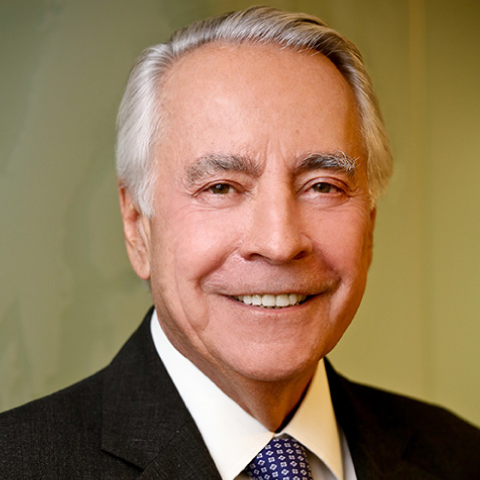
RICHARD BURT
KISSINGER ASSOCIATES, US-RUSSIA BUSINESS COUNCIL DIRECTOR
Richard R. Burt (born February 3, 1947) is an American businessman and diplomat who served as United States Ambassador to Germany and was a chief negotiator of the Strategic Arms Reduction Treaty. Prior to his diplomatic career, Burt worked as director of a non-governmental organization and was a correspondent for The New York Times.
Following graduate school, he was selected for a research fellowship at the United States Naval War College. Following this fellowship, Burt moved to London to work as a research associate and later Assistant Director of the International Institute of Strategic Studies. In 1977, he was hired by The New York Times to work as a correspondent on national security issues.
Burt began working for the United States Department of State in the early 1980s. In 1981, he was appointed Director of Politico-Military Affairs, and in 1983 Assistant Secretary of State for European and Canadian Affairs. In 1985, he became the United States Ambassador to Germany. His tenure as Ambassador to Germany coincided with the beginning of the process that would lead to the reunification of Germany. In 1989, President George H.W. Bush appointed Burt as chief negotiator for the Strategic Arms Reduction Treaty (START I) between the United States and the Soviet Union, with the rank of ambassador. The treaty, signed in 1991, limited the number of nuclear weapons that the two countries could have.
After negotiation of the START I treaty, Burt left government service and entered the private sector. He served as John McCain's top national security adviser during McCain's 2000 and 2008 Presidential campaigns. In 2000, he and others invested in the business intelligence and risk-assessment and management firm Diligence.[6] In 2007, he left Diligence to join Kissinger McLarty Associates. He has also worked as a partner in consulting firms McKinsey and Company and now serves as a managing partner of McLarty Associates in Washington, D.C. In addition, he has served on boards for Deutsche Bank's Scudder and Germany mutual fund families, America Abroad Media,[7] International Games Technology, UBS mutual funds, and Textron Corporation. Burt is also a Senior Advisor to the Center for Strategic and International Studies and U.S. Chair of Global Zero. He has lobbied on behalf of LOT Polish Airlines, the Capital Bank of Jordan, and Ukrainian construction firm TMM.
In 2014 through early 2016, Burt served as an unpaid foreign policy advisor for Rand Paul's campaign for president.
During the first two quarters of 2016, McLarty Associates received $365,000 to lobby for New European Pipeline AG, a firm owned by Russian oil company Gazprom. Beginning in February 2016, he and a colleague represented the five European energy companies investing in Nord Stream II, an expansion of the Nord Stream pipeline which would allow Russian gas to reach Europe without going through Belarus or Ukraine. He contributed to Trump's first major foreign policy speech, April 27, 2016, at the Mayflower Hotel. In the speech, Trump called for greater cooperation with Russia. In an April 2019 interview of the Center for the National Interest's Dmitry Simes by Christiane Amanpour, Burt was the top national security adviser to the 2016 Trump campaign.
Burt registered as a lobbyist for a gas pipeline venture that was 50 percent owned by Russia’s Gazprom at the time.
Burt is a board member of the Center for the National Interest as well as a board director of the US-Russia Business Council.
Burt is on the Russian firm Alfa Capital Partners Advisory Board in which Russia's Alfa-Bank is an investor.
[Source]
[Source]
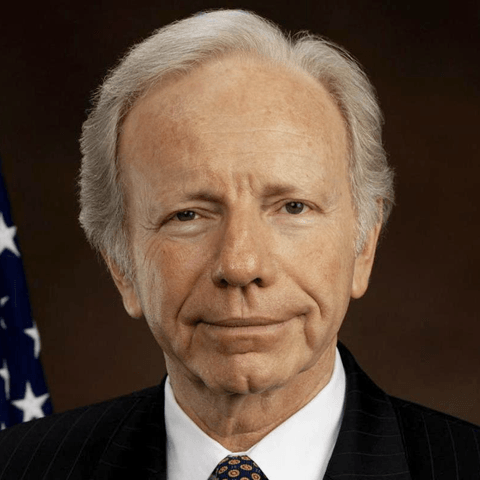
JOE LIEBERMAN
US SENATOR
United Against Nuclear Iran:Chairman
American Enterprise Institute: Project Co-Chair
U.S. Senator (D, I-CT) (1989-2013)
Board member of The Israel Project
Former Sen. Joseph Lieberman, regarded as the “Republicans’ favorite Democrat” because of his neoconservative foreign affairs agenda, represented Connecticut initially as a Democrat and later as an “Independent Democrat.” First elected to the Senate in 1988, Lieberman retired at the end of his term in 2013.
In the Senate, Lieberman regularly teamed up with like-minded Republican colleagues—notably Sens. John McCain, Lindsey Graham, and Jon Kyl—to promote militarist security policies. He earned a reputation as a foreign policy hawk for his outspoken support for the war in Iraq and for his consistent collaboration with neoconservative-led advocacy groups pushing for interventionist policies in the Middle East.
Since leaving office, Lieberman has continued his foreign policy advocacy, joining numerous neoconservative groups, in particular the American Enterprise Institute (AEI), where he co-chaired with former Senator Kyl its American Internationalism Project, a purportedly cross-party initiative meant “to rebuild and reshape a bipartisan consensus around American global leadership and engagement.”[1] His tenure at AEI, wrote one commentator, allowed Lieberman “to pontificate to a sympathetic audience about why he regards even mild opposition to his intransigent bellicosity as benighted obstructionism.”[2]
Lieberman has also worked with the Washington Institute for Near East Policy, a spinoff of the American Israel Public Affairs Committee (AIPAC), where he became a member of its board of advisors in January 2013[3]; the Jewish Institute for National Security Affairs, where he become a member of the advisory board; and the Hudson Institute, where he co-chaired the “Blue Ribbon Study Panel on Biodefense.” In November 2013, Lieberman joined the Center for a New National Security (CNAS) as a member of its board of directors.[4]
In 2015, Lieberman joined the advisory board of an AIPAC-backed lobbying organization, Citizens for a Nuclear Free Iran (CNFI). Lieberman’s affiliation with the group elicited criticism in part because of his support for the Mojahedin-e Khalq (MEK), a controversial Iranian opposition group which until 2012 was on the State Department’s list of terrorist organizations.[5] Citizens for a Nuclear Iran subsequently removed references to Mojahedin-e Khalq from its website.[6]
Lieberman is currently chairman of the Sheldon Adelson-backed United Against Nuclear Iran (UANI). He replaced Gary Samore after the latter stepped down in 2015 and announced his support for the nuclear deal with Iran. Said Lieberman at the time: “UANI has led the effort to economically isolate the Iranian regime, and its bipartisan and international expertise makes it a highly respected voice on the merits of the Iran agreement. I am honored to assume this new leadership role at this important time.”[7]
Since the 2016 election of Donald Trump, Lieberman has been both critical and supportive of the administration. While he ridiculed Trump’s call to force Mexico to pay for the construction of a border wall, Lieberman has lauded his “sea change” on Iran policy. In a February 2017 media interview, Lieberman urged Trump not to “tear up” the agreement but to closely monitor Iran to see if they are not complying and “and if they don’t comply, then we can break out of the agreement.” After Trump’s controversial firing of FBI Director James Comey in May 2017, Lieberman was briefly considered a leading candidate for the post.
Lieberman—who promised during his Senate career that he would never become a lobbyist[8]—has worked as a lobbyist since retiring fro the Senate. Lieberman’s lobbying efforts form part of his work as senior counsel for Kasowitz Benson Torres & Friedman, a national law firm Lieberman joined in June 2013 and whose lobbying operation is headed by Lieberman’s former chief of staff.[9] As of 2017, Lieberman was listed as being “senior counsel” at the law firm.
Opposition to Iran Diplomacy
Lieberman actively advocated against the nuclear negotiations between Iran and six world powers, which led to the historic July 2015 agreement between Tehran and the P5+1 group of nations. He argued that “no deal” with Iran would have been a better option for the United States than a “bad deal.” He wrote in a July 2014 op-ed: “Rather than being a defeat for the United States, a refusal to accept a bad deal in Vienna could strengthen the Obama administration at home and abroad. It would help rebuild its bruised credibility and influence in the Middle East and hopefully increase the odds that the administration can ultimately achieve the goal of peacefully, verifiably bolting the door on Iran’s illicit nuclear ambitions.”[10]
Lieberman also strongly defended Israeli Prime Minister Benjamin Netanyahu’s controversial March 2015 speech to Congress criticizing the Obama administration’s negotiations with Iran. Leading up to the speech, Lieberman urged Democratic members of Congress to not skip Netanyahu’s address, saying: “Go because you know that Israel is one of our closest and most steadfast allies and you feel a responsibility to listen to its leader speak about developments that he believes could threaten the safety, independence and even existence of his country.”[11]
In a March 2015 interview shortly before Netanyahu’s speech, Lieberman argued that Netanyahu wished to address Congress because he saw “echoes” of British Prime Minister Neville Chamberlain in President Obama’s approach to Iran. “I think there are echoes of this that I think Netanyahu hears and we ought to all hear so that we don’t repeat the worst experiences of history,” Lieberman opined.[12]
After the comprehensive nuclear deal was reached with Iran in July 2015, Lieberman claimed that the United States had “conceded and conceded and conceded” to Iran and urged members of Congress to revoke the agreement. “I can’t think of a vote that I cast, apart from the ones deploying American troops into combat, that was as important as this agreement is to the future security of the United States,” Lieberman declared.[13]
Shortly after the deal was announced, Lieberman joined the advisory board of a new AIPAC-backed lobbying organization, Citizens for a Nuclear Free Iran (CNFI). CNFI launched a multi-million dollar ad campaign against the Iran deal that was primarily aimed at Democratic constituencies in an effort to get Democratic votes in Congress to reject the deal. CNFI’s board of advisors has included several former Democratic members of Congress, including former Sens. Evan Bayh (IN), Mark Begich (AK), Mary Landrieu (LA), and former Rep. Shelley Berkley (NV).[14] CNFI’s TV ads released after the July 2015 accords were described by prominent nuclear experts as “very misleading.”[15]
After he became chairman of UANI in August 2015, Lieberman was appointed the chairman of the Sheldon Adelson-backed United Against Nuclear Iran (UANI), a UANI press release said the t“Senator Lieberman will play a key leadership role throughout UANI’s efforts to educate and inform the American public regarding the serious shortcomings of the Iran nuclear deal.”[16] Commented one writer: “For those who are noting the overlap between Iraq war promoters and Iran deal saboteurs, Lieberman is your man.”[17]
Senate Hawk on Syria and Iran
During his final term in the Senate, Lieberman was a vocal advocate for U.S. intervention in Syria’s civil war. In an August 2012 Washington Post op-ed coauthored with McCain and fellow hawk Sen. Lindsey Graham (R-SC), Lieberman called for the United States to arm select Syrian opposition groups and to provide air support for so-called “humanitarian safe zones” on Syria’s borders, despite arguments from many analysts that Syria’s conflict increasingly resembled a sectarian civil war and may have been infiltrated by foreign jihadists.[18]
“The U.S. reluctance to intervene in Syria is, first of all, allowing this conflict to be longer and bloodier, a radicalizing dynamic,” they wrote. “Contrary to critics who argue that a greater U.S. role in Syria could empower al-Qaeda, it is the lack of strong U.S. assistance to responsible fighters inside the country that is ceding the field to extremists there.”[19]
Earlier that year, McCain and Lieberman made a surprise visit to Free Syrian Army fighters on the Turkish border, where they declared that the conflict could only be resolved militarily. “Diplomacy with Assad has failed,” they said in a statement, “and it will continue to fail so long as Assad thinks he can defeat the opposition in Syria militarily.”[20]
Lieberman was also among Congress’s most strident hardliners regarding Iran, pushing through new sanctions measures and advocating for an aggressive U.S. posture. In comments made at the neoconservative Foreign Policy Initiative shortly after the 2010 midterm elections, Lieberman asserted that Congress would pressure the Obama administration for more sanctions against Tehran and possibly military action. Arguing that he was skeptical that economic sanctions could prevent Iran from developing a nuclear weapon, Lieberman contended there was “broad bipartisan base of support” for taking military action against Iran.[21]
In April 2006, Lieberman became the first prominent Democrat to announce his support for preemptive attacks against Iran to stop it from developing nuclear weapons. In an April 2006 interview with the Jerusalem Post, Lieberman said the aim of air strikes would be “to delay [the nuclear program] to deter it hoping that you set the program off course so that by the time they catch up back to where they were there’s been a change in government. That’s the limited objective that I would see.”[22]
By mid-2007, Lieberman had expanded his agenda to include attacking sites in Iran near the border with Iraq. He argued the sites were being used to arm and train insurgents. Frustrated with the lack of political will in Washington to support U.S. strikes without sufficient proof of complicity of Iranian support for attacks in Iraq, Lieberman called on June 11, 2007, for a “strike over the border into Iran, where we have good evidence that they have a base at which they are training these people coming back into Iraq to kill our soldiers.”[23]
In September 2007, Lieberman and Kyl cosponsored an amendment calling on the State Department to officially label the Iranian Revolutionary Guard Corps as a “foreign terrorist organization.” According to the Agence France Presse, the non-binding amendment, which passed 76-22, “says that senators agree it is in the critical national interest of the United States to prevent Iran turning Shia extremists in Iraq into a ‘Hezbollah type force.’”[24]
Independent Democrat or Neoconservative?
Lieberman’s support for the Bush administration’s “war on terror” made him a target of antiwar Democrats, and he was eventually defeated during a 2006 Senate primary contest against Ned Lamont. However, Lieberman handily won the general election as an Independent.[25] Some observers attributed the primary defeat to Lieberman’s Senate vote on June 22, 2006, in which he was one of only six Democratic senators to vote against two resolutions aimed at limiting U.S. involvement in the Iraq War.[26]
Lieberman critics also frequently highlighted the senator’s cozy relationship with Republicans, who often lavished praise on the senator. In December 2005, for example, after Lieberman chastised Democrats for pushing for withdrawal from Iraq, both Vice President Dick Cheney and then-Secretary of Defense Donald Rumsfeld publicly extoled him. Said Cheney: “On this, both Republicans and Democrats should be able to agree. The only way the terrorists can win is if we lose our nerve and abandon our mission.”[27]
In the run up to his 2006 primary election defeat, Lieberman announced that he would run as a “petitioning Democrat” during the main election, sparking widespread criticism from Democrats. Responding to the announcement, Markos Moulitsas, the founder of the Daily Kos blog, told the New York Times: “An interesting kind of ‘Democrat,’ Lieberman thinks he is. One who doesn’t respect the wishes of his state’s Democratic voters, one who will split his state’s vote on the left and potentially hand the election to a Republican.”[28]
The election sparked a spirited debate over Lieberman and what his fate might mean for the Democratic Party. Some, like Marshall Wittmann, a fellow at the (now defunct) right-leaning Democratic Leadership Council (DLC) and the Progressive Policy Institute, contended that Kos and other “McGovernites with modems” are playing a dangerous game in attacking Lieberman, a game that ultimately plays into Republicans’ hands.[29]
Harold Meyerson, editor-at-large of the left-leaning American Prospect, saw the issue a bit differently, writing in an op-ed for the Washington Post: “Lieberman’s ultimate problem isn’t fanatical bloggers, any more than Lyndon Johnson’s was crazy, antiwar Democrats. His problem is that Bush, and the war that both he and Bush have championed, is speeding the ongoing realignment of the Northeast. His problem, dear colleagues, is Connecticut.”[30]
In one of his first moves after winning the 2006 midterm, Lieberman announced that his new spokesman would be Wittmann, whom the New York Times characterized “one of the great ideological contortionists.”[31]
An idiosyncratic ideologue associated with a bewildering array of political factions—including the Trotskyites, the neoconservatives, the Christian Coalition, and various Republican politicians—Wittmann promoted efforts to push hardline policies in the Democratic Party as a senior fellow of the Progressive Policy Institute and the DLC. In a press release regarding Wittmann’s appointment, Lieberman said: “There is no better person to take the helm during this new time in my Senate career than Marshall. Marshall has been a trusted outside adviser to me for some time now and I’m glad he will be bring his experience and wisdom to my staff. Those qualities, along with his independence and diverse background, make him the ideal captain of my new Senate Communications team.”[32]
History of Neoconservative Advocacy
Throughout the 1990s, Lieberman supported Republican-led initiatives to ramp up efforts to build a missile defense system, becoming one of only a handful of Democrats to vote in 1995 against cutting spending for space-based missile defense programs.[33] In 1998, he cosponsored with McCain the Iraq Liberation Act, which made the overthrow of Saddam Hussein an official goal of U.S. policy.[34]
In 2002, Lieberman became an honorary co-chair, along with George Shultz and Sen. John McCain (R-AZ), of the Committee for the Liberation of Iraq, an advocacy outfit spearheaded by a number of neoconservative stalwarts, including Jeane Kirkpatrick, William Kristol, Robert Kagan, Richard Perle, James Woolsey, and Eliot A. Cohen. According to the group’s mission statement, “The Committee for the Liberation of Iraq was formed to promote regional peace, political freedom, and international security by replacing the Saddam Hussein regime with a democratic government that respects the rights of the Iraqi people and ceases to threaten the community of nations.”
Lieberman serves as a distinguished advisor to the Foundation for Defense of Democracies, a purportedly nonpartisan think tank, which according to its website was formed shortly after 9/11 by “a group of visionary philanthropists and policymakers to engage in the worldwide war of ideas and to support the defense of democratic societies under assault by terrorism and militant Islamism.” Though the foundation at one time boasted some Democratic advisers, its leadership has been dominated by neoconservatives and other right-wing hawks, including Gary Bauer, Newt Gingrich, and Steve Forbes.[35]
In 2004, Lieberman helped revive the Cold War-era anti-communist group, the Committee on the Present Danger (CPD), which Lieberman then co-chaired with Woolsey, Sen. Jon Kyl (R-AZ), and George Shultz. Among the familiar names on the CPD’s list of members were Frank Gaffney, Jack Kemp, Forbes, Gingrich, and Kirkpatrick. Reflecting the trend of similar neoconservative-aligned initiatives, the CPD also enlisted a number of well-known liberal figures, including Vaclav Havel and Elie Wiesel, giving the CPD a patina of nonpartisanship. At the June 2004 press conference announcing the rebirth of the CPD, Lieberman claimed the aim of the group was “to form a bipartisan citizens’ army, which is ready to fight a war of ideas against our Islamist terrorist enemies, and to send a clear signal that their strategy to deceive, demoralize, and divide America will not succeed.”[36]
Lieberman also teamed up with Lynne Cheney , spouse of Vice President Dick Cheney, in 1995 to set up the private American Council of Trustees and Alumni (ACTA), which in 2000 gave $3.4 million to colleges and universities. While its various boards and advisory committees include elites from a diverse array of backgrounds, it has also had a number of neoconservatives, like Irving Kristol , Martin Peretz, Philip Merrill , William Bennett , Donald Kagan , Gertrude Himmelfarb , Hillel Fradkin , and Leon Kass.
In October 2001, ACTA issued a report assailing the response of U.S. universities to the 9/11 attacks, attacking dozens of college professors and students for their supposedly less-than-patriotic reactions to the terrorist attacks. Several months later in February 2002, ACTA issued a “revised and expanded” edition, which included “a sampler of the many responses” to the original report. The revised edition, authored by ACTA staff, claims in its “Acknowledgements” that “no public official—including Lynne Cheney and Sen. Joe Lieberman—has endorsed or been asked to endorse this report.”
The revised report was a compendium of some 100 statements recorded by ACTA that reveal what it purported to be “moral equivocation” and outright hostility toward the United States among academic elites. Such statements included: “Just because a grotesque act was committed against this country, does not mean any response is justified; it does not grant this country special license to use the sword;” “[Americans should] bring ourselves and our country to justice, not just the perpetrators;” and, “War created people like Osama bin Laden, and more war will create more people like him.” While the original version cited the names of particular professors, leading to charges that the report resembled a blacklist, the revised edition suppressed the names “to focus discussion on the content of the views expressed, rather than the individuals who expressed them.” Also excised in the new edition were a number of scathing judgments from the original that were cited in press reports, such as the charge that “colleges and university faculty have been the weak link in America’s response” to the attacks, and “when a nation’s intellectuals are unwilling to defend its civilization, they give comfort to its adversaries.”[37]
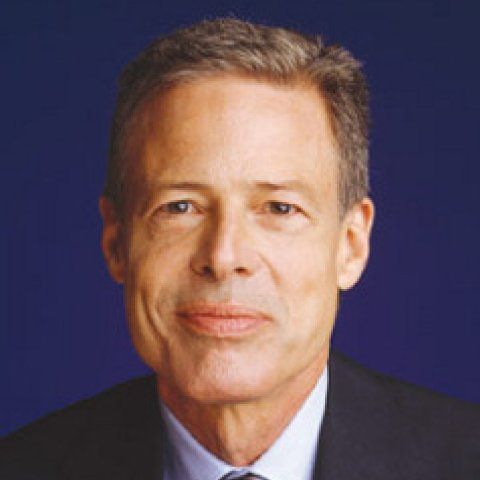
JEFFREY BEWKES
CEO AOL TIME-WARNER
Jeffrey Lawrence Bewkes (born May 25, 1952) is an American media executive. He was CEO of Time Warner from January 1, 2008 to June 14, 2018, President from December 2005 to June 2018, and Chairman of the Board from January 1, 2009 to 2018.
In 1974, he graduated from Yale University with a bachelor's degree in philosophy. According to college friend Gary Lucas, a guitarist who went on to collaborate with avant-garde acts like Captain Beefheart, at Yale in the early 1970s he fell in with "lunatic fringe types and free thinkers".
Worked as a commercial banker in Citibank's shipping lending unit.
Leaving Citibank, he took a job at HBO then a small unit of Time Inc., where he was tasked with convincing hotels to subscribe to HBO and then sales director responsible for the launch of Cinemax. He rose to become CFO in 1986 and President and COO in 1991. In 1995 he became CEO of HBO, in which capacity he tripled company profits and "oversaw a fundamental shift in its content, away from just movies and fights and toward original shows like The Sopranos".
In 2002, he became chairman of Time Warner's entertainment and networks group. From 2005 to December 2007, he served as the top subordinate to Time Warner Chairman and CEO Dick Parsons. In 2008, Bewkes was selected as Parsons' successor, becoming CEO of Time Warner, and then Board Chair in 2009.
As CEO of Time Warner, Bewkes oversaw HBO, Turner Broadcasting System, Warner Bros. and New Line Cinema, while he oversaw the company's divestment from AOL, Time Inc. and Time Warner Cable. In January 2006, Bewkes and CBS Corporation head Les Moonves helped broker the deal that joined the CBS-owned UPN with The WB to form The CW Network.
On behalf of NYC Mayor Michael R. Bloomberg, Bewkes was one of the chairs of Media.NYC.2020, which reviewed the future of the global media industry, the implications for NYC, and suggested actionable next steps for the NYC government.
In October 2016, it was announced that AT&T would acquire Time Warner in a deal worth $84.5 billion. In July 2017, Bewkes announced he would leave Time Warner on completion of that merger. In November 2017, the U.S. Justice Department filed a lawsuit to block the acquisition, leaving Bewkes' future with the company unknown, but the merger closed in 2018 after the company won in court and the acquired company now assume the WarnerMedia name.
Bewkes was the boss of CNI advisory board member, Richard Plepler and Jeff Zucker, CNN President.
In March 2016, CNI held a meeting at Manhattan’s Time Warner Center. The main attraction of the March 14th event was Henry Kissinger, the center’s honorary chairman, who gave a talk that included analyzing U.S.-Russia relations for a small group of attendees. One with very close ties to Donald Trump was Jared Kushner.
Kushner’s invitation to the March lunch came from a Time Warner executive. Richard Plepler, CEO of television network HBO, and his boss, then-Time Warner CEO Jeffrey Bewkes, sit on the board of the center. Attendees that day included Jeffrey Zucker, president of CNN; the center’s chairman, General Charles Boyd; and Drew Guff, who invests in Russia through his firm Russia Partners.
As Kushner planned Trump’s April speech, he relied on Simes for the guest list. Richard Burt, one of the organization’s directors, helped write the speech. In February that year, Burt registered as a lobbyist for a gas pipeline venture that was 50 percent owned by Russia’s Gazprom at the time.
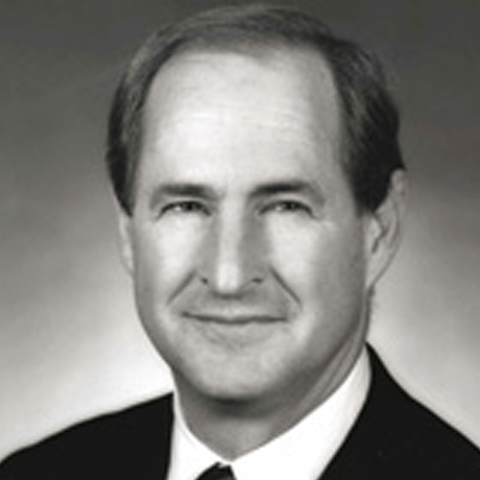
EUGENE K. LAWSON
CEO, LAWSON INTERNATIONAL INC.
Eugene K. Lawson is the co-founder of the U.S.-Russia Business Council (USRBC) and served as USRBC’s president for 15 years until his retirement in June 2008. Mr. Lawson’s service as CEO of the USRBC established the Council as one of the central participants in U.S.-Russian relations.
In June 2003, Senators Sam Nunn and Richard Lugar awarded Mr. Lawson the Nunn-Lugar medal for improving U.S.-Russian security relations. In July 2007, Russian President Vladimir Putin awarded Mr. Lawson the Order of Friendship "for his significant contribution to the development of commercial and economic relations between the Russian Federation and the United States." Previous recipients include Van Cliburn, James Wolfensohn, and Donald Kendall. In May 2014, Mr. Lawson received the Corporate Citizenship Award from the Kennan Institute of the Woodrow Wilson International Center for Scholars.
Prior to establishing the U.S.-Russia Business Council, for four years Mr. Lawson was vice chairman of the Export-Import Bank of the United States, confirmed by the U.S. Senate following his nomination by President George H.W. Bush in 1989. In 1988, he served as U.S. ambassador to the International Labor Organization in Geneva.
A native of Oklahoma, Mr. Lawson received a B.A. from Princeton University and an M.A. and Ph.D. from Columbia University. His most recent book, Russian-Eurasian Renaissance? U.S. Trade and Investment in Russia and Eurasia, was co-edited with Jan Kalicki and published in 2003 by Stanford University Press.
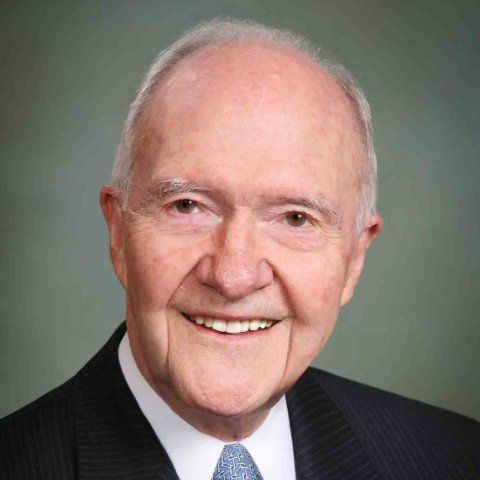
BRENT SCOWCROFT
SCOWCROFT GROUP
Retired U.S. Army Lt. Gen. Brent Scowcroft is President and Founder (June 1994) of the Scowcroft Group and "one of the country's leading experts on international policy." Scowcroft provides "Group clients with unparalleled strategic advise and assistance in dealing in the international arena."
General Scowcroft was born in Ogden, Utah. He received his undergraduate degree and commission into the Army Air Forces from the U.S. Military Academy at West Point. He has an M.A. and Ph.D. from Columbia University.
Scowcroft is also the founder and "president of the Forum for International Policy, a non-profit organization that he founded in 1993 that promotes American leadership and foreign policy."
Scowcroft served as National Security Advisor to both Presidents Gerald R. Ford and George Herbert Walker Bush. He was Vice Chairman of Kissinger Associates, Inc. (1982-1989), an international consulting firm. "In this capacity, he advised and assisted a wide range of U.S. and foreign corporate leaders on global joint venture opportunities, strategic planning and risk assessment."
Scowcroft's prior 29-year "military career began with graduation from West Point and concluded at the rank of Lieutenant General following service as the Deputy National Security Advisor. His Air Force service included Professor of Russian History at West Point; Assistant Air Attache in Belgrade, Yugoslavia; Head of the Political Science Department at the Air Force Academy; Air Force Long Range Plans, Office of the Secretary of Defense International Security Assistance, Special Assistant to the Director of the Joint Chiefs of Staff and Military Assistant to President Richard M. Nixon."
Scowcroft has either chaired or served on a number of policy councils:
Defense Policy Board
President's Blue Ribbon Commission on Defense Management
President's Commission on Strategic Forces
President's General Advisory Committee on Arms Control
President's Special Review Board, also known as the Tower Board, which investigated and covered up the full scope of the Iran-Contra scandal
"General Scowcroft had an aeronautical rating as a pilot and has numerous military decorations and awards. In addition, President Bush presented him with the Medal of Freedom Award in 1991. In 1993, he was presented with the insignia of an Honorary Knight of the British Empire (K.B.E.) by Her Majesty Queen Elizabeth at Buckingham Palace".
He is also on the board of counselors for the Arabic media group Layalina Productions and is a member of the Inter-American Dialogue.
Honorary Member, Academy of Political Science
Editorial Board, International Security
International Board (Chair), U.S./Middle East Project
Affiliations
President, Forum for International Policy
Chairman, President's Foreign Intelligence Advisory Board
Chairman, Pacific Forum at Center for Strategic and International Studies (CSIS)
Chairman, American-Turkish Council
Chairman, Presidential Library Foundation of George Herbert Walker Bush
Director, Alliance for Climate Protection
Director, Pennzoil-Quaker State
Director, Qualcomm/Qualcomm (since 1994)
Director, American Council on Germany
Board Member, Gerald R. Ford Foundation
Board Member, George C. Marshall Foundation
Board Member, Center for Strategic and International Studies
Board Member, Atlantic Council of the United States
Board Member, International Republican Institute
Board Member, National Defense University
Member, Council on Foreign Relations
Member, Atlantic Institute
Advisory Council, American Ditchley Foundation
Advisory Board, School of International and Public Affairs at Columbia University
Advisory Board, OILspace
Honorary Advisor, US-Azerbaijan Chamber of Commerce
Honorary Advisor, National Committee on United States-China Relations' Young Leaders Forum
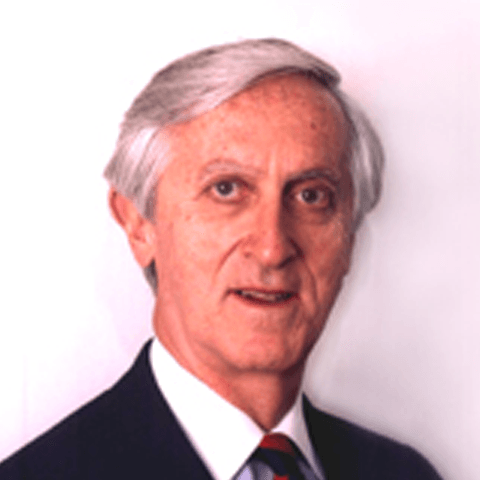
LIONEL OLMER
Senior Partner in the Law Firm of Paul, Weiss, Rifkind, Wharton, and Garrison
Under Secretary of Commerce for International Trade under Reagan
Board member of SIPEX Corporation and worked for Motorola Corporation
Acting, Executive Secretary, President's Foreign Intelligence Advisory Board
Member of the U.S.-China Business Council
Afflitations
U.S.-Korea Business Council, Atlantic Council, Nixon Center, Council on Foreign Relations
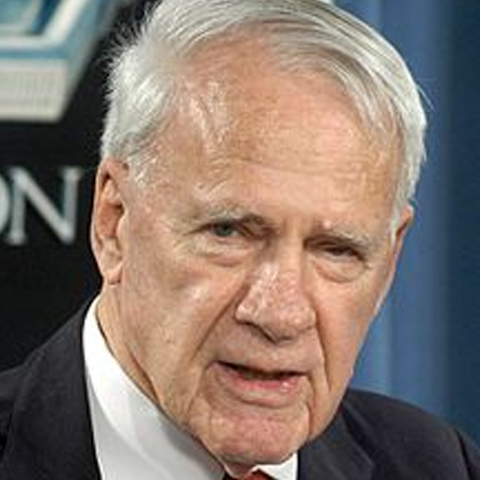
JAMES RODNEY SCHLESINGER
SECRETARY OF DEFENSE
(February 15, 1929 – March 27, 2014) was an American economist and public servant who was best known for serving as Secretary of Defense from 1973 to 1975 under Presidents Richard Nixon and Gerald Ford. Prior to becoming Secretary of Defense, he served as Chair of Atomic Energy Commission (AEC) from 1971 to 1973, and as CIA Director for a few months in 1973. He became America's first Secretary of Energy under Jimmy Carter in 1977, serving until 1979.
While Secretary of Defense, he opposed amnesty for draft resisters and pressed for development of more sophisticated nuclear weapon systems. Additionally, his support for the A-10 and the lightweight fighter program (later the F-16) helped ensure that they were carried to completion
James Rodney Schlesinger was born in New York City, the son of Jewish parents, Rhea Lillian (née Rogen) and Julius Schlesinger.[3] His mother was a Lithuanian emigrant from what was then part of the Russian Empire and his father's family was from Austria. He converted to Lutheranism in his early 20s. Schlesinger was educated at the Horace Mann School and Harvard University, where he earned a B.A. (1950), M.A. (1952), and Ph.D. (1956) in economics. Between 1955 and 1963 he taught economics at the University of Virginia and in 1960 published The Political Economy of National Security. In 1963, he moved to the RAND Corporation, where he worked until 1969, in the later years as director of strategic studies.
Nixon Administration
Then Chairman Schlesinger with Nixon in September 1971
In 1969, Schlesinger joined the Nixon administration as assistant director of the Bureau of the Budget,[5] devoting most of his time to Defense matters. In 1971, President Nixon appointed Schlesinger a member of the Atomic Energy Commission (AEC) and designated him as chairman. Serving in this position for about a year and a half, Schlesinger instituted extensive organizational and management changes in an effort to improve the AEC's regulatory performance.
CIA Director
Schlesinger was CIA Director from February 2, 1973 to July 2, 1973.[6][7] Schlesinger was extremely unpopular with CIA staff, as he reduced CIA staff by 7%, and was considered a Nixon loyalist seeking to make the agency more obedient to Nixon.[7] He had a CCTV camera installed near his official portrait at the CIA headquarters in Langley, Va., as it was believed that vandalism of the portrait by disgruntled staff was likely.
Secretary of Defense
(1973–1975)
Schlesinger left the CIA to become Secretary of Defense on July 2, aged 44. As a university professor, researcher at Rand, and government official in three agencies, he had acquired an impressive resume in national security affairs.
Defense budget
Unsurprisingly, given his determination to build up U.S. strategic and conventional forces, Schlesinger devoted much time and effort to the Defense budget. Even before becoming secretary, in a speech in San Francisco in September 1972, he warned that it was time "to call a halt to the self-defeating game of cutting defense outlays, this process, that seems to have become addictive, of chopping away year after year." Shortly after he took office, he complained about "the post-war follies" of Defense budget-cutting. Later he outlined the facts about the DoD budget: In real terms it had been reduced by one-third since FY 1968; it was one-eighth below the pre-Vietnam War FY 1964 budget; purchases of equipment, consumables, and R&D were down 45 percent from the wartime peak and about $10 billion in constant dollars below the prewar level; Defense now absorbed about 6 percent of the gross national product, the lowest percentage since before the Korean War; military manpower was at the lowest point since before the Korean War; and Defense spending amounted to about 17 percent of total national expenditures, the lowest since before the Pearl Harbor attack in 1941. Armed with these statistics, and alarmed by continuing Soviet weapon advances, Schlesinger became a vigorous advocate of larger DoD budgets. But he had little success. For FY 1975, Congress provided TOA of $86.1 billion, compared with $81.6 billion in FY 1974; for FY 1976, the amount was $95.6 billion, an increase of 3.4 percent, but in real terms slightly less than it had been in FY 1955.
First Dismissal as Secretary of Defense
Schlesinger's insistence on higher defense budgets, his disagreements within the administration and with Congress on this issue, and his differences with Secretary of State Kissinger all contributed to his dismissal from office by President Ford in November 1975. Schlesinger's legacy included the development of the close-air support aircraft the A-10, and the lightweight F-16 fighter. Kissinger strongly supported the Strategic Arms Limitation Talks process, while Schlesinger wanted assurances that arms control agreements would not put the United States in a strategic position inferior to the Soviet Union. The secretary's harsh criticism of some congressional leaders dismayed President Ford, who was more willing than Schlesinger to compromise on the Defense budget. On 2 November 1975, the president dismissed Schlesinger and made other important personnel changes. Kissinger lost his position as special assistant to the President for national security affairs but remained as secretary of state. Schlesinger left office on 19 November 1975, explaining his departure in terms of his budgetary differences with the White House.
The unreported, but important, main reason behind Schlesinger's dismissal, though, was his insubordination toward President Ford. During the Mayaguez incident, Ford ordered several retaliatory strikes against Cambodia. Schlesinger told Ford the first strike was carried out, but Ford later learned that Schlesinger, who disagreed with the order, had none of them carried out. According to Bob Woodward's 1999 book, Shadow, Ford let the incident go, but when Schlesinger committed further insubordination on other matters, Ford finally fired him.[citation needed] Woodward observes, "The United States had just lost a war for the first time. . . . That the president and the secretary of defense could not agree on who was in charge was appalling.. . . [This] unpublicized breakdown in the military chain of command was ... perhaps the most significant scandal of the Ford presidency." Schlesinger had also disobeyed Ford when told to send as many military aircraft as possible to evacuate South Vietnam. Schlesinger disagreed with doing so and didn't send the aircraft. Woodward says that an elected president, which Ford was not, would never have tolerated the insubordination.
In spite of the controversy surrounding both his tenure and dismissal, Schlesinger was by most accounts an able secretary of defense. A serious and perceptive thinker on nuclear strategy, he was determined that the United States not fall seriously behind the Soviet Union in conventional and nuclear forces and devoted himself to modernization of defense policies and programs. He got along well with the military leadership because he proposed to give them more resources, consulted with them regularly, and shared many of their views.[citation needed] Because he was a forthright speaker who could be blunt in his opinions and did not enjoy the personal rapport with legislators that prior Secretary of Defense Melvin Laird had, his relations with Congress were often strained. A majority of its members may have approved Schlesinger's strategic plans, but they kept a tight rein on the money for his programs. As for the Pentagon bureaucracy, Schlesinger generally left its management to Deputy Secretary of Defense William P. Clements.
Secretary of Defense (1973–1975)
After leaving the Pentagon, Schlesinger wrote and spoke forcefully about national security issues, especially the Soviet threat and the need for the United States to maintain adequate defenses. When Jimmy Carter became President in January 1977 he appointed Schlesinger, a Republican, as his special adviser on energy[10] and subsequently as the first Secretary of Energy[10] in October 1977. According to one account, "Schlesinger impressed candidate Jimmy Carter with his brains, his high-level experience... and with secrets regarding the defense spending vacillations of his old boss, Ford, just in time for the presidential debates."
As Energy Secretary, Schlesinger launched the Department's Carbon Dioxide Effects and Assessment Program shortly after the creation of that department in 1977. Secretary Schlesinger also oversaw the integration of the energy powers of more than 50 agencies, such as the Federal Energy Administration and the Federal Power Commission.[10] In July 1979, Carter replaced him as part of a broader Cabinet shakeup.] According to journalist Paul Glastris, "Carter fired Schlesinger in 1979 in part for the same reason Gerald Ford had—he was unbearably arrogant and impatient with lesser minds who disagreed with him, and hence inept at dealing with Congress."
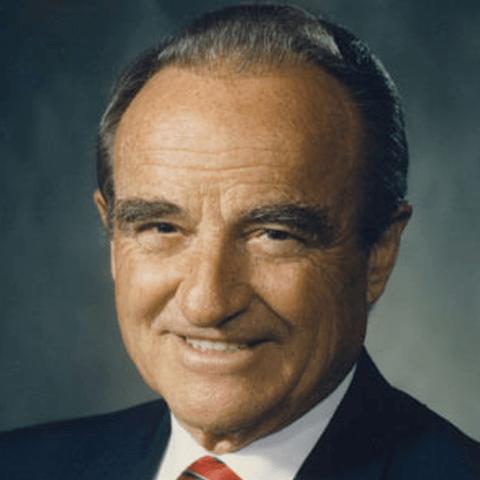
DWAYNE O. ANDREAS
Chairman Emeritus of Archer Daniels Midland Company
Andreas is a member of the Board of Trustees of the Forum for International Policy. He is believed to be a member of the Trilateral Commission.
From PBS 1998: (Note: Also see Center for Responsive Politics Donor Profile 1990-2002.)
"Perhaps America's champion all-time campaign contributor is Dwayne Orville Andreas. Although virtually unknown to most Americans, since the 1970s, leading politicians of both parties have been well acquainted with Andreas, his company, and his money. The 77-year-old Andreas rose from modest circumstances to become chairman of the Archer Daniels Midland Company, which is based in Decatur, Illinois, and is the largest U.S. processor of farm commodities such as wheat, corn and soybeans.
"Born to a Mennonite farm family outside Worthington, Minnesota, Andreas grew up mostly in Iowa and attended Wheaton College in Illinois. But after getting married in his sophomore year, the diminutive (height: 5-foot-4) Andreas dropped out and joined a small, family-owned food-processing firm in Cedar Rapids, Iowa.
"The family eventually sold out its business, and Andreas wound up at A.D.M., becoming its chief executive in 1971. He has converted a company once known primarily as a soybean mill into a diversified multinational powerhouse with more than $12 billion in annual sales. Former U.S. Ambassador Robert S. Strauss, who is a close friend of Andreas and an A.D.M board member, told FRONTLINE: 'He's a very able businessman, probably the ablest one I've ever known.'
"While Andreas has been building A.D.M. into the self-proclaimed 'Supermarket to the World,' -- a phrase known to millions of Americans who watch A.D.M.-sponsored news and public affairs on both PBS and the commercial networks -- he has shown an extraordinary knack for cultivating powerful politicans. Among his past close friends and golfing partners: Republican presidential nominee Thomas Dewey and House Speaker Thomas (Tip) O'Neill, a Democrat. He was particularly close to Vice-President Hubert Humphrey, who was godfather to Andreas's son, Michael. Andreas has often been photographed with world leaders, including Mikhail Gorbachev. A statue of Ronald Reagan occupies a place of honor at A.D.M.'s headquarters.
"As far back as Watergate, Andreas' political giving has thrust him into controversy. A Watergate-era investigation led to criminal charges that he had illegally contributed $100,000 to Humphrey's 1968 campaign for President, but Andreas was acquitted. And his $25,000 cash donation to President Richard M. Nixon's re-election bid in 1972 became a focus of Watergate inquiry into abuses surrounding unreported campaign money. According to an investigative memo uncovered in 1992 that quotes President Nixon's personal secretary Rosemary Woods, Andreas delivered $100,000 in $100 bills to the White House shortly before the 1972 election. Woods stored the money in a basement safe for about a year, when the President had her return the cash to Andreas.
"Andreas, who earns a $3.6 million salary, has continued donating generously to many Democratic and Republican candidates -- 'tithing', he calls it. Over the years he has given money to Senator Bob Dole, President William Jefferson Clinton, President George Herbert Walker Bush, President James Earl Carter, Jr., Michael Dukakis, Jack F. Kemp, and Jesse Jackson, among others. Between 1981 and 1994, Senator Dole and his political foundations collected $178,000 in contributions from Andreas, members of Andreas' family and A.D.M. executives, according to Common Cause, a nonpartisan watchdog group in Washington. Andreas and A.D.M. have also given more than $2 million in 'soft money to the Democratic and Republican parties since 1991, according to federal records.
"Meanwhile, Dole has become known to some as Senator Ethanol because of his longtime, staunch support of federal tax subsidies for corn-based ethanol, a gasoline additive. A.D.M., which produces sixty percent of all U.S. ethanol, has been a major beneficiary. Congressional fans of ethanol, many of them, like Dole, representatives of corn states, say it has helped ease US dependence on foreign oil. Others are not convinced. Recently New Jersey Senator Bill Bradley told The Boston Globe, 'This billion-dollar tax break is nothing more than a gift to a single, politically connected industry.' Andreas' critics link federal subsidies -- including sugar price supports and the ethanol tax break -- to the influence that they say his political dollars have bought him among elected officials. The sugar subsidy has the effect of raising the price of a corn syrup sweetner, another important A.D.M. product. In his stock reply to such charges, Andreas says, 'We do not talk to any government official about our business.'
"Currently, however, the company has bigger problems than its reputation for political giving. Federal prosecutors are investigating allegations that the company has conspired to fix commodity prices. A.D.M. has denied any wrongdoing."
ADM Foundation
"ADM Foundation is a company-sponsored foundation headquartered in Decatur, Illinois. It focuses on aiding the poor and homeless and funding educational projects and projects in areas germane to the business of the Archer Daniels Midland Co. (ADM), one of the largest agribusiness processing companies in the world. Dwayne O. Andreas, chairman emeritus of ADM Company, is a member of the Horatio Alger Association (HAA). Check out the informative review of the HAA site in this month's People Section. We Internet Prospector (March 2002) learn from Andreas' bio on the HAA site that after years of focusing on his role as head of ADM, he has become involved in various monstrous projects to feed the world's hungry."
Affiliations
Corporate Member (ADM), Business Council for the United Nations
Board of Overseers (1997), Hoover Institution
Director, Nixon Center
Former Director, Center for Strategic and International Studies
Former Director, National Board, Boys' and Girls' Club of America
Former Chairman, Foundation for the Commemoration of the United States Constitution
Member, Horatio Alger Association of Distinguished Americans (HAA)
Member, Americans For Humanitarian Trade with Cuba
Member, Bilderberg Group
Former Member, National Forest Foundation
Award 1989, Albert Schweitzer Medal for Humanitariansm
Co-founder, Carter Center
International Board of Governors, Peres Center for Peace
Americans for Humanitarian Trade with Cuba
US-USSR Trade and Economic Council
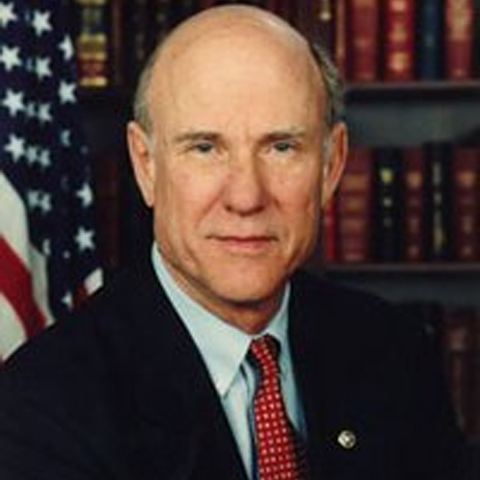
PAT ROBERTS
US SENATOR
Charles Patrick Roberts (born April 20, 1936) is an American politician of the Republican Party serving as the senior United States Senator from Kansas, a position he has held since 1997. Roberts previously served as the Chairman of the Senate Select Committee on Intelligence.
He served as a captain in the U.S. Marine Corps and worked as a newspaper reporter before entering politics in the late 1960s. He was elected to the U.S. House of Representatives in 1980 to succeed 1st District Congressman Keith Sebelius, for whom he had worked. He served eight terms in the House, including one as chairman of the House Agriculture Committee.
Roberts was elected to the U.S. Senate in 1996, and is currently serving his fourth term. On the Intelligence Committee, he was responsible for an investigation into the intelligence failures prior to the 2003 invasion of Iraq which protected the people who manufactured the intelligence.
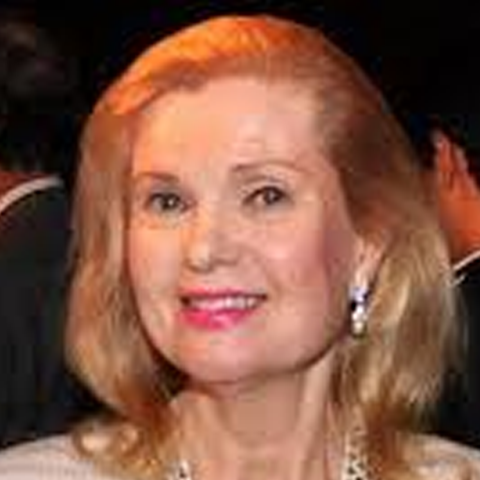
TRICIA NIXON COX
DAUGHTER OF RICHARD NIXON
Sister of Julie Nixon Eisenhower.
Sister-in-Law of David Eisenhower.
She is married to Edward F. Cox and is the mother of Christopher Nixon Cox.
Her husband is now a corporate attorney and the chairperson of the New York Republican State Committee. She serves on the boards of many medical research institutions, as well as the Richard Nixon Foundation at the Nixon Library in California.
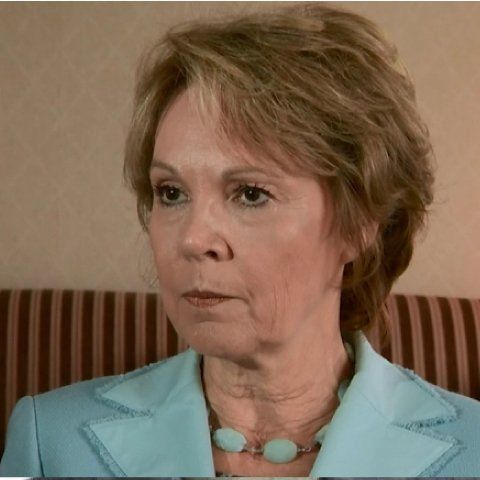
JULIE NIXON EISENHOWER
DAUGHTER OF RICHARD NIXON
(born July 5, 1948) is an American author who is the younger daughter of Richard Nixon, 37th President of the United States, and Pat Nixon, First Lady of the United States, and is the wife of David Eisenhower, grandson of President Eisenhower.
Born in Washington, D.C. while her father was a Congressman, Julie and her elder sister, Patricia Nixon Cox, grew up in the public eye. Her father was elected U.S. Senator from California when she was two; Vice President of the United States when she was four. Her 1968 marriage to David Eisenhower, grandson of President Dwight D. Eisenhower, was seen as a union between two of the most prominent political families in the United States.
Throughout the Nixon administration (1969 to 1974), Julie worked as Assistant Managing Editor of The Saturday Evening Post while holding the unofficial title of "First Daughter." She was widely noted as one of her father's most vocal and active defenders throughout the Nixon administration. Eisenhower was named one of the "Ten Most Admired Women in America" for four years by readers of Good Housekeeping magazine in the 1970s. After her father resigned in disgrace from the White House in 1974, she wrote a biography of her mother, the New York Times best-seller Pat Nixon: The Untold Story. She continues to engage in works that support her parents' legacies.
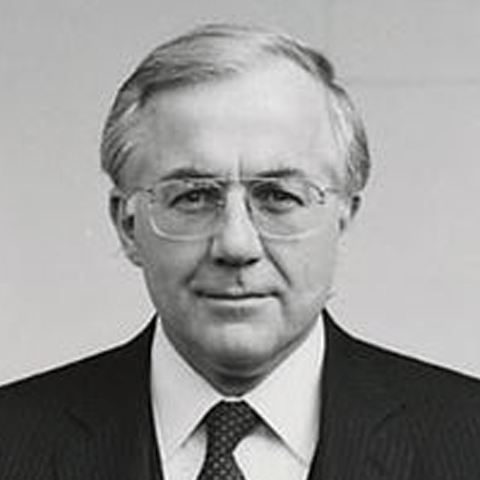
RICHARD V. ALLEN
Creative Director
Hoover Institution: Senior Fellow
Project for the New American Century: Signatory
National Security Adviser (1981-1982)
Richard V. Allen, President Ronald Reagan’s first national security adviser and a member of the Defense Policy Board during the George W. Bush presidency, is a long-standing political figure closely associated with rightist foreign policy circles. Currently a senior fellow at the Hoover Institution, a conservative think tank based at Stanford University that serves as home to Condoleezza Rice and other former Bush administration figures, Allen is a frequent op-ed contributor to various U.S. media outlets, including the right-wing National Review and the neoconservative-dominated Wall Street Journal editorial page.
Allen has been a vociferous critic of President Barack Obama, writing op-eds disparaging Obama on everything from his stance on abortion rights to his foreign policy experience. In an April 2009 op-ed for the New York Times, Allen criticized the University of Notre Dame for its decision to invite Obama to give the 2009 commencement address and bestow upon him an honorary degree. [1]
During the 2008 election campaign, Allen argued that Obama’s foreign policy experience was paltry compared to previous presidential candidates. Writing shortly after Obama departed for a visit to Iraq and Afghanistan to talk with military commanders, Allen argued in a Wall Street Journal op-ed that Obama had demonstrated little foreign policy acumen, which according to Allen was underscored by Obama’s failure to hold hearings on Iraq or Afghanistan as chair of the Senate Subcommittee on European and NATO Affairs. He wrote, “John McCain has ‘hands-on’ military, foreign policy, and national security experience, starting in 1954 as a midshipman at Annapolis, seven years before Barack Obama was born. He has been in Congress since 1982. So, when we hear about Barack Obama’s extensive ‘experience’ in foreign affairs, most of which will be recently acquired in a mere week of travel amid media fanfare, it should be judged in the context of the experience quotients of his predecessor candidates for the presidency. Perhaps Mr. Obama will now decide to hold the very first hearing of his Senate subcommittee; after all, there would be extensive media coverage.” [2]
Earlier, Allen voiced support for the presidential candidacy of Fred Thompson, a former TV star for the show Law & Order and hawkish senator from Tennessee, who Allen compared favorably to Reagan. In an article for National Review Online, Allen wrote, “It is undoubtedly too early to attribute the same comprehensive and plain-spoken vision to Fred Thompson, although his out-of-the-gates speeches and remarks are very reminiscent of Reagan. But if they are there in Thompson they will reveal themselves; the Reagan qualities cannot be feigned or sustained for very long. … Besides, while Reagan approached the 1980 race with no hands-on experience in foreign affairs and national security (though he had fully formed policy positions), Thompson brings broad familiarity with the field, and has been active as chair of the State department’s International Security Advisory Board. He has also been affiliated with the American Enterprise Institute.” [3]
In 2001, Allen was appointed to serve in then-Defense Secretary Donald Rumsfeld’s Defense Policy Board (DPB) Advisory Committee, an unpaid Pentagon advisory post. At the time, the DPB was under the leadership of leading neoconservative figure Richard Perle, who later stepped down because of controversy over alleged conflicts of interest between his government and private work. Allen was just one of several Hoover fellows appointed to the board. Others included Martin Anderson, Newt Gingrich, former California Gov. Pete Wilson, Nobel Prize-winning economist Gary Becker, and Henry S. Rowen. [4]
Before being picked to serve on the board, Allen had participated in various advocacy campaigns promoted by neoconservatives, including being a signatory to various open letters published by the Project for the New American Century (PNAC), a now largely defunct advocacy group that helped build support for the invasion of Iraq and a broad “war on terror.”
Like other PNAC supporters, Allen’s right-wing credentials date back to the 1970s and 1980s, when he was a member of that era’s version of the Committee on the Present Danger and worked in the Reagan and Nixon administrations. Allen served Nixon in various capacities, including as deputy assistant to international economic affairs and as a National Security Council staff member. President Reagan chose Allen to serve as his first national security adviser, a post Allen held until 1982. [5]
Allen’s tenure as NSC was short-lived because of a controversy surrounding gifts given to him and Nancy Reagan. According to scholar Phillip Burch, the day after President Reagan’s inauguration, “Allen came into possession of a $1,000 gratuity paid in cash from a Japanese magazine, intended for Nancy Reagan in exchange for an interview she had given, which money he placed in a White House safe and then reportedly forgot. Also, it was belatedly discovered that around the same time, Allen had accepted three expensive watches as personal gifts from Japanese friends who were high-level governmental consultants. As a result of these disclosures, Allen was forced to leave his NSC post in early 1982.” [6]
Despite his brief stint at Reagan’s NSC, the former president appears to have left a lasting mark on Allen, who frequently compares political figures to the former president. In December 2006, for example, Allen penned an article for the conservative publication Human Events in which he attempted to answer the question, “What would Reagan do?” Regarding the Iraq War, Allen speculates that Reagan would have done a better job than George W. Bush: “At the time of the invasion of Iraq in 2003, I was not so certain that Reagan would have chosen to invade Iraq, even based on the intelligence at hand. It is my conclusion that Reagan would have begun an unmerciful and determined squeeze on Saddam, mustered allied support in that effort, and continued to squeeze until internal events in Iraq were arranged in such a fashion as to rid the country of his evil presence. … A major difference between Reagan and Bush is that Reagan would have actively explained and ‘sold’ the rationale for his actions, and in this respect, the Bush administration is sorely lacking. Reagan knew that a leader must explain carefully and persuasively so that the public will throw its support behind even the most difficult policies.” [7]
Besides his work in support of PNAC and the Committee on the Present Danger, Allen has been actively involved in other elite and/or rightist foreign policy initiatives and organizations. He was the founding chairman of the Heritage Foundation‘s Asian Studies Center in 1983; was a member of a Council on Foreign Relations independent task force on Korea that released the 1998 report “Managing Change on the Korean Peninsula” (Paul Wolfowitz also served on this task force); and has been a member of the Council for National Policy, the secretive right-wing association whose membership has included Edwin Feulner Jr., Ed Meese, and Gary Bauer, among many other high-profile conservative figures. [8]
After the death of Jeane Kirkpatrick, Allen wrote an obituary for the New York Times in which he recounted how the woman who once called herself an “AFL-CIO Democrat” eventually became Reagan’s nominee for UN ambassador. Allen, who introduced Kirkpatrick to Reagan, also recalled: “One important bridge between Ronald Reagan and Democrats like Ms. Kirkpatrick was an organization called the Committee on the Present Danger, of which she and I were among the founders in late 1976.” [9]
Along with his political activities, Allen has had a long career working as a financial consultant, founding the consulting firm Potomac International in the 1970s. This work landed him in several scandals. According to the Washington Post, “It was around [1972] that Allen was paid $10,000 per month for about six months to do consulting work for Howard Cerny, a lawyer for fugitive financier Robert Vesco. Allen, however, was never accused of any involvement in Vesco’s alleged swindling. In 1976, Allen was accused in a Senate hearing of soliciting a $1 million campaign contribution for the Nixon reelection fund from Grumman International, a defense contracting firm, in return for pressure on Japan to buy a Grumman plane. Allen denied the charge by a former Grumman official, and it has never been proved [sic] … On Oct. 30, 1980, Allen resigned from the Reagan campaign because of conflict-of-interest charges reported in the Wall Street Journal. The Journal article said Allen conducted private business negotiations with Japanese companies during his time at the White House in the early ’70s; the article also said that Allen, as a result of his actitivties [sic], claimed the right to benefit from a $120,000 per year account that an associate obtained from Datsun, the Japanese automaker.” [10]
Allen has also served as a senior counselor to consulting firm APCO Worldwide and in May 2003 became a member of its “Iraq Reconstruction Task Force,” which the firm created to “help existing and potential clients navigate the complicated bureaucratic terrain of contracts and subcontracts from the United States government to rebuild Iraq.” [11]

SUSAN EISENHOWER
Creative Director
(born December 31, 1951) is an American consultant, author, and expert on international security, space policy, energy, and relations between the Russian Federation and the United States of America. Susan is President of the Eisenhower Group, Inc. (EGI), a Washington, DC-based consulting firm that provides political, economic, trade and investment advice to Fortune 500 companies and entrepreneurs, with specialism in emerging Russian markets and the aerospace industry.
She is the daughter of John Eisenhower, and the granddaughter of President Dwight D. Eisenhower.
Her daughter is Laura Magdalene Eisenhower.
She is the brother of David Eisenhower, Sister-in-Law of Julie Nixon Eisenhower.
She is currently married to Russian space scientist Roald Sagdeev,formerly the director of the Russian Space Research Institute, Hero of Socialist Labor, and pro-democracy advocate
Maria Butina
In February 2017, Butina met Susan Eisenhower, a granddaughter of President Dwight Eisenhower, who taught a course about the collapse of the Soviet Union at Gettysburg College. “She seemed like a networker,” Eisenhower recalls.
Positions held
Burson-Marsteller member of the senior staff until 1984
Founder of Eisenhower World Affairs Institute, 1983
Center for Political and Strategic Studies, formerly the Center for Post-Soviet Studies, founder and chairman (1991)
President of Eisenhower Group, Inc, 2000
Academic Fellow of the International Peace and Security program of Carnegie Corporation of New York.
Carnegie Endowment for International Peace, trustee (since 2001)
National Academy of Sciences' standing Committee on International Security and Arms Control (CISAC)
Director, Nuclear Threat Initiative
Nitze School of Advanced International Studies, board member
The Atlantic Council, board member
Stonebridge International, board member
American Council on Global Nuclear Competitiveness, member [1]
Advisory Board, Ploughshares Fund
National Advisory Board, Journey Through Hallowed Ground Partnership [1]
Advisory board, Eurasia Center [2]
She is connected to Edward Lozansky via the Eurasia Center.
More on Edward Lozansky here
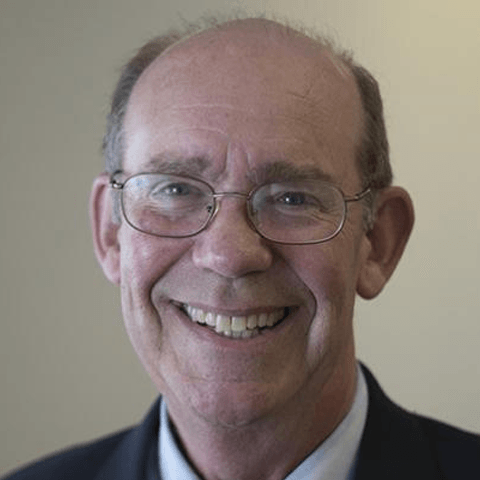
DAVID EISENHOWER
GRANDSON OF DWIGHT D. EISENHOWER
Dwight David Eisenhower II (born March 31, 1948), better known as David Eisenhower is an American author, public policy fellow, professor at the University of Pennsylvania, and eponym of the U.S. Presidential retreat, Camp David. He is the only grandson of the 34th president of the United States, Dwight D. Eisenhower, and the son-in-law of the 37th president of the United States, Richard Nixon.
He is the brother of Susan Eisenhower and brother-in-law of Tricia Nixon Cox.
Eisenhower graduated from Phillips Exeter Academy in 1966. He received his Bachelor of Arts degree in history cum laude from Amherst College in 1970. After college, he served for three years as an officer in the United States Naval Reserve.[2] During this time, he was an officer on the USS Albany in the Mediterranean Sea.[3] He then earned his J.D. degree cum laude from The George Washington University Law School in 1976.[4]
He was at least loosely identified with the Nixon administration, when he accepted a request to attend the funeral of Dan Mitrione in 1970, the operative whose activities in training Uruguayan police in torture techniques, when later publicized, caused profound controversy,[5] although there has been no suggestion that Eisenhower had any knowledge of Mitrione's controversial activities. He is today a teaching adjunct and public policy fellow at the Annenberg School for Communication at the University of Pennsylvania,[6][7] author,[4] and co-chair of the Foreign Policy Research Institute's History Institute for Teachers. From 2001–2003, he was editor of the journal Orbis published by FPRI.[4]
Eisenhower was a finalist for the Pulitzer Prize in history in 1987 for his work Eisenhower At War, 1943-1945—about the Allied leadership during World War II.[4][8]
He is the host of a Public Television series called "The Whole Truth with David Eisenhower," distributed by American Public Television.[9]
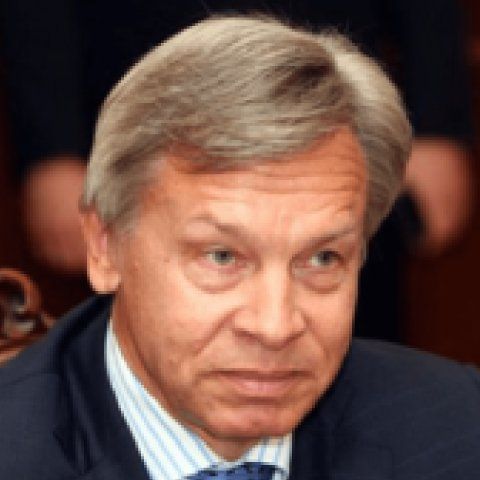
ALEXEY PUSHKOV
RUSSIAN POLITICIAN
Aleksey Konstantinovich Pushkov (Russian: Алексе́й Константи́нович Пушко́в; born 10 August 1954) is a Russian politician, Senator from Perm Krai since 29 September 2016. Former Deputy of the State Duma, former head of the Foreign Affairs Committee in the State Duma, the lower house of the Russian Parliament.[1]
Pushkov was born in 1954 to a family of a Soviet diplomats in the capital of China. His father, Konstantin Mikhailovich Pushkov (born in 1921) was an employee of the Consulate General of the USSR in Beijing. His mother, Margarita Vladimirovna Pushkova (1927–2007) on the other hand, was a translator, and a teacher of the Chinese language. He studied at the Moscow special school #12 in his youth, graduating in 1972. He graduated from the Moscow State Institute of International Relations in 1976 with a degree in international relations before getting a job at the United Nations mission in Geneva. Between 1988-1991, he worked as the speechwriter for Soviet President Mikhail Gorbachev. In 1991-1995, he was deputy editor-in-chief of the Moscow News Weekly in international affairs, editing the English, French, German and Spanish editions of the newspaper. From 2008 to 2011, Pushkov was the Director of the Institute of Contemporary International Studies at the Diplomatic Academy of Russia.[2] He was elected to the Duma on 4 December 2011 on the United Russia Party list.
Pushkov is a Professor at the Moscow State Institute of International Relations. He has the title of honoris causa from the Moscow University for the Humanities, the Russian-Armenian State University (Yerevan), and the Azerbaijan University of Languages.
Since 1998, Pushkov has been the lead author of the information and analytical program, Postscriptum, on TV channel TV Tsentr.[3]
In 2014, Pushkov suggested that Petro Poroshenko dismiss Andrii Deshchytsia, who was accused by Sergei Lavrov of calling Vladimir Putin a dickhead during the rioting near the Russian Embassy in Ukraine. He also said that if this issue is not resolved, Russia will have the right to cut down gas supplies to the neighboring nation.[4]
Pushkov is fluent in French and English.[5]
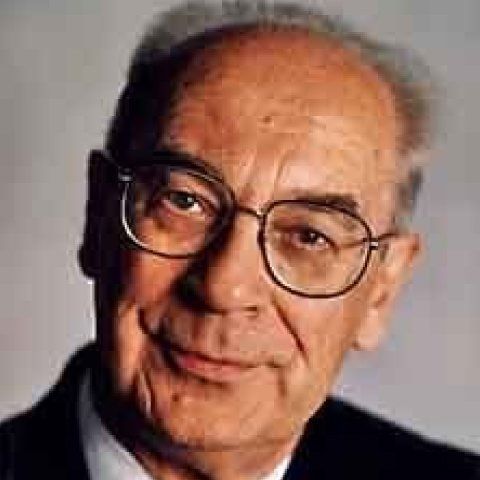
YULI VORONTSOV
Creative Director
Yuli Mikhailovich Vorontsov (also Yuliy Vorontsov; Russian: Ю́лий Миха́йлович Воронцо́в) (October 7, 1929, Leningrad – December 12, 2007, Moscow) was a Russian and Soviet diplomat, President of International Centre of the Roerichs (Moscow).[1] In the mid-1970s he was Chargé d'Affaires at the Soviet embassy in Washington under Ambassador Dobrynin.[2] He was then Ambassador to India (1978-1983) and France (1983-1986).[2] He returned to Moscow to be the first deputy foreign minister (1986-1990) and participated in arms reduction talks with the United States.[1][2] In 1988-1989, he was simultaneously the Ambassador to Afghanistan as Soviet troops withdrew from the country.[1] He then served as the last Soviet ambassador to United Nations between 1990 and 1991 and as the first Russian Permanent Representative to the UN from 1991 to 1994.[1] After this he served as the Russian ambassador to the United States from 1994 to 1998.[1][2] In 2000 Vorontsov was chosen as the high-level coordinator for issues related to a paragraph of United Nations Security Council Resolution 1284 which once again required Iraq to face "its obligations regarding the repatriation or return of all Kuwaiti and third country nationals or their remains, [and] the return of all Kuwaiti property [...] seized by Iraq" (during the invasion of Kuwait).[2][3]
Honours and awards
Order of Merit for the Fatherland, 3rd class
Order of Honour
Order of Lenin
Order of the October Revolution
Order of the Red Banner of Labour, twice
Order of the Badge of Honour
Honoured Worker of the Diplomatic Service of the Russian Federation
Honorary Worker of the Ministry of Foreign Affairs of the Russian Federation
Medal of Honour "for participation in United Nations" (United Nations Association of Russia)
"Blessing" (Patriarch of Moscow and All Russia) for his contribution to the revival of the Orthodox Church and the strengthening of Russian-American relations
Awards of the International Roerich Centre - Commemorative Medals of Nicholas Roerich, Helena Roerich, George de Roerich, Svetoslav Roerich and a silver medal inscribed "J. Vorontsov 75 years ", presented to Vorontsov in his Jubilee in 2004 in recognition of his enormous contribution to the foundation and development of the Museum of Nicholas Roerich and the International Centre
Padma Bhushan ("Order of the Lotus") (May 2008, posthumously) - for its commitment to strengthening bilateral relations at work not only in India but also in other positions in the Ministry for Foreign Affairs and the Ministry of Foreign Affairs[4]
Order of the "Pride of Russia" (30 June 2008, posthumously)
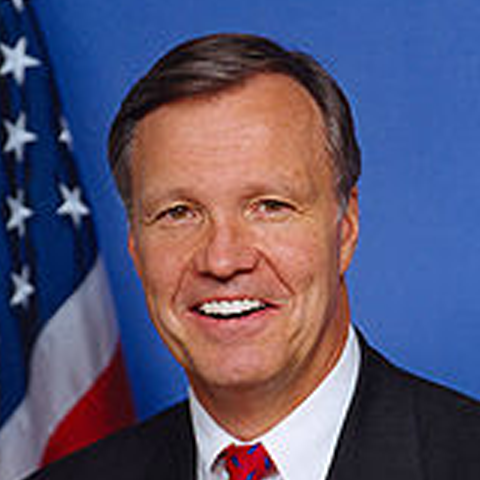
CHRISTOPHER COX
Creative Director
Christopher Cox, Republican Representative from California, was nominated June 3, 2005, by President George W. Bush as Chairman of the Securities and Exchange Commission. Cox would replace William H. Donaldson, who resigned June 1, 2005. [1]
Director of the National Endowment for Democracy.
Biographical Data
According to Representative Christopher Cox's Congressional biography [2], he is the "highest-ranking Californian in the Majority Leadership in Congress. As Chairman of the House Policy Committee, elected by the full majority Conference in the House for five consecutive terms, he is the fourth-ranking member of the leadership behind the Speaker.
"On January 7, 2003, J. Dennis Hastert, the Speaker of the House, appointed Chairman Cox to head the new Homeland Security Committee in the House."
Cox is also a member of: House Leadership Steering Committee (makes Committee assignments in the House); Committee on Energy and Commerce; Energy and Commerce Subcommittee on Telecommunications; and Energy and Commerce Subcommittee on Energy and Air Quality.
"Christopher Cox, who was then a White House counsel to President Ronald Reagan, ... 1986-1988,... served as Senior Associate Counsel to President Reagan, advising the President on a broad range of policy matters - including writing President Reagan's Budget Process Reform Act (which Rep. Cox later introduced in Congress, and which received its first-ever floor vote in 2000). He also served as an advisor to the President on judicial selections, including the nomination and confirmation of three Supreme Court Justices.
"Prior to his White House career, Rep. Cox, along with his father, a retired publisher, founded a company that provided a complete English translation of the former Soviet Union's leading daily paper, Pravda. For four years, beginning in 1984, their firm, which had no relationship with the Soviet Union, offered a rare glimpse of Soviet propaganda designed for the Russians themselves. The translations were used by the CIA, the FBI, U.S. military intelligence, and colleges and universities in 26 countries throughout the world.
"From 1978 to 1986, he specialized in venture capital and corporate finance with the international law firm of Latham & Watkins, where he was the partner in charge of the Corporate Department in Orange County and a member of the firm's national management.
"In 1982-83, Rep. Cox took a leave of absence from Latham & Watkins to teach federal income tax at Harvard Business School.
"In 1977-78, he was law clerk to U.S. Court of Appeals Judge Herbert Choy, the first Asian-American federal appellate judge in America. The preceding year, he graduated simultaneously from Harvard Business School and the Harvard Law School, with honors, where for two years he served as an Editor of the Harvard Law Review. He graduated magna cum laude from the University of Southern California in 1973, after completing a three-year accelerated course."
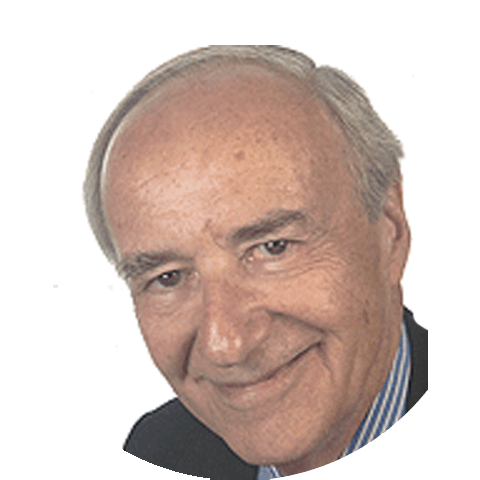
PETER R. ROSENBLATT
Creative Director
"Peter R. Rosenblatt has practiced law in New York and Washington, DC since his graduation from Yale College and Yale Law School and is currently a member of the Washington international law firm of Heller & Rosenblatt. After service as an officer in the US Army he was appointed an Assistant District Attorney of New York County and then worked at a large New York law firm.
"In 1966 he became a member of President Lyndon Johnson's White House staff in an office coordinating U.S. non-military and counterinsurgency activities in Vietnam. From 1977 to 1981 he served as President Carter's Ambassador to the Negotiations on the Future Political Status of the Trust Territory of the Pacific Islands which established the new successor governments of Palau, the Marshall Islands and the Federated States of Micronesia. He was an officer of the U.S. National Committee for Pacific Economic Cooperation and serves on the Council on Foreign Relations' Board Committee on Washington Programs, the Board of Governors of Haifa (Israel) University and on the Boards of Advisors of The Jewish Institute on National Security Affairs, of which he was a founder, and of the Nixon Institute in Washington, D.C.
"Mr. Rosenblatt was an advisor on foreign policy to the Kerry, Lieberman, Gore, Clinton and Muskie presidential campaigns, serves in the capacity in the Obama campaign and served on several official Democratic party foreign policy committees, the Committee on the Present Danger and as President of the Coalition for a Democratic Majority. He has served as a vice president of the American Jewish Committee, as president of its Washington, DC chapter, chairman of AJC's Koppelman Institute on American Jewish Israeli Relations and now chairs AJC's Strategic Policy Group. He was a founding board member of MediSense, Inc. a startup biomedical instrument manufacturer until its 1996 sale to Abbott Laboratories.
"He is married to the former Naomi Harris of Haifa, Israel and they have three children, Therese Sonenshine, Daniel and David, and six grandchildren." [2]
Honorary Board member, Civilitas Foundation
Member, American Committee for Peace in Chechnya
Council Member, US Asia Pacific Council [3]
National Council (former member), Prodemca
Affiliations
Coalition for a Democratic Majority
Committee on the Present Danger
Jewish Institute for National Security Affairs
Euston Manifesto United States
Friends of the Democratic Center in Central America
American Committee for Peace in the Caucasus
American Jewish Committee delegation
In 2006, the American Jewish Committee (AJC) reported that Rosenblatt took part in a vist to London in 'an effort to strengthen AJC’s ties to British Jewry'
The report states that:
'AJC President E Robert Goodkind led a leadership delegation to London to meet with the Board of Deputies of British Jews, the main community organizing body for British Jews, as well as with the Community Service Trust and the newly formed Jewish Leadership Council. The group also met with British Chief Rabbi Jonathan Sacks, longtime Jewish community leaders Lord Greville Janner and Sir Trevor Chinn, and with leadership from the Reform, Liberal and Conservative Masorti movements. In addition, the group held meetings with those Members of Parliament who initiated a serious parliamentary investigation of anti-Semitism, and with younger leaders of Conservative Friends of Israel and Labour Friends of Israel. AJC Board members Stanley Bergman and Peter Rosenblatt joined Goodkind on the mission[1].
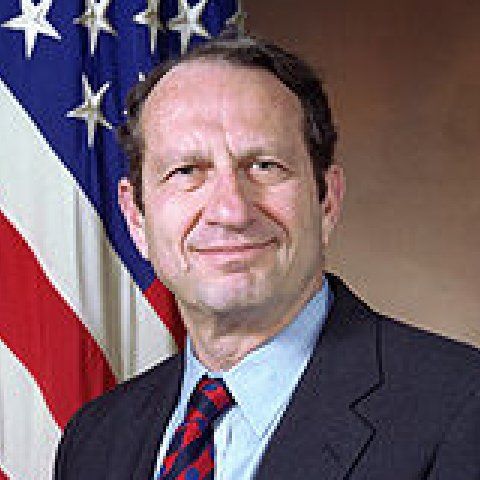
JOHN DEUTCH
CIA DIRECTOR
"Dr. Deutch has been a director of the Raytheon Company since 1998 ... Deutch served as Director of the United States Central Intelligence Agency (1995-1996; the Deputy Secretary of Defense (1994-1995); and the Undersecretary of Defense, Acquisition and Technology (1993-1994). He was Provost (1985-1990) and Chairman of the Department of Chemistry (1982-1985) at MIT."
Dr. Deutch has also served as Acting Assistant Secretary for Energy Technology (1979) and Undersecretary (1979-80) in the U.S. Department of Energy. [3]
"In addition, John Deutch has served on the President's Nuclear Safety Oversight Committee (1980-81); the President's Commission on Strategic Forces (PCSF) (1983); the White House Science Council (WHSC) (1985-89); the President's Foreign Intelligence Advisory Board (PFIAB) (1990-93); the President's Commission on Aviation Safety and Security (PCASS) (1996); and the President's Commission on Reducing and Protecting Government Secrecy (PCRPGS) (1996). He served as a member of the President's Committee of Advisors on Science and Technology (PCAST) (1997) and was the Chairman of the President's Commission to Assess the Organization of the Federal Government to Combat the Proliferation of Weapons of Mass Destruction (PCAOFGCPWMD) (1998). [4]
"He is currently on the Board of Directors of Citigroup Inc., CMS Energy Corporation, Cummins Engine Company, Inc., and Schlumberger Ltd. He is Affiliated with the French American Foundation, the Council on Foreign Relations; Resources for the Future, and the Urban Institute. He is now director of the Gorbachev Foundation of North America." Deutch is also a member of the Board of the Belfer Center for Science and International Affairs at the John F. Kennedy School of Government at Harvard University. [5]
"Dr. Deutch has published over 120 technical publications in physical chemistry, as well as numerous publications on technology, international security and public policy issues." [6]
Deutch has also served as chairman of a DOE advisory committee on natural gas, was co-author of a 2011 MIT report promoting natural gas, and is director of Cheniere Energy, the only company by 2012 to receive federal permits for gas export.[1]
In July 1990, when Deutch was appointed to the PFIAB, he was also serving as a member of the Defense Policy Board, the Science Advisory Board of the National Security Agency, and had been a member of the Defense Science Board since 1975." [7]
Director, Belfer Center
Advisory Council, Nixon Center
Advisory Board, IntelligentMDx [2]
Member, Aspen Institute / Aspen Strategy Group
Senior Fellow, Gorbachev Foundation of North America [3]
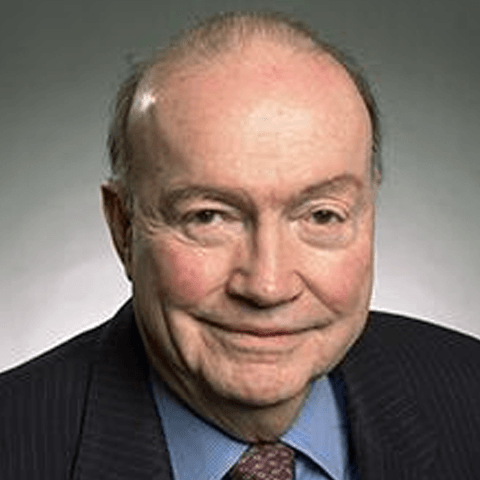
DAVID ABSHIRE
David M. Abshire is President of the Center for the Study of the Presidency (CSP) in Washington, D.C. He also is the President of the Richard Lounsbery Foundation of New York, which gives grants in the fields of science and education and Vice Chairman of the Board of the Center for Strategic and International Studies (CSIS) in Washington, D.C., which he co-founded with Admiral Arleigh Burke in 1962, and served as its chief executive for many years. In 2002, he led in the establishment of the Abshire-Inamori Leadership Academy at CSIS. He recently served as one of the four co-convenors of the 2006 Congressionally-mandated Baker-Hamilton Iraq Study Group.
Dr. Abshire is a 1951 graduate of West Point, where in 1996 he received the Distinguished Graduate Award. He later received his doctorate with Honors (Gold Key Society) in History from Georgetown University. For many years he was an adjunct professor at its School of Foreign Service, and initially, CSIS was affiliated with the university. In 2006, Georgetown University bestowed on him an honorary degree, Doctor of Humane Letters, honoris causa, before a special convocation where he spoke about the Character Crisis in America.
Dr. Abshire served as Assistant Secretary of State for Congressional Relations from 1970-1973 and worked out the plan that saved Radio Free Europe and Radio Liberty from extinction. In 1974, he was asked to become the first chairman of the Board for International Broadcasting. He was a member of the Murphy Commission on the Organization of the Government, the President's Foreign Intelligence Advisory Board, and the President's Task Force on U.S. Government International Broadcasting. During the transition of government in 1980, Dr. Abshire was asked by President-elect Reagan to head the National Security Group, which included the State and Defense Departments, the U.S. Information Agency, and the Central Intelligence Agency. He has also served on the Advisory Board of the Naval War College and on the Executive Panel of the Chief of Naval Operations.
More recently in 1983-1987, he was Ambassador to NATO where, in reaction to the threat posed by Soviet SS-20 missiles, he was the United States point man in Europe for deployment of Pershing and Cruise missiles. It was this NATO success that convinced the Soviets to sign the historic INF Treaty and withdraw their missiles. Ambassador Abshire initiated a new conventional defense improvement effort so that NATO would not have to rely heavily on nuclear weapons. For this, he was given the highest Defense Department civilian award-its Distinguished Public Service Medal.
In December 1986, at the depths of the Iran-Contra crisis, he was called by President Reagan to leave NATO to serve in his Cabinet and help restore confidence in the Presidency. He coordinated the Tower Board, the Independent Counsel, and the Congressional investigation committees, and often met with the President alone.
Dr. Abshire is a vice chair of the Council of American Ambassadors, a member of the Advisory Board of the School of Public Service at St. Albans School, a Trustee of the George C. Marshall Foundation, a member of the Council on Competitiveness, the Council on Foreign Relations, the Fondation Paul-Henri Spaak (Brussels), and the International Institute for Strategic Studies (London). He also is the co-convenor and a founding member of the Trinity National Leadership Roundtable. In 2003, he served on the Advisory Group for Public Diplomacy mandated by Congress. In 2005, he chaired a panel for the Homeland Security Advisory Board for developing for the maritime domain a layered defense against weapons of mass effect.
In the corporate world, from 1987-1996, he has served on the Board of Procter and Gamble Company and was the first chairman of its Public Policy Committee. He also served on the Board of Directors of the Ogden Corporation and on the Advisory Board of BP America.
Dr. Abshire was born in Chattanooga, Tennessee in 1926. He graduated from Baylor Preparatory School in 1944, and subsequently for six years served as a Trustee. He later received his bachelor's degree from the U.S. Military Academy at West Point in 1951. In the Korean War, he served as a platoon leader, company commander, and a division intelligence officer. He received the Bronze Star with Oak Leaf Cluster with V for Valor, Commendation Ribbon with medal pendant, and Combat Infantry Badge. In addition to Georgetown University, he received three honorary degrees from other institutions-a Doctor of Humane Letters from Virginia Theological Seminary in 1992, a Doctor of Civil Law, honoris causa, from the University of the South in 1994, and a Doctor of Letters from Washington College in 2006.
He has also received the John Carroll Award for outstanding service by a Georgetown University alumnus; the 1994 U.S. Military Academy's Castle Award; the Gold Medal of the Sons of the American Revolution; the Order of the Crown (Belgium); Commander de l'Ordre de Leopold (Belgium); the Medal of the President of the Italian Republic, Senate, Parliament and Government; Grand Official of the Order of the Republic of Italy; Order of Diplomatic Service Merit Heung-In Medal (Korea); the insignia of the Commander, First Class, Order of the Lion of Finland; in 1999 the Order of the Liberator (Argentina); and in May 2001, the Order of the Sacred Treasure Gold and Silver Star (Japan). In addition to the Department of Defense Medal for Distinguished Public Service, he was awarded the Presidential Citizens Medal.
Dr. Abshire is the author of seven books: The South Rejects a Prophet, 1967; International Broadcasting: A New Dimension of Western Diplomacy, 1976; Foreign Policy Makers: President vs. Congress, 1979; Preventing World War III: A Realistic Grand Strategy, 1988; Putting America’s House in Order: The Nation as a Family, with Brock Brower; Saving the Reagan Presidency: Trust Is the Coin of the Realm, 2005; and A Call to Greatness: Challenging Our Next President. He also wrote an essay for the Fetzer Institute’s “Deepening the American Dream” series titled The Grace and Power of Civility: Commitment and Tolerance in the American Tradition, 2004. He is editor of Triumphs and Tragedies of the Modern Presidency: Seventy-Six Case Studies on Presidential Leadership , 2002, and author of CSP publications: The Character of George Washington, 1999; Lessons For The 21st Century: Vulnerability and Surprise December 7, 1941 and September 11, 2001, 2002; and The character of George Marshall, 2005.
He is contributing editor to Vietnam Legacy, 1976; Détente: Cold War Strategies in Transition, 1964; and The Global Economy, 1990. He has also co-edited National Security, 1963, and edited The Growing Power of Congress, 1981. He is founding editor of The Washington Quarterly.
Dr. Abshire is a member of the Alfalfa Club, Alibi Club, Cosmos Club, Metropolitan Club, and an honorary member of the University Club. Additionally, he was a co-chair of the New York Opera Ball, which honored Argentina.
He is married to the former Carolyn Sample whose stepfather, Admiral George W. Anderson, was a former Chief of Naval Operations and Ambassador to Portugal. Her father, Rear Admiral Dodge Sample, was lost at the end of the Pacific War. The Abshires have five children.[1]
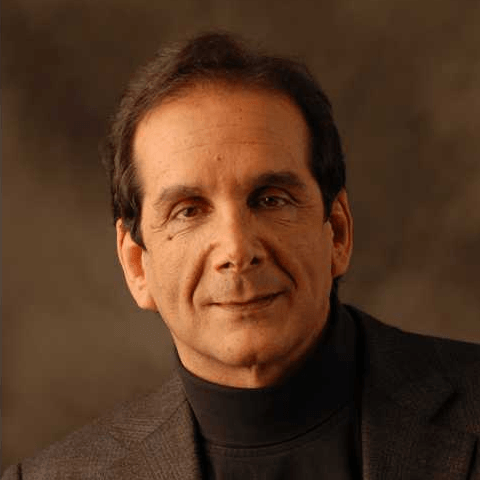
CHARLES KRAUTHAMMER
Creative Director
Krauthammer was born on March 13, 1950, in the New York City borough[10] of Manhattan.[5] His father, Shulim Krauthammer (November 23, 1904 – June 1987),[citation needed] was from Bolekhiv, Ukraine (then the Austro-Hungarian Empire), and later became a naturalized citizen of France.[11][12] His mother, Thea (Horowitz), was from Antwerp, Belgium.[13][14] The Krauthammer family was a French-speaking household.[11] When he was 5, the Krauthammers moved to Montreal. Through the school year, they resided in Montreal and spent the summers in Long Beach, New York.[15][16] Both of his parents were Orthodox Jews, and he graduated from Herzliah High School.[11]
Krauthammer attended McGill University in Montreal, graduating in 1970 with first-class honours in economics and political science.[17] At that time, McGill University was a hotbed of radical sentiment, something that Krauthammer said influenced his dislike of political extremism. "I became very acutely aware of the dangers, the hypocrisies, and sort of the extremism of the political extremes. And it cleansed me very early in my political evolution of any romanticism." He later said: "I detested the extreme Left and extreme Right, and found myself somewhere in the middle."[18] The following year, after graduating from McGill, he studied as a Commonwealth Scholar in politics at Balliol College, Oxford, before returning to the United States to attend medical school at Harvard.[citation needed]
Krauthammer was injured in a diving board accident during his first year of medical school. He sustained injuries that left him paralyzed from the waist down and required him to be hospitalized for 14 months.[5][6][19] He remained with his Harvard Medical School class during his hospitalization, graduating in 1975. From 1975 through 1978, Krauthammer was a resident in psychiatry at Massachusetts General Hospital, serving as chief resident his final year. During his time as chief resident, he noted a variant of manic depression (bipolar disorder) that he identified and named secondary mania. He published his findings in the Archives of General Psychiatry.[20] He also co-authored a path-finding study on the epidemiology of mania.[21]
In 1978, Krauthammer relocated to Washington, D.C., to direct planning in psychiatric research under the Carter administration.[3] He began contributing articles about politics to The New Republic and, in 1980, served as a speechwriter to Vice President Walter Mondale.
Career as columnist and political commentator
In 1979, Krauthammer joined The New Republic as both a writer and editor.[3][2] In 1983, he began writing essays for Time magazine, including one on the Reagan Doctrine, which first brought him national acclaim as a writer.[23] Krauthammer began writing regular editorials for The Washington Post in 1985 and became a nationally syndicated columnist. Krauthammer coined and developed the term Reagan Doctrine in 1985, and he defined the U.S. role as sole superpower in his essay "The Unipolar Moment", published shortly after the fall of the Berlin Wall in 1989.[24]
In 1990, Krauthammer became a panelist for the weekly PBS political roundtable Inside Washington, remaining with the show until it ceased production in December 2013. Krauthammer also appeared on Fox News Channel as a contributor for many years.[citation needed]
Krauthammer's 2004 speech "Democratic Realism", which was delivered to the American Enterprise Institute when Krauthammer won the Irving Kristol Award, set out a framework for tackling the post-9/11 world, focusing on the promotion of democracy in the Middle East.[25]
Awards and accolades
Krauthammer's New Republic essays won him the "National Magazine Award for Essays and Criticism".[3] The weekly column he began writing for The Washington Post in 1985 won him the Pulitzer Prize for commentary in 1987.[27] On June 14 1993, he was awarded the Honorary degree of Doctor of Letters from McGill University.[28]
In 2006, the Financial Times named Krauthammer the most influential commentator in America,[23] stating that "Krauthammer has influenced US foreign policy for more than two decades."
In 2009, Politico columnist Ben Smith wrote that Krauthammer had "emerged in the Age of Obama as a central conservative voice, the kind of leader of the opposition that economist and New York Times columnist Paul Krugman represented for the left during the Bush years: a coherent, sophisticated and implacable critic of the new president."[29] In 2010, The New York Times columnist David Brooks said Krauthammer was "the most important conservative columnist."[30] In 2011, former congressman and MSNBC host Joe Scarborough called him "without a doubt the most powerful force in American conservatism. He has [been] for two, three, four years."[31]
In a December 2010, press conference, former president Bill Clinton – a Democrat – called Krauthammer "a brilliant man".[32] Krauthammer responded, tongue-in-cheek, that "my career is done" and "I'm toast."[33]
On September 26, 2013, Krauthammer received the William F. Buckley Award for Media Excellence.[34]
Krauthammer's other awards included the People for the American Way's First Amendment Award, the Champion Media Award for Economic Understanding from Amos Tuck School of Business Administration,[35] the first annual Bradley Prize, the 2002 "Mightier Pen" award from the Center for Security Policy,[36][37] the 2004 Irving Kristol Award,[38][25] and the 2009 Eric Breindel Award for Excellence in Opinion Journalism,[39] an annual award given by the Eric Breindel Foundation.
Energy and global warming
Krauthammer was a longtime advocate of radically higher energy taxes to induce conservation.[51][52][53][54]
Krauthammer wrote in The Washington Post on February 20, 2014, "I'm not a global warming believer. I'm not a global warming denier." Objecting to declaring global warming settled science, he contended that much that is believed to be settled turns out not to be so.[55]
Foreign policy
Krauthammer first gained attention in the mid-1980s when he first used the phrase "Reagan Doctrine" in his Time magazine column.[56] The phrase was a reference to the American foreign policy of supporting anti-communist insurgencies around the globe (most notably Nicaragua, Angola, and Afghanistan) as a response to the Brezhnev Doctrine and reflected a U.S. foreign policy that went beyond containment of the Soviet Union to rollback of recent Soviet influence in the Third World. The policy, which was strongly supported by Heritage Foundation foreign policy analysts and other conservatives, was ultimately embraced by Reagan's senior national security and foreign policy officials. Krauthammer's description of it as the "Reagan Doctrine" has since endured.[citation needed]
In "The Poverty of Realism" (New Republic, February 17, 1986), he asserted:
that the end of American foreign policy is not just the security of the United States, but what John F. Kennedy called "the success of liberty." That means, first, defending the community of democratic nations (the repository of the liberal idea) and second, encouraging the establishment of new liberal policies at the frontier, most especially in the Third World.
The foreign policy, he argued, should be both "universal in aspiration" and "prudent in application", thus combining American idealism and realism. Over the next 20 years these ideas developed into what is now called "democratic realism."[citation needed]
Following the Cold War, Krauthammer penned an article entitled "The Unipolar Moment".[24] Krauthammer coined the term unipolarity to describe the world structure that was emerging with the fall of the Soviet Union.[citation needed] Krauthammer predicted that the bipolar world of the Cold War would give way not to a multipolar world in which the U.S. was one of many centers of power, but a unipolar world dominated by the United States with a power gap between the most powerful state and the second most powerful state that would exceed any other in history. He also suggested that American hegemony would inevitably exist for only a historical "moment" lasting at most three or four decades.[citation needed]
Hegemony gave the United States the capacity and responsibility to act unilaterally if necessary, Krauthammer argued. Throughout the 1990s, however, he was circumspect about how that power ought to be used. He split from his neoconservative colleagues who were arguing for an interventionist policy of "American greatness". Krauthammer wrote that in the absence of a global existential threat, the United States should stay out of "teacup wars" in failed states, and instead adopt a "dry powder" foreign policy of nonintervention and readiness.[57] Krauthammer opposed purely "humanitarian intervention" (with the exception of overt genocide). While he supported the 1991 Gulf War on the grounds of both humanitarianism and strategic necessity (preventing Saddam Hussein from gaining control of the Persian Gulf and its resources), he opposed American intervention in the Yugoslav Wars on the grounds that America should not be committing the lives of its soldiers to purely humanitarian missions in which there is no American national interest at stake.[58]
Krauthammer's major 2004 monograph on foreign policy, "Democratic Realism: An American Foreign Policy for a Unipolar World",[57] was critical both of the neoconservative Bush doctrine for being too expansive and utopian, and of foreign policy "realism" for being too narrow and immoral; instead, he proposed an alternative he called "Democratic Realism".
In a 2005 speech later published in Commentary magazine, Krauthammer called neoconservatism "a governing ideology whose time has come." He noted that the original "fathers of neoconservatism" were "former liberals or leftists." More recently, they have been joined by "realists, newly mugged by reality" such as Condoleezza Rice, Richard Cheney, and George W. Bush, who "have given weight to neoconservatism, making it more diverse and, given the newcomers' past experience, more mature."[citation needed]
In a 2008 column entitled "Charlie Gibson's Gaffe", Krauthammer elaborated on the changing meanings of the Bush Doctrine in light of Gibson's questioning of Republican vice-presidential candidate Sarah Palin regarding what exactly the Bush Doctrine was, which resulted in criticism of Palin's response. Krauthammer states that the phrase originally referred to "the unilateralism that characterized the pre-9/11 first year of the Bush administration," but elaborates, "There is no single meaning of the Bush doctrine. In fact, there have been four distinct meanings, each one succeeding another over the eight years of this administration."[59]
Israel
Krauthammer strongly opposed the Oslo accords and said that Palestinian Liberation Organization leader Yasir Arafat would use the foothold it gave him in the West Bank and the Gaza Strip to continue the war against Israel that he had ostensibly renounced in the Israel–Palestine Liberation Organization letters of recognition. In a July 2006 essay in Time, Krauthammer wrote that the Israeli–Palestinian conflict was fundamentally defined by the Palestinians' unwillingness to accept compromise.[60]
During the 2006 Lebanon War, Krauthammer wrote a column, "Let Israel Win the War": "What other country, when attacked in an unprovoked aggression across a recognized international frontier, is then put on a countdown clock by the world, given a limited time window in which to fight back, regardless of whether it has restored its own security?"[61] He later criticized Israeli prime minister Ehud Olmert's conduct, arguing that Olmert "has provided unsteady and uncertain leadership. Foolishly relying on air power alone, he denied his generals the ground offensive they wanted, only to reverse himself later."[62]
Krauthammer supported a two-state solution to the conflict. Unlike many conservatives, he supported Israel's Gaza withdrawal as a step toward rationalizing the frontiers between Israel and a future Palestinian state. He believed a security barrier between the two states' final borders will be an important element of any lasting peace.[63]
When Richard Goldstone retracted the claim 1 1/2 years after the issuance of the UN report on the 2008 Gaza war that Israel intentionally killed Palestinian civilians,[64] including children, Krauthammer strongly criticized Goldstone, saying that "this weasel-y excuse-laden retraction is too little and too late" and called "the original report a blood libel ranking with the libels of the 19th century in which Jews were accused of ritually slaughtering children in order to use the blood in rituals." Krauthammer thought that Goldstone "should spend the rest of his life undoing the damage and changing and retracting that report."[65]
9/11, Iraq, and the War on Terror
Krauthammer laid out the underlying principle of strategic necessity restraining democratic idealism in his controversial 2004 Kristol Award Lecture: "We will support democracy everywhere, but we will commit blood and treasure only in places where there is a strategic necessity—meaning, places central to the larger war against the existential enemy, the enemy that poses a global mortal threat to freedom."[57]
The 9/11 attacks, Krauthammer wrote, made clear the new existential threat and the necessity for a new interventionism. On September 12, 2001, he wrote that, if the suspicion that bin Laden was behind the attack proved correct, the United States had no choice but to go to war in Afghanistan.[66] He supported the Second Iraq War on the "realist" grounds of the strategic threat the Saddam regime posed to the region as UN sanctions were eroding and of his alleged weapons of mass destruction and on the "idealist" grounds that a self-sustaining democracy in Iraq would be a first step toward changing the poisonous political culture of tyranny, intolerance, and religious fanaticism in the Arab world that had incubated the anti-American extremism from which 9/11 emerged.[citation needed]
In October 2002, he presented what he believed were the primary arguments for and against the war, writing, "Hawks favor war on the grounds that Saddam Hussein is reckless, tyrannical, and instinctively aggressive, and that if he comes into possession of nuclear weapons in addition to the weapons of mass destruction he already has, he is likely to use them or share them with terrorists. The threat of mass death on a scale never before seen residing in the hands of an unstable madman is intolerable—and must be preempted. Doves oppose war on the grounds that the risks exceed the gains. War with Iraq could be very costly, possibly degenerating into urban warfare."
He continued: "I happen to believe that the preemption school is correct, that the risks of allowing Saddam Hussein to acquire his weapons will only grow with time. Nonetheless, I can both understand and respect those few Democrats who make the principled argument against war with Iraq on the grounds of deterrence, believing that safety lies in reliance on a proven (if perilous) balance of terror rather than the risky innovation of forcible disarmament by preemption."[67]
On the eve of the invasion, Krauthammer wrote, "Reformation and reconstruction of an alien culture are a daunting task. Risky and, yes, arrogant."[68] In February 2003, Krauthammer cautioned that "it may yet fail. But we cannot afford not to try. There is not a single, remotely plausible, alternative strategy for attacking the monster behind 9/11. It's not Osama bin Laden; it is the cauldron of political oppression, religious intolerance, and social ruin in the Arab-Islamic world—oppression transmuted and deflected by regimes with no legitimacy into virulent, murderous anti-Americanism."[57] Krauthammer in 2003 wrote that the reconstruction of Iraq would provide many benefits for the Iraqi people, once the political and economic infrastructure destroyed by Saddam was restored: "With its oil, its urbanized middle class, its educated population, its essential modernity, Iraq has a future. In two decades Saddam Hussein reduced its GDP by 75 percent. Once its political and industrial infrastructures are reestablished, Iraq's potential for rebound, indeed for explosive growth, is unlimited."[69]
On April 22, 2003, Krauthammer predicted that he would have a "credibility problem" if weapons of mass destruction were not found in Iraq within the next five months.[70]
In a speech to the Foreign Policy Association in Philadelphia, he argued that the beginnings of democratization in the Arab world had been met in 2006 with a "fierce counterattack" by radical Islamist forces in Lebanon, Palestine, and especially Iraq, which witnessed a major intensification in sectarian warfare.[71] In late 2006 and 2007, he was one of the few commentators to support the troop surge in Iraq.[72][73]
In 2009, Krauthammer argued that the use of torture against enemy combatants was impermissible except in two contexts: (a) when "[an] innocent's life is at stake," "[the] bad guy you have captured possesses information that could save this life, [and he] refuses to divulge"; and (b) when torture may lead to "the extraction of information from a high-value enemy in possession of high-value information likely to save lives".[74][75][76][77]
Ideology
Meg Greenfield, editorial page editor for The Washington Post who edited Krauthammer's columns for 15 years, called his weekly column "independent and hard to peg politically. It's a very tough column. There's no 'trendy' in it. You never know what is going to happen next."[16] Hendrik Hertzberg, also a former colleague of Krauthammer while they worked at The New Republic in the 1980s, said that when the two first met in 1978, Krauthammer was "70 percent Mondale liberal, 30 percent 'Scoop Jackson Democrat,' that is, hard-line on Israel and relations with the Soviet Union"; in the mid-1980s, he was still "50–50: fairly liberal on economic and social questions but a full-bore foreign-policy neoconservative." Hertzberg in 2009 called Krauthammer a "pretty solid 90–10 Republican."[78] Krauthammer was described by some as having been a conservative.[79][80]
Presidential elections
A few days before the 2012 United States presidential election, Krauthammer predicted it would be "very close" with Republican candidate Mitt Romney winning the "popular [vote] by, I think, about half a point, Electoral College probably a very narrow margin."[81] Although admitting his incorrect prediction, Krauthammer maintained, "Obama won but had no mandate. He won by going very small, very negative."[82]
Before the 2016 presidential election, Krauthammer stated that "I will not vote for Hillary Clinton, but, as I’ve explained in my columns, I could never vote for Donald Trump".[83]
In July 2017 following the release by Donald Trump Jr. of the email chain about the Trump Tower meeting on June 9, 2016, Krauthammer opined that even bungled collusion is still collusion.[84][85]
Religion
Krauthammer received a rigorous Jewish education. He attended a school where half the day was devoted to secular studies and half the day was devoted to religious education conducted in Hebrew. By the time he graduated from high school at the age of 16, Krauthammer was able to write philosophical essays in Hebrew. His father demanded that he learn Talmud; in addition to his school's required Talmud studies, Krauthammer took extra Talmud classes three days a week. This was not enough for his father who hired a rabbi to provide private instruction on the Talmud three nights a week.[11]
Krauthammer's attachment to Judaism was strengthened through his study of Maimonides at McGill University under Rabbi David Hartman. Krauthammer said, "I had discovered the world, and was going to leave all of this [Judaism] behind, because I was too sophisticated for it. And then in my third year I took Hartman’s course in Maimonides, and I’m thinking this is pretty serious stuff. It stands up to the Greeks, stands up to the philosophers of the age, and it gave me sort of a renewed commitment to and respect for my own tradition, which I already knew, but was ready to throw away. And I didn’t throw it away as a result of that encounter."[11]
Krauthammer stated that "atheism is the least plausible of all theologies. I mean, there are a lot of wild ones out there, but the one that clearly runs so contrary to what is possible, is atheism".[86]
Krauthammer opposed the Park51 project in Manhattan for "reasons of common decency and respect for the sacred. No commercial tower over Gettysburg, no convent at Auschwitz, and no mosque at Ground Zero. Build it anywhere but there."[87]
Supreme Court nominations
Krauthammer criticized President George W. Bush's 2005 nomination of Harriet Miers to succeed Supreme Court Justice Sandra Day O'Connor. He called the nomination of Miers a "mistake" on several occasions. He noted her lack of constitutional experience as the main obstacle to her nomination.[citation needed]
On October 21, 2005, Krauthammer published "Miers: The Only Exit Strategy",[88] in which he explained that all of Miers's relevant constitutional writings are protected by both attorney–client privilege and executive privilege, which presented a unique face-saving solution to the mistake: "Miers withdraws out of respect for both the Senate and the executive's prerogatives."[89] Six days later, Miers withdrew, employing that argument:
As I stated in my acceptance remarks in the Oval Office, the strength and independence of our three branches of government are critical to the continued success of this great Nation. Repeatedly in the course of the process of confirmation for nominees for other positions, I have steadfastly maintained that the independence of the Executive Branch be preserved and its confidential documents and information not be released to further a confirmation process. I feel compelled to adhere to this position, especially related to my own nomination. Protection of the prerogatives of the Executive Branch and continued pursuit of my confirmation are in tension. I have decided that seeking my confirmation should yield.[90]
The same day, NPR noted, "Krauthammer's scenario played out almost exactly as he wrote."[91] Columnist E. J. Dionne wrote that the White House was following Krauthammer's strategy "almost to the letter".[92] A few weeks later, The New York Times reported that Krauthammer's "exit strategy" was "exactly what happened" and that Krauthammer "had no prior inkling from the administration that they were taking that route; he was later given credit for giving the Bush administration a plan."[93]
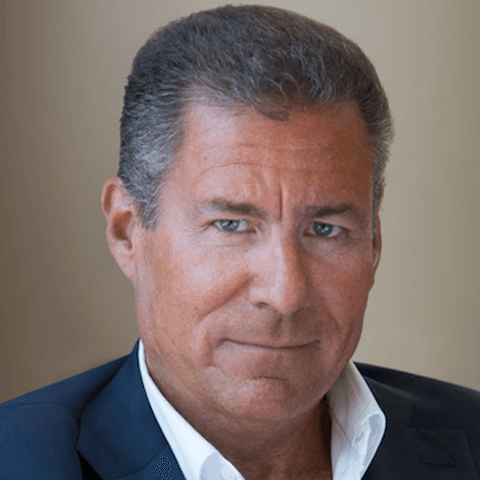
RICHARD PLEPLER
Creative Director
Richard L. Plepler was "executive vice president for Home Box Office. Home Box Office, Inc., is the premium television-programming subsidiary of Time Warner Inc., providing two 24-hour premium television services, HBO and Cinemax. Together, both networks reach approximately 40 million subscribers in the United States via cable and satellite delivery. Home Box Office's international joint ventures bring HBO branded services to more than 50 countries around the globe.
"Plepler serves on the boards of Phoenix House, the nation’s largest drug treatment center, New York Outward Bound and the Nixon Center, a foreign policy think tank based in Washington D.C. He is a member of the Board of Trustees of The Washington Institute for Near East Policy and is a member of the Council on Foreign Relations, where he serves on the Chairman’s Advisory Council. He is on the Corporate Advisory Board of the Global Business Coalition on HIV/AIDS, on the National Advisory Board of the W.E.B. DuBois Institute for African and African American Research at Harvard University, and is a member of the Dean’s Council of the Kennedy School of Government at Harvard." [1]
In 2007 Time Warner named Plepler a co-president of HBO. "Plepler who joined HBO in 1992, was named executive VP of HBO, charged with creative aspects of the company, in 2002." [2]
Advisory Committee, FilmAid International
Planning Committee, International Freedom Center
Trustee, Asia Society [3]
Advisory Board, Women's Voices. Women Vote [4]
National Advisory Board, W.E.B. Du Bois Institute [5]
Advisory Board, Global Business Coalition [6]
Advisory Board, Creative Coalition [7]
Time Warner CEO and CNI Director Jeffrey Bewkes was Plepler's boss.
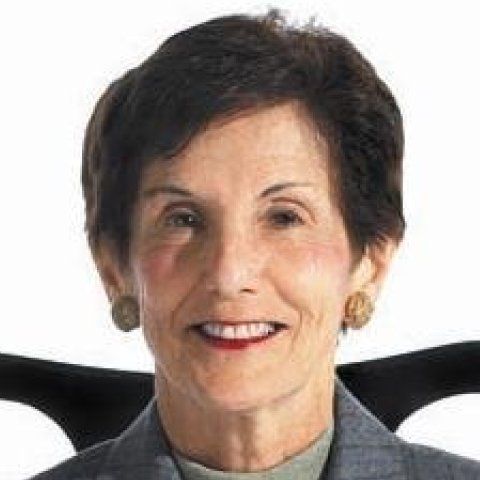
RITA HAUSER
Creative Director
Rita E. Hauser is an international lawyer, peace activist[1], and President of The Hauser Foundation, Inc..
On October 5, 2001, Rita E. Hauser was appointed by President George Walker Bush to the President's Foreign Intelligence Advisory Board.
Hauser and her husband Gustave M. Hauser "created the Hauser Center for Nonprofit Organizations at the Kennedy School of Government. The Center has been a model for other universities. Her desire to encourage women to play leadership roles in philanthropy led her to create the Women's Leadership Challenge Fund, which reached out to more than 200 women across the University. Nearly all of these women continue to serve Harvard in substantial ways."[2]
At Harvard, Hauser is "National Campaign co-chair of the University Campaign and current member of the Executive Committee of the Committee on University Resources, ... also vice-chair of the Dean's Advisory Board at the Law School, a member of the Visiting Committee of the Kennedy School of Government, trustee of the Harvard Law School Club of New York City, and a former member of the Board of Advisers of the Middle East Institute."[3]
Affiliations
Trustee, Forum for International Policy
Chairman, International Peace Academy
Committee Member, The American Society of International Law Second Century Campaign
Director, Atlantic Council of the United States[4]
Director, Council on Foreign Relations
Director, Americas Society
Director, Global Humanitarian Forum [1]
Director, Lincoln Center [2]
Former Director, Rand Corporation
Director, Nixon Center
Director, American Ditchley Foundation
Governor, Ditchley Foundation [3]
Director, Human Rights Watch[5]; Member, Human Rights Watch Middle East Advisory Committee
Advisory Council, Lowy Institute, Australian Think Tank
Advisory Board, Center for Middle East Public Policy
Advisory Council (Domestic), Freedom House
Advisory Board, Partnership for a Secure America
Advisory Board, Middle East Institute-Columbia University [4]
Advisory Board, University of the Middle East Project [5]
Advisory Council, Women's Foreign Policy Group
Advisory Council (National), U.S. Interreligious Committee for Peace in the Middle East
Task Force Member, Century Foundation Twentieth Century Fund Task Force on the Future of U.S. Intelligence[6]
Committee on the Present Danger
Sponsor (1994), The New Middle East Magazine[7]
Former Member (Approx. 1980), President's Board for International Broadcasting
American Jewish Committee on Oral History Collection, Dorot Jewish Division, Interview Tapes with Rita E. Hauser in New York Public Library.
The New York Review: Rita E. Hauser: ISRAEL AND THE PALESTINIANS (August 18, 1988).
Executive Council, American Society of International Law
Chair, International Peace Academy [6]
International Advisory Board (Cochair), International Crisis Group [7]
Former Board member, Center for Law and Social Policy
In 1987, Thomas J. Watson, Jr. and Helen W. Buckner gave a $2 millon grant to COFR. Xerox Corp gave $750,000 in honor of its retiring chairman, C. Peter McColough, who was treasurer of COFR for nine years. Rita Hauser made a $300,000 grant for a studies program on regional security issues.
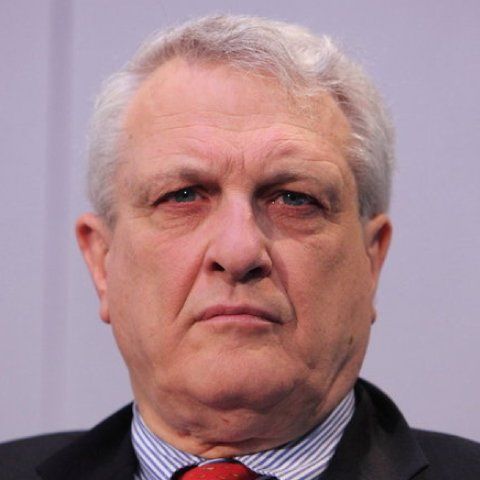
JOSEF JOFFE
Creative Director
(born March 15, 1944) is publisher-editor of Die Zeit, a weekly German newspaper. His second career has been in academia. Appointed Senior Fellow of Stanford's Freeman Spogli Institute for International Studies in 2007 (a faculty position), he is also the Marc and Anita Abramowitz Fellow in International Relations at the Hoover Institution and a courtesy professor of political science at Stanford University. Since 1999, he has been an associate of the Olin Institute for Strategic Studies at Harvard University.
Joffe was born into a Jewish family[1] in Łódź, Poland[2][3] and grew up in West Berlin, where he attended elementary school and gymnasium. He then came to the United States in 1961 as an exchange student, attending East Grand Rapids High School in Grand Rapids, Michigan. He attended Swarthmore College, graduating in 1965, obtained a postgraduate Certificate of Advanced European Studies from the College of Europe in 1966 and an M.A. from Johns Hopkins University's School of Advanced International Studies. He received a Ph.D in government from Harvard University in 1975.
In 1976 Joffe started his career with Die Zeit as a political writer and grew into managing the Zeit Dossier department, an important and often lengthy part of this newspaper which elaborates a single topic on several pages.
From 1982 to 1984 he was a professorial lecturer at Johns Hopkins University's Paul H. Nitze School of Advanced International Studies, and from 1985 to 2000 he was columnist and editorial page editor for Süddeutsche Zeitung. In 1990 and 1991 he taught at Harvard University, in 1998 he was a visiting lecturer at Princeton University's Woodrow Wilson School of Public and International Affairs, and in 2002 he was a visiting lecturer at Dartmouth College. He has also taught at the University of Munich and the Salzburg Seminar.
In 2005, Joffe founded, together with Zbigniew Brzezinski, Eliot Cohen and Francis Fukuyama, The American Interest, a magazine where both American and international authors think and argue about the United States and its role in the world. Joffe's essays and reviews have appeared in a wide number of publications including Commentary, The New Republic, The New York Review of Books, The New York Times Magazine, Prospect, The European Journal of International Affairs, The Times Literary Supplement, and The Weekly Standard. His scholarly work has appeared in many books and in journals, including Foreign Affairs, Foreign Policy, International Security, The National Interest and The American Interest.
Topics and standpoints
International politics in relation with Germany's position in the world has been a preferred subject for Joffe.
Joffe's 1984 article in Foreign Policy, entitled "Europe's American Pacifier,"[4] is the source of the common international relations term of art "the American pacifier." The piece presents the argument that the preponderant power of the United States (in this case, projected into Europe) acts as a pacifying force in the region, preventing the region's multipolarity from leading to conflict.
Joffe is known for his global warming scepticism. He has described Al Gore as the "priest" of a (climate related) "secular religion".[5
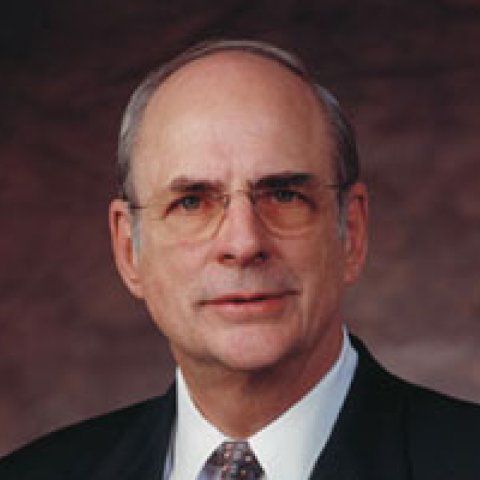
MARIN J. STRMECKI
Dr. Marin Strmecki "is Senior Vice President and Director of Programs of the Smith Richardson Foundation in Westport, Connecticut. The Foundation supports a public policy research and writing, and operates one of the countrys largest grant programs on national security and foreign policy issues. Before joining the Foundation in 1994, Mr. Strmecki served as a professional staff member of the Senate Select Committee on Intelligence and the Senate Foreign Relations Committee from 1990 to 1991, a member of the Policy Planning Staff at the Department of Defense in 1992, and a legislative assistant to Senator Orrin Hatch from 1993 to 1994. He also worked as a Research Associate and Fellow in International Studies at the Center for Strategic and International Studies from 1985 to 1990, where he followed U.S.-Soviet issues and provided research and editorial assistance to Dr. Zbigniew Brzezinski. In addition, Mr. Strmecki served for 16 years from 1978 to 1994 as a foreign policy assistant to Richard Nixon, assisting the former president with the research and writing of seven books on foreign policy and politics and other projects. He received his B.A. from Harvard University, M.A. in International Affairs from the Columbia University School of International and Public Affairs, Ph.D. in government from Georgetown University, and J.D. from Yale Law School." [1]
He is also a member of the advisory council of the Nixon Center and a member of the Aspen Strategy Group.
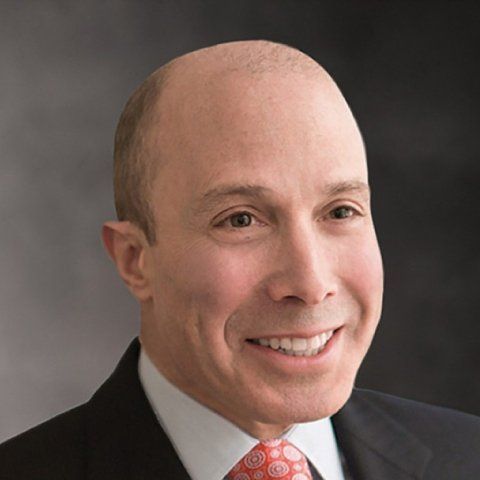
EVAN G. GREENBERG
Creative Director
Evan Greenberg (was born in 1955) is an American business executive. He is the President and Chief Executive Officer (CEO) of the Zurich-based insurance company Chubb Limited (formerly ACE Limited).[1] He also serves as Chairman Emeritus of the US-ASEAN Business Council.[2]
Greenberg is the son of Corinne Phyllis Zuckerman and Maurice R. Greenberg the former chairman and CEO of American International Group (AIG). He is also the younger brother of the former CEO of Marsh & McLennan, Jeffrey W. Greenberg.
Evan Greenberg attended New York University and College of Insurance but did not graduate from either.
Greenberg joined AIG in 1975 and worked under his father for 25 years. He held a number of senior management positions, including president and CEO of AIU Holdings, AIG’s foreign insurance organization, as well as CEO of AIG Far East, where he was based in Japan and Korea. Between 1997 and 2000 he served as AIG’s president and chief operating officer.[3] He was considered to be the heir apparent to take over as CEO, but left the company in 2000 and joined ACE in November 2001 as its vice chairman. He became the CEO of ACE in 2004. In the 2008 financial crisis, he was among the CEOs refusing to take part in a tax-payer funded bailout.[4][5][6][7][8][9][10] In February 2011, it was announced that Greenberg was named as a director of The Coca-Cola Company.[11]
Greenberg also serves on the board of the National Committee on United States-China Relations, as well as the US China Business Council. He is a member of the Council on Foreign Relations, the Center for the National Interest, as well as the Business Roundtable. Additionally, he is an overseer of the International Rescue Committee.[3]
In October 2004, New York's crusading district attorney, Eliot Spitzer, filed suit against Marsh & McLennan, accusing the company of having, for years, colluded with big insurance companies to "cheat customers in an elaborate charade of price fixing and bid rigging".
The three insurers he named were the giants American International Group, Zurich America Insurance Company and Ace Ltd. Adding spice to the story was the relationship between them: AIG was headed by the 79-year-old insurance industry legend Maurice "Hank" Greenberg; his son Jeffrey ran Marsh & McLennan, and; another son, Evan, was boss of Ace.
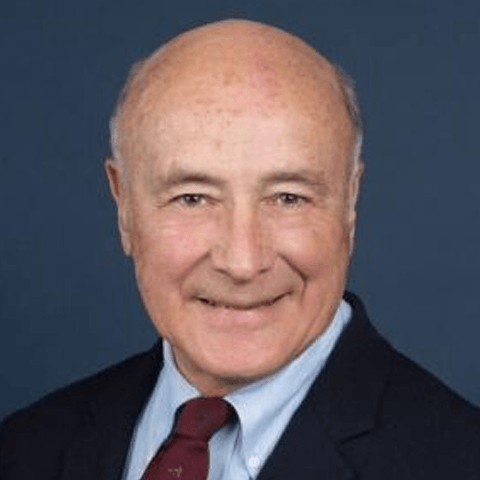
JOSEPH SAMUEL NYE JR.
Creative Director
(born 1937) is the founder, along with Robert Keohane, of the international relations theory (neoliberalism) developed in their 1977 book Power and Interdependence. Together with Keohane, he developed the concepts of asymmetrical interdependence and complex interdependence. They also explored transnational relations and world politics in an edited volume in the 1970s.
Nye is currently University Distinguished Service Professor at the Kennedy School of Government at Harvard University, and previously served as dean there. He graduated Summa Cum Laude from Princeton University and, after studying Philosophy, Politics and Economics as a Rhodes Scholar at Exeter College, Oxford, obtained his Ph.D. from Harvard. He attended Morristown Prep (now the Morristown-Beard School) in Morristown, NJ and graduated in 1954.
Nye has published many works in recent years, the most recent:
Understanding International Conflicts, 6th ed., 2006
The Power Game: A Washington Novel, 2004
Soft Power: The Means to Success in World Politics, 2004
The Paradox of American Power, 2002.
Nye first coined the term soft power in the late 1980s; it first came into widespread usage following a piece written by Nye in Foreign Policy in the early 1990s.
Nye also served as Deputy to the Undersecretary of State in the Carter Administration; Assistant Secretary of Defense for International Security Affairs in the Clinton Administration, and was considered by many to be the preferred choice for National Security Advisor in the 2004 presidential campaign of John Kerry. He is widely recognized as one of the foremost liberal thinkers on foreign policy, and is seen by some as the counter to renowned Harvard conservative Samuel P. Huntington.
In 2005 Nye was voted one of the ten most influential scholars of international relations[1].
He has been awarded the Woodrow Wilson Prize by Princeton University and the Humphrey Prize by the American Political Science Association. In 2005 he was awarded the Honorary Patronage of the University Philosophical Society of Trinity College Dublin.
Affiliations
Cambridge Review of International Affairs – International Editorial Board
Center for Strategic and International Studies (CSIS) – board member
Council on Foreign Relations – Board member
Foreign Policy – editorial board
Trilateral Commission – vice chairman of the North American branch
USC Center on Public Diplomacy – Advisory board
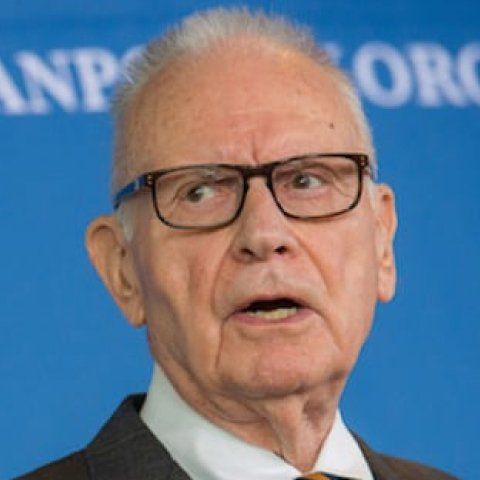
LEE H. HAMILTON
Creative Director
Director of the Woodrow Wilson International Center for Scholars.
He is also on the board of counselors for the Arabic media group Layalina Productions, is a Trustee of the Council for Excellence in Government, and is a director of the National Endowment for Democracy and InterAction.
Hamilton is a Commissioner on the U.S. Commission on National Security/21st Century / Hart-Rudman Commission and Vice Chair of the National Commission on Terrorist Attacks Upon the United States (also known as the 9-11 Commission). On June 11, 2002, Hamilton was appointed to President George Walker Bush's Homeland Security Advisory Council.[2]
Hamilton is Director, The Center of Congress at Indiana University (1999-present); served thirty-four years as the United States Representative from Ninth District, Indiana (1965 - 1999); was the Ranking Democratic Member, Committee on International Relations, Member and Former Chairman, Joint Economic Committee, and was the Former Chairman of the Committee on Foreign Affairs where he was the ranking Democrat for ten years and was Committee Chairman during the 103rd Congress; served on the Joint Committee on the Organization of Congress October Surprise Task Force and Select Committee to Investigate Covert Arms Transactions with Iran, and a member of the Permanent Select Committee on Intelligence.
Hamilton received a Bachelor of Arts, DePauw University and Goethe University, Frankfurt Germany; and a Graduate, Indiana University School of Law. He is also affiliated with The Alfalfa Club.
Founding Cochair, Partnership to Cut Hunger and Poverty in Africa [1]
Advisory Board, American Institutions of Democracy [2]
Advisory Board, Partnership for a Secure America
Advisory Board, Terror Free Tomorrow
Advisory Council, International Center for Religion and Diplomacy [3]
Leadership Council, Initiative for Global Development [4]
Received Baha'i Humanitarian Award, 1995 [5]
Honorary Member, Academy of Political Science [6]
Honorary Chair, World Justice Project [7]
Former Director, Population Action International
Director, Global Green USA [8]
International Board, U.S./Middle East Project [9]
Patron, Global Centre for the Responsibility to Protect [10]
Council Member, US Asia Pacific Council [11]
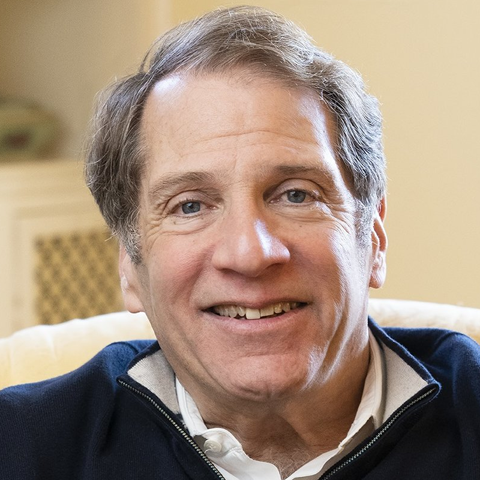
PETER KOVLER
Peter Kovler is on the Advisory Council of the Nixon Center, is a director of the Franklin and Eleanor Roosevelt Institute, and is on the NDI Board of Directors & Senior Advisory Committee (2004), and is a member of the Balkan Action Committee.
Chair, Center for National Policy
He has signed a letter from the Project for a New American Century in 1998. [1]
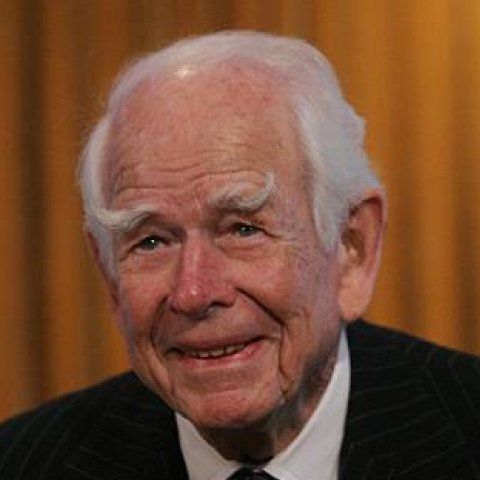
DONALD KENDALL
Donald Kendall "is the co-founder of PepsiCo, serving as its Chief Executive Officer for 21 years before retiring in May 1986. Mr. Kendall served as Chairman of the Board’s Executive Committee from 1986 until 1991.
He is a former CEO of Pepsi Cola (which merged with Herman Lay's Frito Lay, Inc. to become PepsiCo in 1965) and served as CEO of PepsiCo from 1971 to 1986. "After serving in World War II as a naval aviator, Kendall began his career at Pepsi-Cola Company as a sales representative. He held the positions of vice president in charge of marketing for the United States and president of the company's overseas operations before being named president and CEO in 1963. In 1965, Kendall engineered the merger of Pepsi-Cola Company and Frito-Lay, which created PepsiCo. He was then named president and CEO of the new company. Kendall was elected chairman and CEO of PepsiCo in 1971, a position he held until his retirement in 1986. From 1986 to 1991, he served as chairman of the board of PepsiCo's executive committee.
"Throughout his career, Mr. Kendall has been very active in a variety of key cultural, economic and political organizations, both domestically and internationally. Major appointments include: National Alliance of Businessmen (Chairman, 1969; director for eight years); US-USSR Trade and Economic Council (first US Co-Chairman, 1973-1977), Emergency Committee for American Trade (Chairman, 1969-1976), the Chamber of Commerce of the United States (Chairman of the Board, 1981-1982), National Center for Resource Recovery, Inc. (Chairman from 1970 to 1976), Grocery Manufacturers of America (Chairman from 1969-1971) and the American Ballet Theatre Foundation (Chairman of the Board, 1977-1983).
"Mr. Kendall received his undergraduate education at Western Kentucky State College and has earned a number of honorary doctorates in law and humane letters from schools throughout the country." [1]
"Don has an entrepreneurial business background, with a passion for creating and leading startups as well as turnaround companies operating in new, or rapidly evolving market spaces. In 1992, Don left his management consulting practice at McKinsey & Company to open one of the first Pizza Hut restaurants in the Republic of Poland. The company he co-founded, American Restaurants (“AmRest”), today operates nearly 500 restaurants in seven Central and East European markets. With over $1 billion in revenues and over 20,000 employees, Amrest is the largest independent restaurant company in the region.
"In 1997, Don co-founded More.com, an early pioneer in the e-commerce field. While Don was CEO of more.com, he was a founding board member of hotwire.com, a leading e-commerce travel site (now part of Expedia), and also helped his wife start JustGive.org, an internet-based 501(c)3 “giving portal” that has since raised over $100 million for more than 50,000 charities.
"In 2003, Don purchased High Country Passage, a leading operator of high-quality international group tours for top educational institutions such as Stanford, Harvard and Yale University, as well as the Smithsonian Institution and the National Geographic Society. Under Don’s leadership, the business doubled its revenues and launched the “World Leaders Symposium,” a unique and groundbreaking series of large (e.g., 250+ participants), ultra-luxury, intensely educational tours, each of which explored a notable current affairs topic with keynote, “off the record” presentations by leading statesmen, including George H.W. Bush, Mikhail Gorbachev, and James A. Baker, III.
"More recently, Don has devoted a substantial portion of his time to non profit activities as well as investments. He serves on the boards of the East-West Institute, a non-profit “think-and-do tank” that devises innovative solutions to pressing global security concerns, The Philanthropy Workshop West, a network of philanthropists formed for the purpose of educating and sharing best practices within a close-knit network of donors who share a commitment toward strategic giving, and Andover Breadloaf, an educational outreach program of Phillips Andover Academy focused on the teaching of reading and writing in urban public schools. From 2000-2010, Don was also a member of the Young President's Organization (YPO). Don is a graduate of Stanford University. Don, his wife and three children reside in Weston, CT." [2]
International Advisory Board, International Economic Alliance [3]
International Council, Belfer Center for Science and International Affairs
Advisory Council, Nixon Center
Emeriti Chair, East-West Institute
Director, Coalition for a Secure Driver's License
Director, Jane Goodall Institute
Former member, Business Group for Latin America
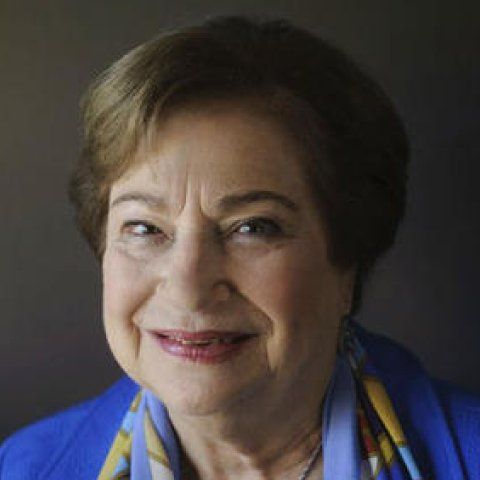
ANGELA STENT
Angela E. Stent is a foreign policy expert specializing in US and European relations with Russia and Russian foreign policy.
She is Professor of Government and Foreign Service at Georgetown University, where she is director of the Centre for Eurasian, Russian and East European Studies.
At the Brookings Institution, she co-chairs the Hewitt Forum on Post-Soviet Affairs. From 1999 to 2001, she served in the Office of Policy Planning in both the Clinton and Bush Administrations, where she was responsible for Russia and Eastern Europe. From 2004 to 2006, she was the National Intelligence Officer for Russia and Eurasia at the National Intelligence Council. From 2008 to 2012, she was a member of Supreme Allied Commander in Europe advisory panel.[5]
The journal is published by Routledge.
Panellist for the Atlantic Partnership.
Writings
Her first book, published in 1982 by Cambridge University Press, was From Embargo to Ostpolitik: the Political Economy of West German-Soviet Relations.[6] While researching this book, Stent was mugged in Moscow, according to an article she wrote in The New York Times. She reported that the policeman investigating the case maintained it could not have happened, declaring, "We have no crime in the U.S.S.R."[7] Russia and Germany Reborn: Unification, the Soviet Collapse, and the New Europe[8] was her second book, published by Princeton University Press in 1999. In it, she analyzed and narrated the tumultuous events that led to the end of communism in Eastern Europe, the collapse of the Soviet Union, the emergence of modern Russia, and the reunification of West and East Germany.[9] Mikhail Gorbachev, former Communist Party First Secretary and then President of the Soviet Union, was among the interviews for the book. When Stent asked Gorbachev what world leader he most admired, his answer was "Ronald Reagan was the greatest western statesman with whom I dealt. He was an intelligent and astute politician who had vision and imagination."[10]
The Limits of Partnership
External video
After Words interview with Stent on The Limits of Partnership, February 1, 2014, C-SPAN
Stent's 2014 book, The Limits of Partnership: US-Russian Relations in the Twenty-First Century,[11] examines the difficulties for the United States in establishing a productive relationship with post-Soviet Russia. Stent argues that four US presidents have pursued their own "resets" with Russia, each of which ended in disappointment. For her research for this book, Stent was able to draw on a decade-worth of meetings that Vladimir Putin has held with Russia experts. At one, Stent asked President Putin whether Russia was an energy superpower. He said that "superpower" was "a word we used during the Cold War. I have never referred to Russia as an energy superpower . But we do have greater possibilities than almost any other country in the world. If we put together Russia's energy potential in all areas, oil, gas and nuclear, our country is unquestionably the leader."[12]
In 2014, Stent was awarded the Douglas Dillon Award for excellent authorship on topics of American diplomacy by The American Academy of Diplomacy.[13]
Putin's World
After Words interview with Stent on Putin's World, March 16, 2019, C-SPAN
Stent's new book, Putin's World: Russia Against the West and with the Rest, was published in February 2019.[14][15] This book assesses Putin’s view of Russia’s place in the world through examining Russia’s ongoing relationships with allies and adversaries, specifically narrowing in on Russia’s downward spiral with NATO, Europe, and the United States and its ties to China, Japan, and the Middle East, in addition to its neighbors like the Ukraine.[16][17] Stent argues that "as the Trump team accelerates the U.S. retreat from the Middle East, Mr. Putin has been quick to spot and take advantage of openings, and he operates without many of the constraints of his Soviet predecessors. The U.S. will have to get used to dealing with a savvy rival for influence in the Middle East."[18] This book considers how Russia has no real allies and speculates what may occur to the country and its geopolitical identity upon the ending of Putin’s term in 2024 and how the West should respond to Russia moving forward.[19]
Other activities
Stent is on the advisory board of Women in International Security,[20][21] an organization dedicated to promoting women's’ careers in the national security area. Stent played a key role in WIIS's conferences in Tallinn and Prague.[22] In 2008 she received a Fulbright Fellowship[23] to teach at the Moscow State Institute of International Relations (MGIMO) and was a George H.W. Bush-Axel Springer Berlin Prize Fellow at the American Academy in Berlin. She co-chaired the Carnegie Corporation's Working Group on U.S-Russian Relations from 2008 to 2012 and was a Co-Convenor of the US-Russian "Second Track" Discussions. She served as a Trustee of the Eurasia Foundation.[24] She is a contributing editor to Survival: Global Politics and Strategy[25] and has written numerous articles for academic and general publications such as The Wall Street Journal, The Washington Post, and The New York Times. She has also appeared on The PBS News Hour, CNN, BBC, as well as other major U.S and German networks.
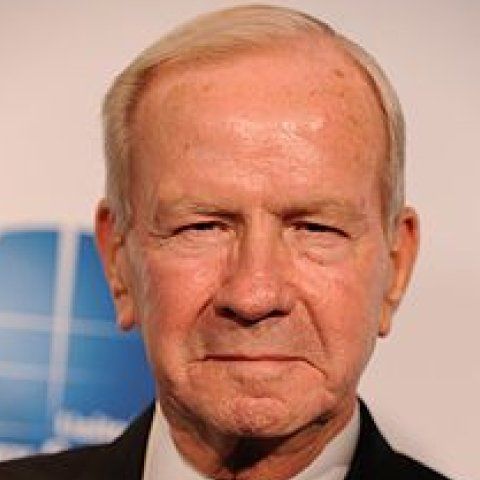
ROBERT MCFARLANE
FORMER NATIONAL SECURITY ADVISER
In 1979, he was appointed by U.S. Senator John Tower to the staff of the
Senate Armed Services Committee, where he was responsible for staffing
Senate consideration of the SALT II Treaty from 1979 to 1981.
He also authored much of Ronald Reagan's foreign policy platform during
the 1980 presidential campaign.
Following that assignment, he returned to the White House and was
appointed President Reagan's National Security Adviser.
He was forced to resign in disgrace as he failed to cover up his role in the Iran-Contra scandal. Feeling sorry for himself that he got caught assisting illegal arm sales, McFarlane attempted to commit suicide. He also failed at that.

